#jujutsu kaisen meta
Text
in the season two op, we see gojo with an umbrella, rushing over to meet geto. despite the fact that he literally doesn't need one, gojo very clearly brings the umbrella for geto; this is made obvious because this scene is intercut with shots of geto impatiently waiting in the rain and holding a bag over his head.
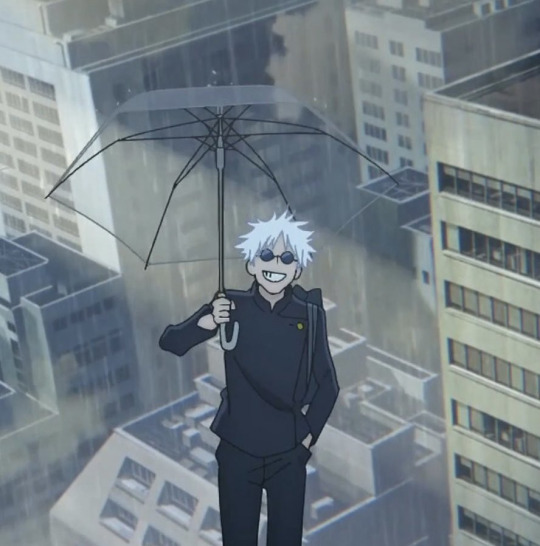
in the season one op, he's once again walking through the rain, but this time he doesn't have an umbrella.

the absence of an umbrella in the rain is stark in comparison to the season 2 op, where the umbrella is the focal point of gojo's stroll through the rain. in season 1, literally everyone else in the opening has an umbrella, making the absence of gojo's even more noticeable.
in both openings, he's walking in the rain. but only in one of them does he have an umbrella, despite the fact that he doesn't need it in either of them.
if you notice something is missing from a room, it's still there, isn't it?
#not to mention gojo is going to geto's FUNERAL in the second one#my jjk meta#jjk meta#jujutsu kaisen#satosugu#satosugu angst#satosugu analysis#jjk#gojo analysis#jujutsu kaisen meta#jujutsu kaisen analysis#gojo x geto#gojo satoru#geto suguru#stsg#gojo#geto#jujutsu kaisen angst#gojo angst#geto angst#geto and gojo#satoru x suguru#satosugu brainrot#stsg angst#stsg brainrot#gojo brainrot#jjk geto#jjk gojo#jujutsu kaisen season 2
2K notes
·
View notes
Text
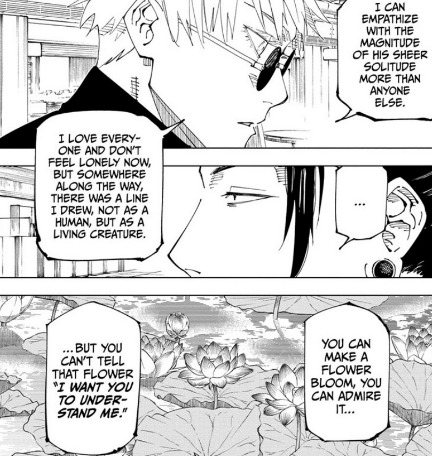
I WANT YOU TO UNDERSTAND ME
It's not surprising to me that Gojo's dying monologue he spent more time talking about his fight with Sukuna than any of his students. Gojo's priority from the beginning isn't to save Megumi but to fight all-out against a strong opponent, the line is: ""The Absolute Strong. The loneliness that follows. The one who will teach you about love is..."
This fight is basically the climax of Gojo's identity crisis which has been a long running issue for him throughout the manga. He's simultaneously a self-confident individualist with an overpowering sense of "ego" and a person with little idea of who he is outside of the role in society that was given to him. Gojo went into the fight looking for someone capable of understanding him, the fight is about Gojo seeking an answer to who he is, that's why he fights and that's why he loses.
Gojo is Not Normal
Nanami's statement is misinterpreted I think.
"You live for Jujutsu. You don't wield it to protect something. You use it solely for the sake of satisfying yourself."
A lot of people took this to mean that Goo didn't care about anyone but himself, even though Gojo directly contradicts this earlier.
"I love everyone and don't feel lonely snow, but somewhere along the way there was a line I drew, not as a human but as a living creature."
He states he does love other people, if only from afar, he just doesn't understand them. Gojo can't make other people his reason to fight, because he only understands himself. He only sees himself. He can only fight for what's inside himself.
"You can make a flower bloom, you can admire it, but you can't tell that flower 'I want you to understand me'
Gojo's students are the flowers. Itadori, Fushiguro and Nobara are all named after flowers. He's raising them up to be as strong as him, he's fond of them, but he doesn't think they relate to him because he exists in a different category of other people.
A lot of people want Gojo to be a more traditional caring mentor figure like Kakashi or Aizawa they're missing what's really interesting about his character. When Nanami says "Gojo only cares about being the strongest" it's true because his entire character is written around the statement "I am the strongest". He is conceptually about what it is like to be the strongest man in existence. That is the character concept, and Gojo's entire identity crisis revolves around that he's built up his personality around being the strongest at Jujutsu and nothing else.

Gojo can only fight for his own ego and self satisfaction as Nanami says, because he has nothing else, he has no identity outside of that.
However, before I get into why I want to point out that Gojo is not normal. It's not because someone on his power level is fundamentally incapable of relating to other people, but Gojo himself...is not right in the head. He's making an active decision to choose not to empathize with people whatsoever, it's not just that it's hard to understand him, it's that they can't understand him.
Gojo talks about his students like they're members of another species. They're flowers. They can't relate to him on a human level because he's something other than human. A friend had an interesting reading on why specifically it's flowers Gojo chose for his metaphor.

Plants are less sentient than insects, they don't contemplate anything they are just taken care of by their gardener and grow towards the sun. That's how differently he sees himself from others.
I wanted to include this take from @kaibutsushidousha as well.

Gojo's not from the planet mars he's a human who has human emotions and human psychology like everyone else, so that's simply not true, but Gojo believes it is and that belief influences how he interacts with everyone.
Gojo can't see himself reflected back in other people for some reasons that aren't his fault and some reasons that are. Gojo has been from birth, treated as different from everyone around him, not for anything he really did but because he was born with a really strong jujutsu ability. He's a literal chosen one. He always seen as the six eyes user, the strongest, before he was seen as a person. His entire life has been defined entirely by the abilities he was born with, he was born to be a Jujutsu Sorcerer so of course that's what he builds his entire identity around.
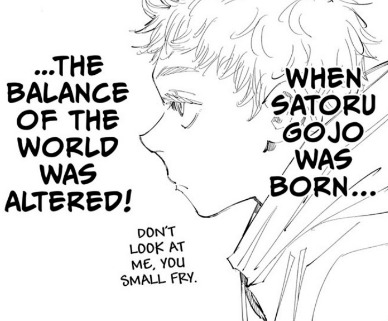
Not only is he told that he's categorically different from others, but he also believes it. We know little about his early childhood besides Gege's statements that he was spoiled, but we do see later on in childhood there are people who are willing to treat Gojo normally despite the position he has as the strongest. This is when it starts being Gojo's fault that he continues to see himself as different from other people.
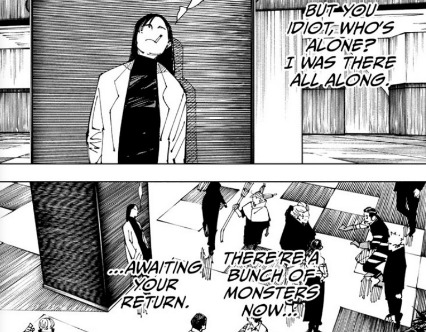
Shoko, Gojo's closest confidante in his schooldays after Geto's days basically tells him that. She's been with him for years and yet he still has the audacity to act like he's all alone in the world. Even when people try to treat Gojo normally and relate to him on a personal level, Gojo actively ignores their presence in his life like he did Shoko because he's not only been told he's different from other people because he's stronger, but he believes it and he's built his entire world view around it.
This is why the only person that Gojo ever let in was Geto, because Gojo believed that Geto was someone who could stand on top with others. THe only person who could believe the strongest, or teach them about love was someone equally as strong. Gojo just happening to meet another sorcerer who was special class as a teenager not only allowed him to have a friend, but fit perfectly into his narrative that he was separate from others and only someone as strong as him could understand. There are people like Shoko and Nanami who treat Gojo normally despite the fact he's the strongest, but Geto was the only one Gojo met in because he met the qualifiaction of being someone equally as strong.
This isn't really the case for Geto. Geto comes to see weak people as inferior yes in the sense he sees Non-Jujutsu Sorcerers as inferior, but Geto is capable of making connections to other Jujutsu Sorcerer. Geto has his family, he has Nanako and Mimiko and the rest of his followers who he all cares about equally. Geto met all of them and chose to relate to them, he even tells Gojo after killing his biological parents that he's choosing who his real family is now.
"It wouldn't be fair if I made an exception for my parents, now would it? Besides my family now consists of more than just them."
Geto demonstrates someone as powerful as Geto can make a choice to relate to other people. It's shown in the way that Geto treats Nanako and Mimiko, he is their father and he raised them as his daughters. Compared to how Megumi is just a student to Gojo. Gojo's only invested in making Megumi into a strong Jujutsu Sorcerer, because Gojo doesn't fathom connecting to someone weaker than him. He's only their to raise up a strong sorcerer, whereas Geto who's capable of connecting with people in other ways is raising up Nanako and Mimiko and they're connected as parent and child.
Geto and Gojo are similiar in a lot of ways, same level of strength comapred to the rest of humanity, same god complex (and yes it is a god coplex, there's a reason the two people Gojo relates to are Geto who has constant religious imagery associated with him and Sukuna who's literally satan) and yet Geto shows someone roughly Gojo's power level can make connections to others Gojo just chooses not to.
This is where I'm stealing from a friend's post a bit. @theanimepsychologist points out that Geto notices the beginnings of Gojo's identity complex soon after it started with Toji.
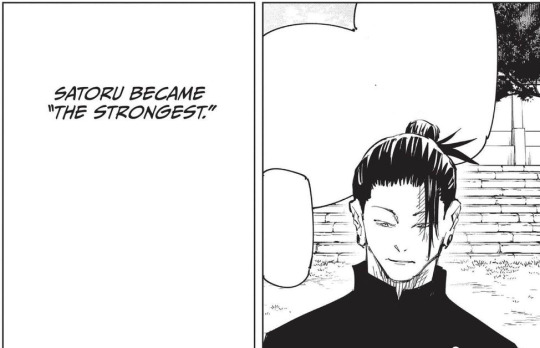
I always thought of the panel above as Geto being jealous of Gojo surpassing him in strength but, in retrospect, I think Geto’s disappointment had more to do with Gojo’s sense of self over-identifying with the title “the strongest” and how that made him harder to relate to, which is one of the main themes in this chapter. I’ll come back to this in a sec.
But first…
Quick depth psych segway. I think I’ve said this before, but it bears repeating again that an overwhelming sense of self is all ego. There’s nothing wrong with ego per se.
The problem is that an over-identification with ego means inherent separateness because, as an organ of the psyche, the ego sense of self is what gives us a separate identity from the collective.
Geto notices that Gojo is drawing a line between himself and other people, and pulling away because of that because people in the second category of weak can't possibly understand the strong and he's reacting to it. Geto is also the only person to underline to Gojo himself that he's unsure about his own identity.

Gojo knows he's the strongest, but he doesn't know anything about himself besides that, or even what being the strongest entails in his relation to other people. He's never constructed an identity outside of it in part because he's never had to, nobody has ever challenged him for his title as the strongest, and he also fits jujutsu society's mould perfectly. He's perfect at what he does, why would he need to change? Why would a person who reached enlightenment at seventeen need to reflect upon himself or figure out who he is? You can't really become more enlightened.
The other reason he's never constructed an identity is he's never interacted with anyone on equal terms. Metaphorically Gojo exists in a vacuum of human interaction. How appropriate is it in a way that he was sealed in a box where time didn't move completely alone for who knows how long, because that's kind of just how Gojo sees himself in relation to the rest of the world.
As Psycho points out an unregulated ego results in an inherent separateness from the collective. People don't exist in a vacuum however. We wouldn't know who we are if we were entirely alone. We are defined just as much as ourselves, as we are by our interaction with others.
Ich and Du, translated as I and Thou is a book by philosopher Martin Buber. His two main porositions is that we may address existence in two ways:
The attitude of the "I" towards "it" towards an object that is separate in itself, which we either use or experience.
The attitude of "I" towards "Thou" in a relationship in which the other is not separated by discrete bounds.
I -> It is the world of sensations. If I am looking at a chair, I say "This is a chair. This chair is an eyesore." I am seeing the chair. I don't relate to the chair.
I -> Thou can be used to refer to a relationship between human beings. You don't experience the human being., you can only relate to them and what that relationship means to you. He goes on further to say that love requires a subject -> subject relationship. To love someone means you have to relate to them as if they are another being, you can't love an object.
He's a philosopher to put forward that it's human's connections with each other and their ability to relate to each other that brings meaning to life. Gojo in Buber's terms is only experiencing the world around him, not relating to it. How appropriate of someone with the six-eyes, an ability that gives him sight far better than anyone else to see himself as only an observer to the outside world, like a floating pair of eyes.
The choice that Gojo makes not to relate to other human beings on an equal level, not only isolates him, it affects his sense of self. People cannot exist within a background. Gojo's like a vampire who can't see his own reflection. ? It's all because of this caveat that Gojo himself has set up that no one can possibly relate to him unless they were equally as powerful as him that he can't see himself in others. He can't see himself in others, he can't find anyone to help him understand himself, and therefore his identity crisis goes unresolved.
Twitter user @ det_critics pointed this out that the question: "Take away his strength and what is he?" isn't one Gojo has an answer for, and one he's actively been running from.

As I said Gojo literally doesn't have a reflection, we see that in story when the prison realm opens its eye and it's just a void where Gojo's face is supposed to be. Gojo choosing not to think of himself as the strongest is also a choice not to think about who he'd be if he wasn't. A question he evades over and over again by telling himself that he can't be understood by people who are weak b/c he categorically exists on a different plane of reality.
When he does look for an answer it's telling just how not normal Gojo is in who he chooses to empathize with: which is Sukuna.
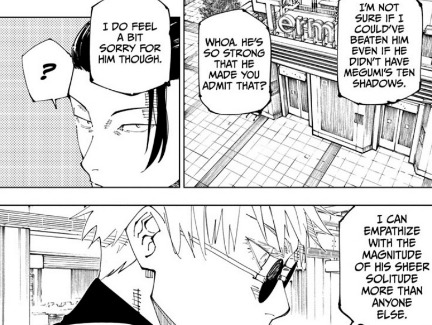
This is who Gojo as chosen to be the only other person besides Gojo he felt he could relate to. The same person who monologues about weak people like this.


The same person who monologues that weak people shouldn't even be alive, they should be culled. Sukuna sees weak people as insects. Gojo sees them as plants.
The first person that Gojo relates to as a subject rather than an object Geto is cut short, the next person he relates to as a subject is Sukuna of all people. He chooses to see himself in Sukuna, because Sukuna validates that incorrect idea Gojo has that someone as powerful as him could never possibly be understood by other people. After all, Sukuna the strongest sorcerer of all time isn't even really human anymore, he's a curse a calamity. For Gojo who doesn't see himself as relatable to other human beings this is validation of that mistaken notion.
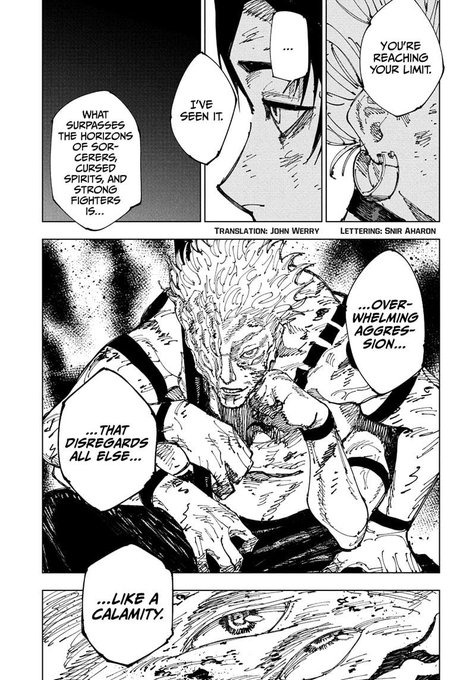
It's also telling of how much Gojo's own identity issues have warped him that he finds a curse personally relatable, and even pitiable because it's lonely. Sukuna, who's main problem is that he's bored because a life of killing people is unfulfilling and it's turned him into an adrenline junkie. This is who Gojo's personally chosen to relate to because they both only see the world in the category of "the strong" and "the weak."
Gojo's viewpoint of other people is mistaken for several reasons, but one interesting one was pointed out for me by Psycho. He refers to his students as flowers, but they're lotus flowers. Lotus flowers mean many things, but they're seen as symbols of purity because they rise up from the mud. Gojo is only looking at the flowers, not the mud they rise from .
"No mud, no lotus. The mud is what makes us who we are, and no one can 100% understand what wading through the mud feels like. I think people see oh shiny lotus, the outcome of wading through the mud but they overlook the self because we live in an outcome oriented society.
Gojo is someone who doesn't see the mud and therefore doesn't relate to the personal struggles of others. Which sabotages a lot of his personal relationships. Which like, to bring Megumi into this, Megumi is proof that Gojo IS NOT NORMAL.
Megumi is the kind of special genius that Gojo is, he's born with the strongest technique one capable of killing Gojo, but he doesn't become a special class at seventeen like Gojo, nor is he interested in doing that because Megumi is an entirely different person with differnt personal struggles than Gojo. He has all the raw potenital that Gojo does, but they have wildly different upbringings. Gojo was primed for success by being the spoiled child of his clan, while Megumi is an abandoned child. It proves again Gojo's maxim of people who have that much power are inhuman and don't follow human psychology is wrong because Megumi has all the potential to be as strong as Gojo, but he's just a normal kid. Megumi is still wading through the mud and Gojo doesn't see that.
GOJO IS NORMAL
Jujutsu Kaisen seems to be following Buber's logic on how identity is defined by the interactions we have with other people, because there was a period in Gojo's life where he did create an identity outside of being a sorcerer and that's when he was Geto's friend.

In the afterlife we even see him regressing to that previous state of being. There was a period for three years in his life that Gojo was something besides being the strongest, and that was when he was Geto's friend too. If Jujutsu Kaisen is about how identity and meaning are both constructed from the interactions we have with other people (subject -> subject) interactions then it's telling that Gojo reverts to his seventeen year old self because that was the first and only time in his life he was capable of relating to another person, and acted like a fully developed person outside of the role of sorcerer he was born to play.
If identities are constructed though that means they're not inherent. Gojo is not inherently the strongest, just as he's not inherently different from other people. This is different from what Gojo's been told his entire life. He was born the strongest. It's inherent to his identity, a fundamental part of who he is. Therefore people who are strong are inherently different from those who are weak, it's something internally different about them which makes it impossible for Gojo to comprehend the motivations of weak people.
Rather than just strong and weak being constructed categories. Gojo's the strongest at Jujutsu but if you took him outside of Jujutsu and asked him to work any other job he'd no longer be the strongest. He's only the strongest as long as he remains in his fish bowl that is Jujutsu Society. However, Gojo believes differently, he believes being the strongest is what he is, it's something inside of him, and something that makes him fundamentally different from others. This is the line that Gojo has been told due to being born with the six-eyes and this is what Gojo has bought.
This is also what his ability the limitless symbolizes, no one in this world can touch him or reach him, he exists somewhere else. However, the limitless can be breached and Gojo has been shown before there are others capable of touching him.


Toji is the first and only living human being to challenge him, until Sukuna comes along. However, Toji does arguably more in story than just give Gojo a good fight. Toji full on traumatized him, soemthing which Gojo refuses to acknowledge. Toji is the beginning of the end of Geto's friendship, the death of Amanai Riko sends Geto on a spiral for an entire years, and drives a wedge between Geto and Gojo's friendship when Geto self isolates and Gojo doesn't know what's wrong with his friend.
Gojo also experiences what it's like to be defeated for the first time in his life, and his response is to perfect the limitless so he runs it constantly all the time. Remember, before that he was exhausting it doing it for three days in a row, and when Geto told him to take a break Gojo reassured him he wasn't worried because he knew Geto had his back. Gojo was someone who could let down the limitless before that, but afterwards Gojo always insists on fighting alone with his shields up all the time. All to deny that feeling of vulnerability that Toji inflicted on him for the first time in his life, something he remembers years later, you know like trauma.
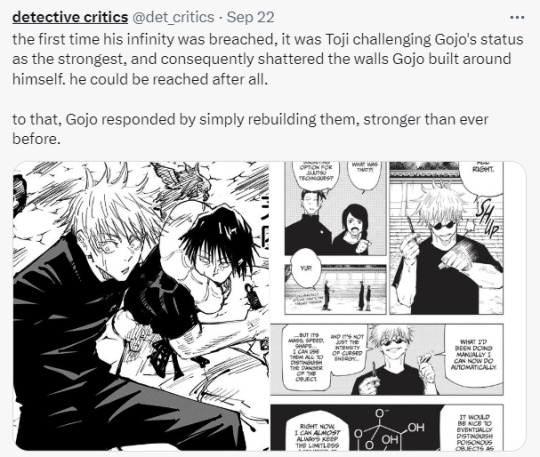
There are times when Gojo is reminded that it's possible he's the same as anyone else, he can experience human weakness. Geto's fall is another time, one post says it's particularly challenging for Gojo to comprehend why Geto would defect because he saw Gojo and himself as above others and therefore immune to human weakness.
gojou 100% has a god complex and thats why getous downfall hit him harder than anyone else. he saw himself and getou as above everyone else and exempt from ‘regular’ peoples flaws, he never thought either of them could be led astray and when getou finally snaps hes bewildered that something like that could ever happen to either of them. hes not just heartbroken over his best friend becoming an enemy, hes thrown for a loop because getou, the one person he thinks of as just as above everyone else and incapable of failing as he is, could ever do something wrong, could ever be wrong. hes finally put into a position where he has to face the fact that hes just as capable of screwing up as anyone else and he can’t make sense of it. gojous hesitance in killing getou isn’t just a byproduct of their friendship, it’s also him realizing that it could have easily been him on the other side of the conflict, which breaks the illusion of him being better than everyone for a second. and like that’s still not enough for him to reject this idea, personally i think that his comment about him and getou being 'the strongest’ in volume 0 is indicative of the fact that despite everything he still hasn’t grown out of this delusion.
Gojo has trauma, because he's a human being with human psychology. He makes mistakes, he has terrible past regrets like his friendship with Geto gone wrong, but he doesn't acknowledge those things because as stated above Gojo thinks he's immune to having regular people flaws. Gojo seeing himself in another category from regular human beings also allows himself to deny an vulnerability, because the strongest isn't supposed to have weaknesses. Seeing yourself as too distant to ever be touched by others also means they can never hurt you, emotionally or otherwise, an extreme form of the hedgehog's dilemna which is explored an Neon Gengesis Evangelion, an existentialist piece Gege takes obvious inspiration from.
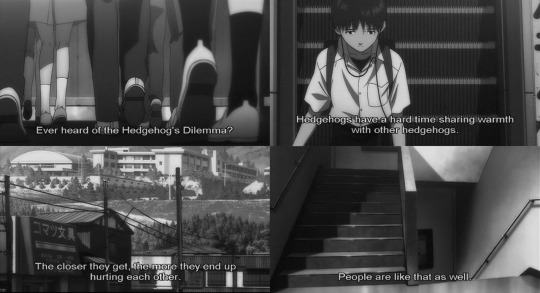
The fact that he avoids other human beings, not because he's fundamentally incapable of understanding them but because he's distancing himself from human feelings like loss, pain, suffering these weaknesses that are part of the human experience just proves he's the same as everyone else. If he wasn't capable of feeling those things he wouldn't avoid it, he wouldn't spend ten years mourning Suguru but not killing him directly until he was forced to on December 24th, he wouldn't be trapped by the box because seeing Geto alive made him have a three minute long trauma flashback.
Gojo is a normal human, with normal human emotions and human psychology, albeit twisted from the power he was born with and his unique viewpoint of the world but he doesn't believe that he is. He uses that as an excuse not to interact with others and because of this his identity suffers. Gojo is someone defined by how limited he is in the story despite having limited power.
Gojo fails as much in the story as he succeeds. As my friend @justapanda put it.
"But, it loos like being strong isn't enough..."
Another point could also be made here that, regardless of being the strongest at this point, Gojo was incapable of stopping his closest friend from straying down a dark path, which is perhaps Gojo’s greatest failing in the series. This failure also comes back to bite him much later on as Kenjaku’s ace in the hole to finally checkmate Gojo involved surprising him with the now possessed body of Geto, which distracted Gojo long enough for him to be successfully sealed by the prison realm. Once again, the vast amount of power that Gojo had attained turned out to be completely useless in preventing his own sealing, which has now placed him in an inactive role for over half of Jujutsu Kaisen’s duration. Earlier in the story, Gojo once said: “Ironic, isn’t it? Given everything, but unable to do anything.” when referring to the function of his own domain. This was another intentional use of foreshadowing to describe the dilemma that Gojo was inevitably going to face himself. Satoru Gojo is no limitless man, for no one man is without his limits."
Another point could also be made here that, regardless of being the strongest at this point, Gojo was incapable of stopping his closest friend from straying down a dark path, which is perhaps Gojo’s greatest failing in the series. This failure also comes back to bite him much later on as Kenjaku’s ace in the hole to finally checkmate Gojo involved surprising him with the now possessed body of Geto, which distracted Gojo long enough for him to be successfully sealed by the prison realm. Once again, the vast amount of power that Gojo had attained turned out to be completely useless in preventing his own sealing, which has now placed him in an inactive role for over half of Jujutsu Kaisen’s duration. Earlier in the story, Gojo once said: “Ironic, isn’t it? Given everything, but unable to do anything.” when referring to the function of his own domain. This was another intentional use of foreshadowing to describe the dilemma that Gojo was inevitably going to face himself. Satoru Gojo is no limitless man, for no one man is without his limits.
Gojo has moments where he brushes up against the idea that he's not capable of doing everything, that he has faults and fails like every other human being. However, that feeling never really lasts for long. He always tends to double down on his belief that he's the strongest rather than facing his faults because that's where he's comfortable. Gojo can't see himself reflected in other people and therefore is not capable of reflecting and critically evaluating his faults. Not only that but avoiding looking too critically at those losses, he also stops himself from feeling the pain of those losses and denies that vulnerability.
Gojo exists on another plane from other human beings, and therefore why would he experience human sadness and pain? All he feels is a vague sense of loneliness and unfulfillment because he's been so alienated from his own emotions and in Gojo's mind that's better than struggling with weakness. Who would deliberately choose to be just like everyone else when you can be special? Why get close to others when the hedgehog's spines are just going to stab you? However, people form connections because of their weaknesses. Humans cooperate with each other because they are a social species. All of society exists because people divide labor and help each other out. Even Gojo can't say there's no point in his life where he was weak, because he was cared for as a child and raised in a family. He didn't come out of the womb a fully formed individual. The darwinian survival of the fittest, and the black and white strong vs. weak way that Gojo sees the world just doesn't exist, especially in modern society. There's nothing wrong with individualism, but the extreme end of individualism is wrong because no one exists in this world alone you share it with everyone else.
Gojo doesn't even see that though, because he's not living in the same world as everyone else. In his mind the limitless makes it so he basically exists on another plane of reality, but again the limitless can be breached.

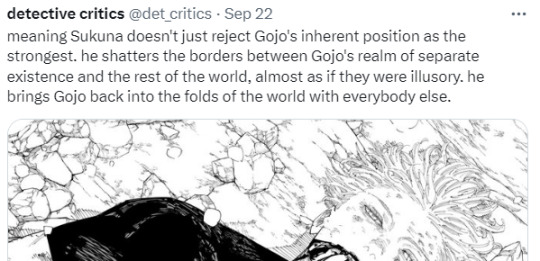
Detective critics basically said that Gojo's delusion was always a false one, he always existed in the same world as everyone else, he simply deluded himself into believing otherwise. There are reasons for this, his upbringing, trauma and not wanting to face the pain of that trauma, but it's still a choice he made. Gojo didn't want to live for other people, he didn't want to relate for them, so he lived for himself pursuing his own strength. Ironically, it reflects Toji's own decision to take pride in neither himself or others and live only for the sake of showing that the Jujutsu World that rejected him was wrong.

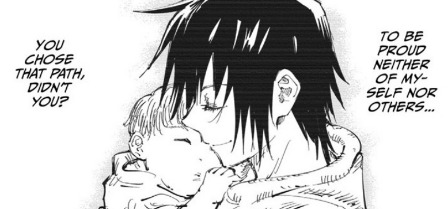
Toji chose to live a life where he only lived to fight and prove he was stronger than the sorcerers who rejected him. He chose it over his own son Megumi, abandoning him in order to continue his lifestyle as a mercenary. He even chose it over continuing to live because he stayed and fought against Gojo to prove he was stronger than the pinnacle of Jujutsu. Toji lives for strength, and he is someone even Gojo respected the strength of, but what else does he have?

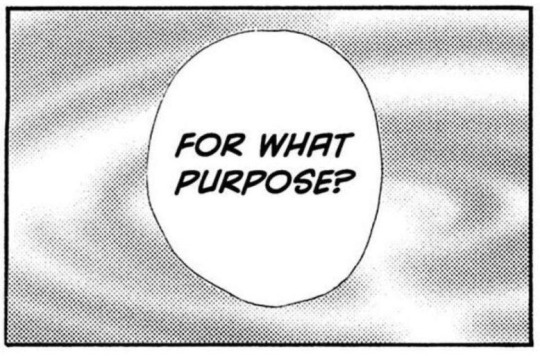
Toji's identity is unstable, he doesn't really live for any purpose, he kills people then blows the money gambling, he jumps from women to women to mooch off of them, he's also mentally unstable as well he shoots a little girl in the back of the head and feels nothing. The instability comes from his isolation, Toji is rejected by everyone the same way that Gojo is lauded by everyone. But Toji goes on step further in that he fails to construct any identity outside of being rejected and his entire life is spent rejecting the people who rejected him. Why does Toji want to be strong, he doesn't know. Purpose is something you have to construct for yourself, because there's no inherent meaning to life. Identity is something that's constructed by both yourself and your interactions with others because people aren't born inherently one thing or the other.
Gojo and Toji just refuse to do this, and only focus on themselves and the goal of being stronger. In Gojo's case I'd argue he doesn't fight for other people because he doesn't feel that connection with other people or rather he doesn't let himself. Hedgehog's dilemna to the extreme. Gojo only fighting for himself isn't Nanami calling him a selfish person who doesn't care about others, it's sad because Gojo never found any other reason to fight or meaning to his life but by getting stronger for its own sake.

Gojo only fights for the sake of satisfying himself, but here's the clincher, he's unsatisfied. Not only did he fail in his goal of giving Sukuna the fight of his life, because he knew Sukuna was holding back on him, but also admits to Geto that what would have really been satisfying is if Geto was there with him to pat him on the back.
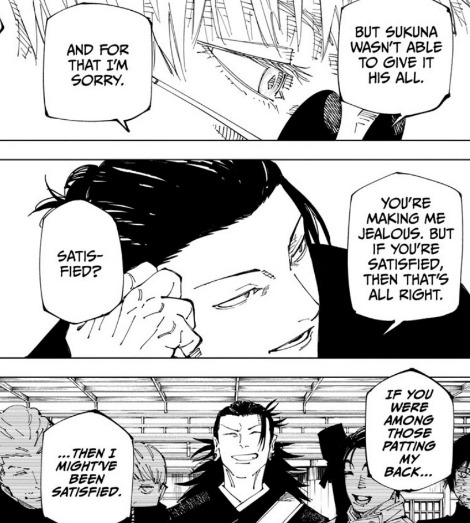
He's failed on both fronts, he's failed at being the strongest and he's failed at making a connection to the people in his life. Gojo and Toji die in pretty much the same way, they die standing up in the middle of battle, but their last thoughts aren't of disappointment that they lost but their loved ones.

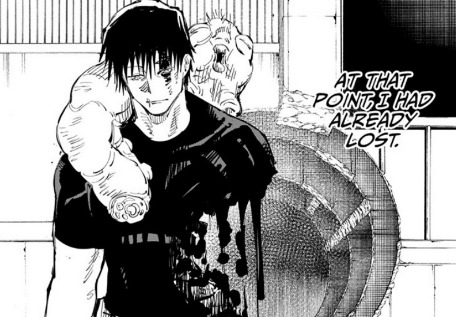
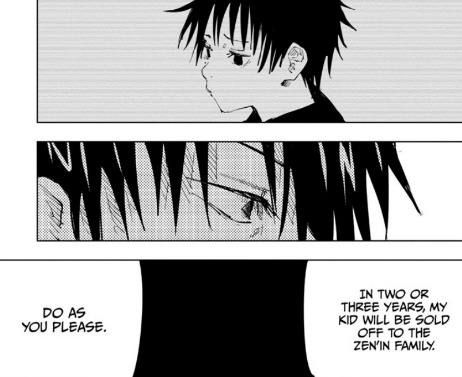
They spent their entire lives believing they were stronger and therefore different than others, and fighting to satisfy their ego and what does it amount to? Toji lived a life of hedonism and then died abandoning the one person he genuinely loved. Gojo has failed his stated goal of revolutionizing Jujutsu Society and dies before he can see whether or not his dream of a reset Jujutsu World will even come to fruition.
They belived they were someone stronger and therefore inherently better, and are put in their place when someone stronger comes along. They die just like all the other mortals. They believed they were alone so they died alone. It's sad and it goes to show how destructive being "the strongest" was to Gojo's identity in the end. Gojo thinks he's Sukuna but Gojo doesn't want to be Sukuna, because Sukuna's alone, and unlike Gojo you could make the point that Sukuna's not a human being who has human emotions because he's a curse. If Gojo was truly someone who could understand Sukuna he would have been truly alone the same way Sukuna is, and that's not what he wanted.
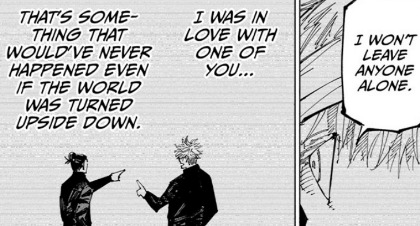
It's too bad Gojo never thought seriously about what he wanted, and therefore learned his lesson too late. He was always looking for someone he could relate to, except for in the people who were right in front of him.
#gojo satoru#jjk meta#satosugu#geto suguru#ryomen sukuna#jjk 236#jjk 236 spoilers#jujutsu kaisen 236#jujutsu kaisen 236 spoilers#jjk spoilers#jujutsu kaisen spoilers#jujutsu kaisen#jujutsu kaisen meta
1K notes
·
View notes
Text
The man surrounded by the theme of love…
Geto.
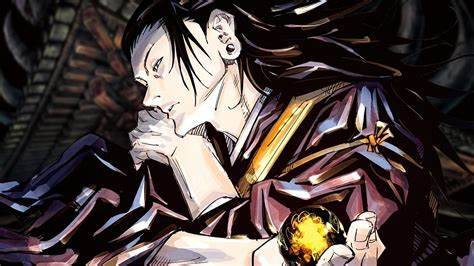
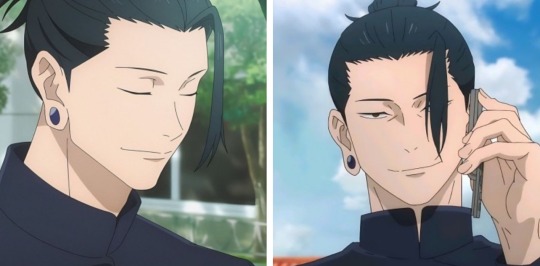
Gege has made several writing choices to depict Geto as someone who was handsome and loved - arguably more than any other character in the series. Maybe Gege loves him the most - not complaining at all.
More under the cut - just a few visuals I’ve collected to demonstrate this. I’m certainly not alone in noticing it and there may be others who show this much better, lol. Tag me in if you want to share!!
My post does end with a not-so brief analysis which you can skip if you wish.
Geto, despite being cursed at birth with the technique to absorb the ills of the world, the very skill that led him to fight alongside Gojo as part of the Strongest Duo - by design, each others’ counterpart in so many ways - a twist of fate led them onto opposite paths, leading to complete imbalance, one that drove him into madness.
If Geto in some ways represented Love, it is truly the most twisted curse of all which played a part in his death.
Geto witnessed the most love confessions in the whole series - I found (and stole) it off twitter/now X:
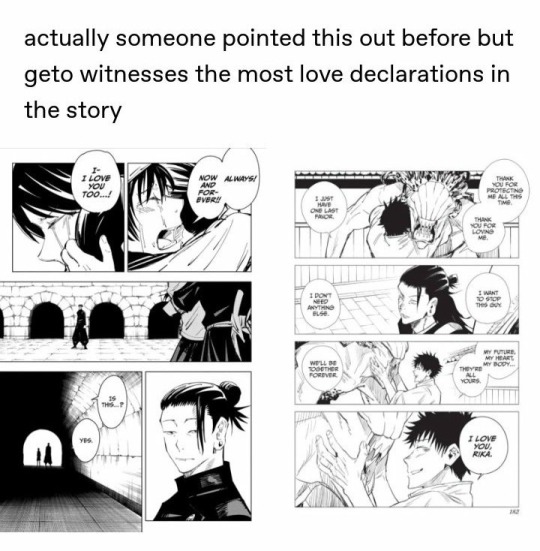
The Japanese originals seem more compelling to me:
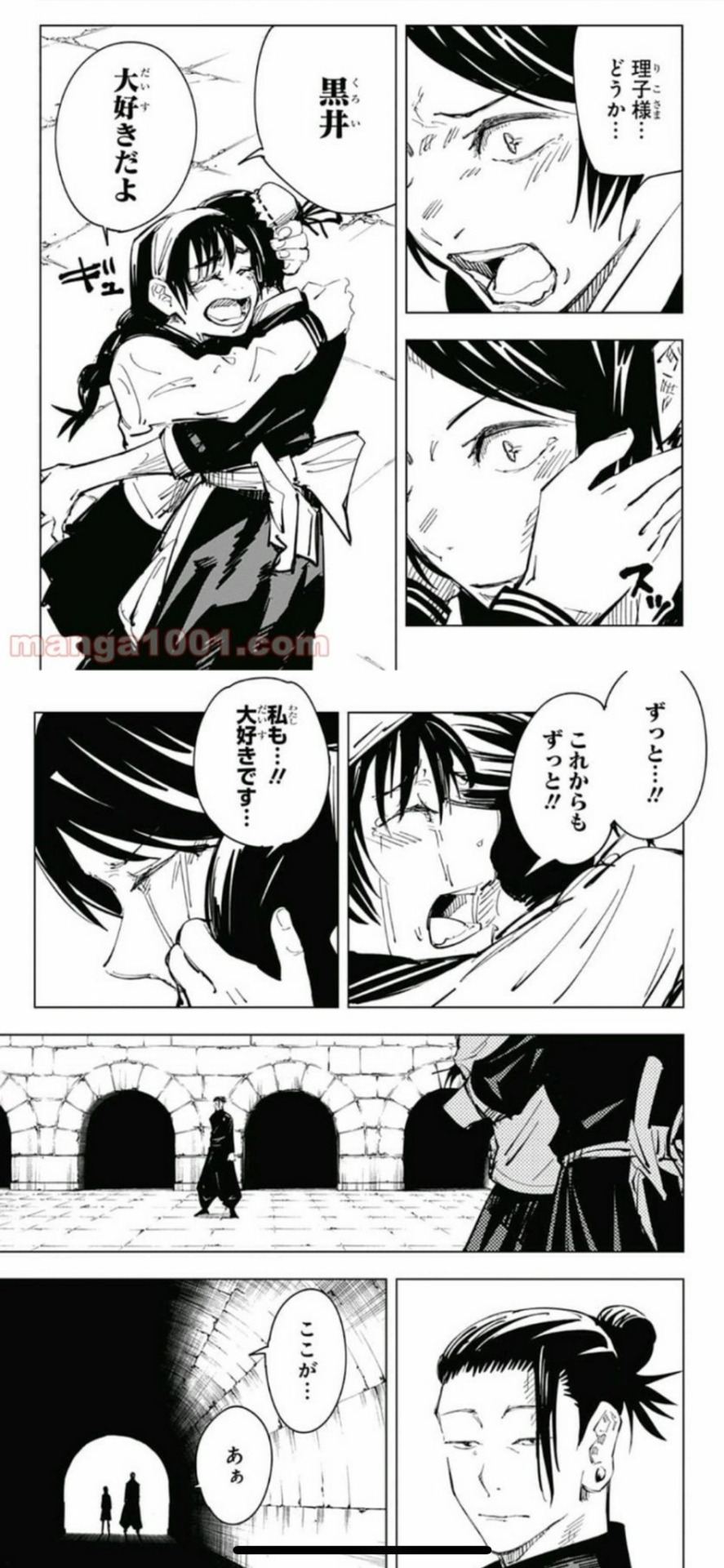
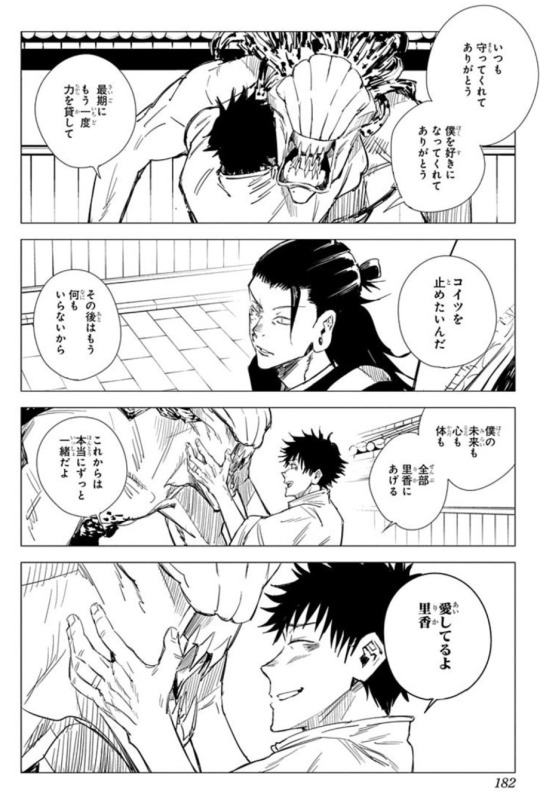
Riko says “daisuki” whereas Yuta uses a more traditional “Aishiteru” which, is quite embarrassing of a confession, and therefore almost hints at what could be Gojo’s last words to Geto, if it directly parallels Yuta & Rika’s relationship. And that expression Geto wears when he sees Riko and Kuroi struggle with separating?
That does not look like a person who cannot sympathise and empathise with people. Geto was a person who cared too much, and in search for a way to protect those he cared for, needed an outlet and something (in this case, lesser being, the humans) to blame. He descended into a mania and much like shinobu sensui from yu yu hakusho, seemed to develop some kind of mental disorder due to being unable to carry the conflicting ideals together. The dissonance the world presented to him was just too cruel, and he himself became a weapon to defend his ideals.
Before his defection, Geto was liked by his peers:
Haibara
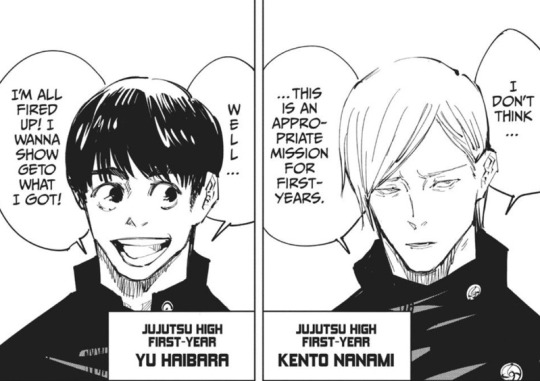
Mei Mei
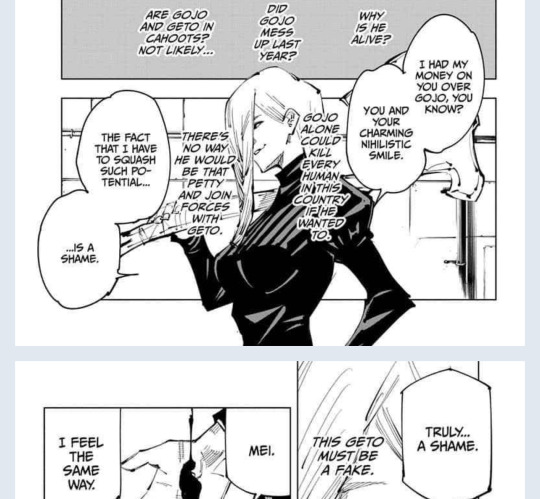
Loved by his family for and despite his ideals:
Mimiko and Nanako
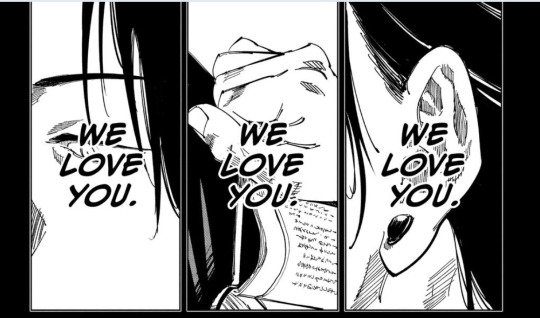
Shibuya crew liked/loved him and carried his will/beliefs even after his death, in their own ways, as family:
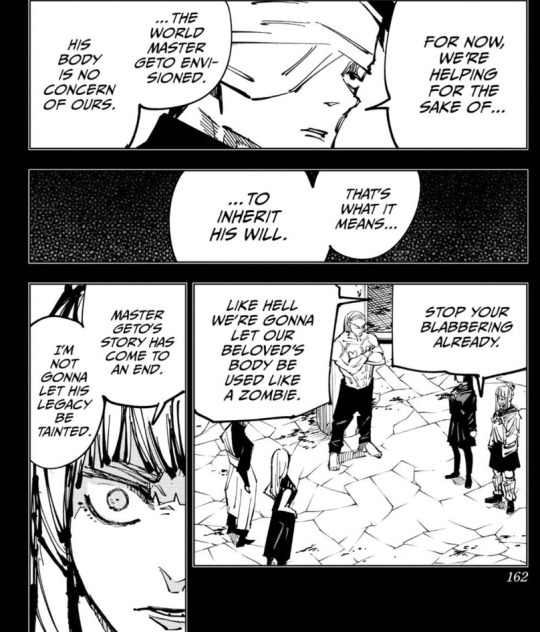
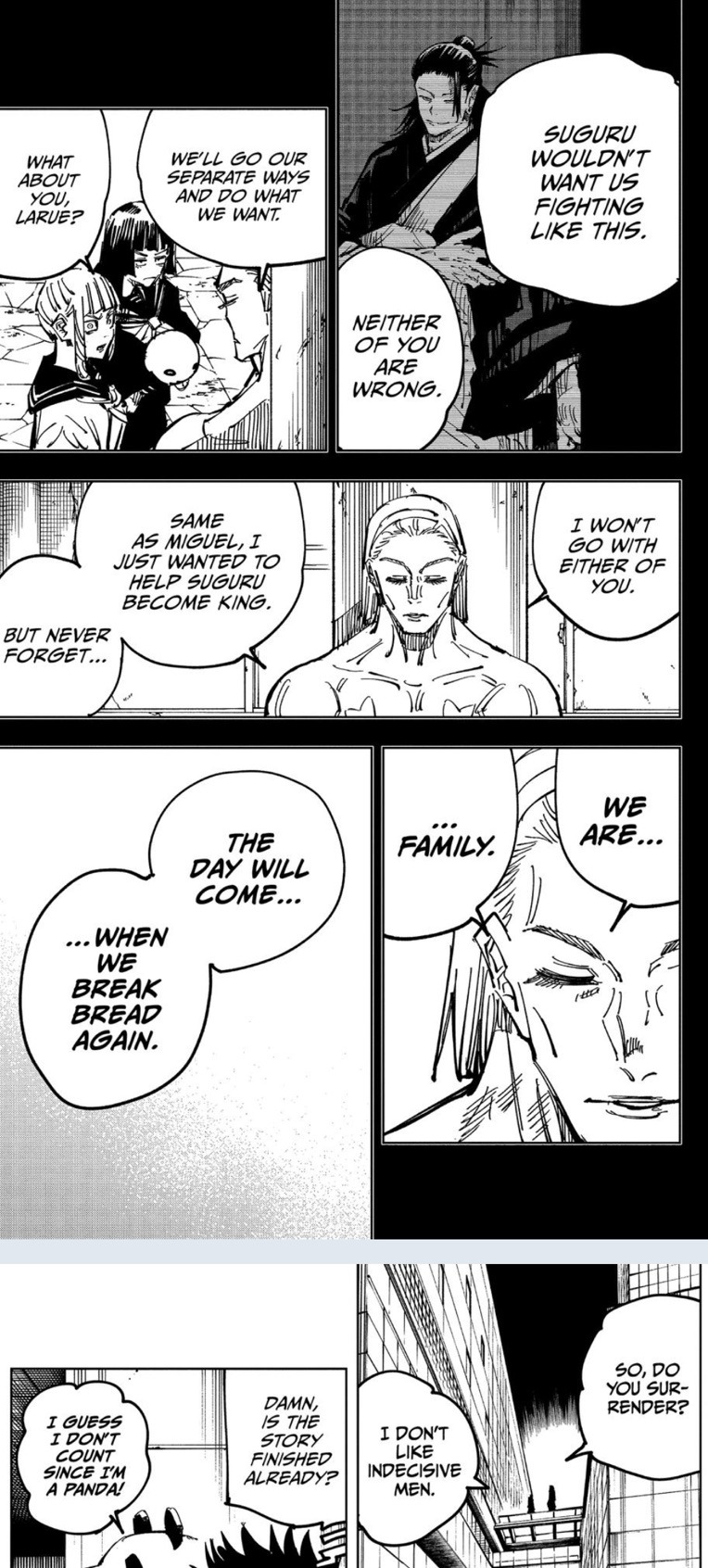
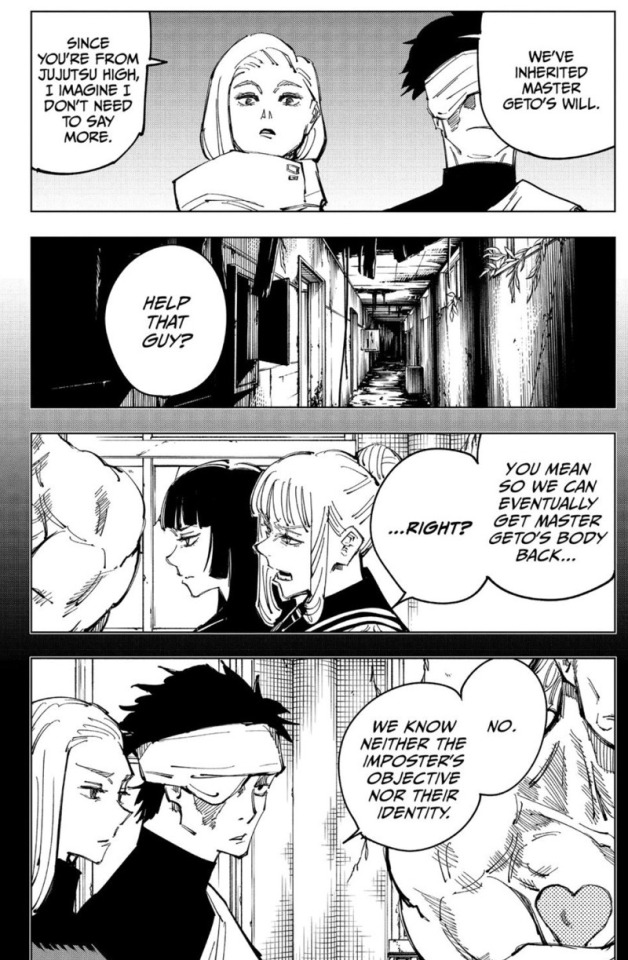
Miguel and Larue in the most recent chapter to date:
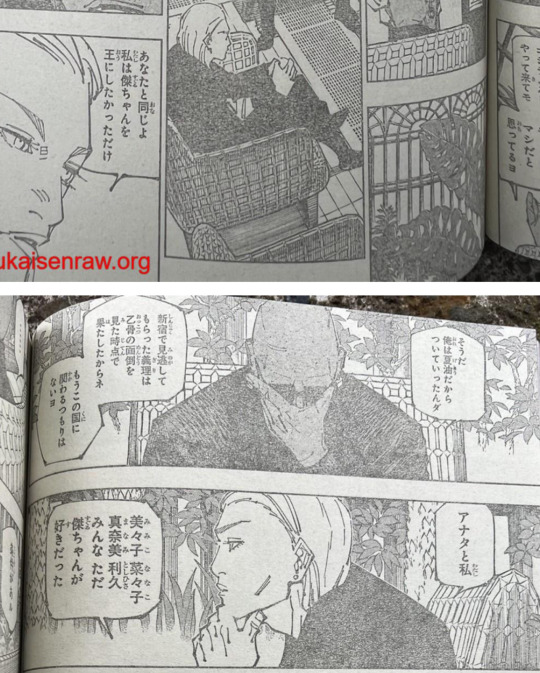
Translations (rough):
Larue: You and me alike, we just wanted Suguru-chan to be King.
Miguel: Yea, I followed just because it was Geto. After shibuya, I trained Okkotsu and I don’t want anything to do with the country anymore. (Something along these lines; a little too complicated for my rudimentary Japanese)
Larue: You , me, Mimiko, Nanako, Manami, Toshihisa, everyone just really liked/loved Suguru-chan.
Canonically, he was known to be handsome and popular:
Takaba
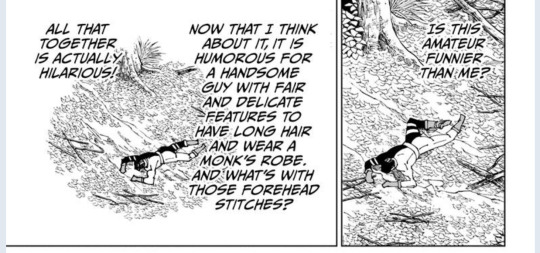
Gege’s character book:
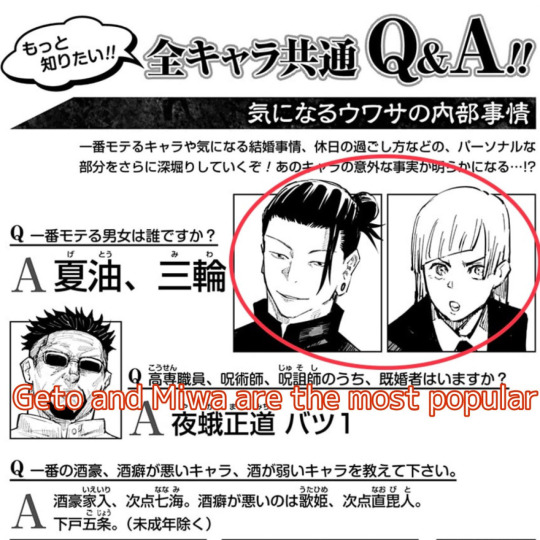
JJK popularity poll:
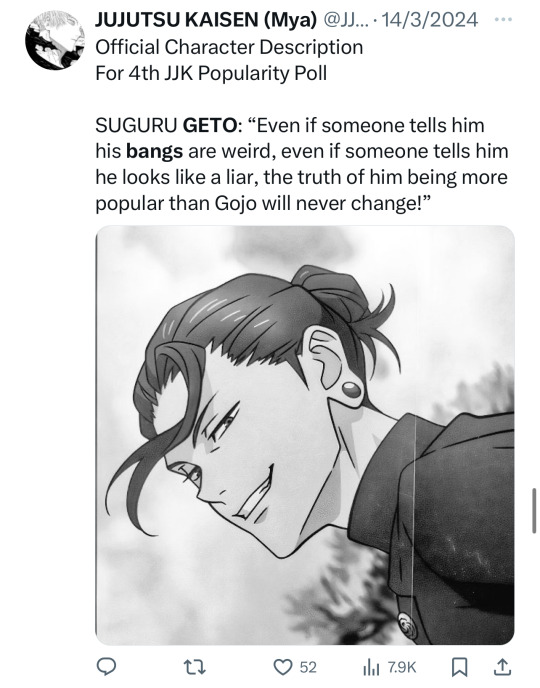
I do not have screengrabs of how Manami and Larue joined, but it was said to be due to how handsome they thought he was.
Maybe he was like Rika, who did realise how she came across in her life, and manipulated people, lol. But that’s a bit of a stretch to bring that parallel/similarity in. Geto was just quite a magnetic person, according to Gege.
And in the most roundabout way:
Gojo:
“my one and only”
“Love is the most twisted curse...” “curse me a little at the end.”

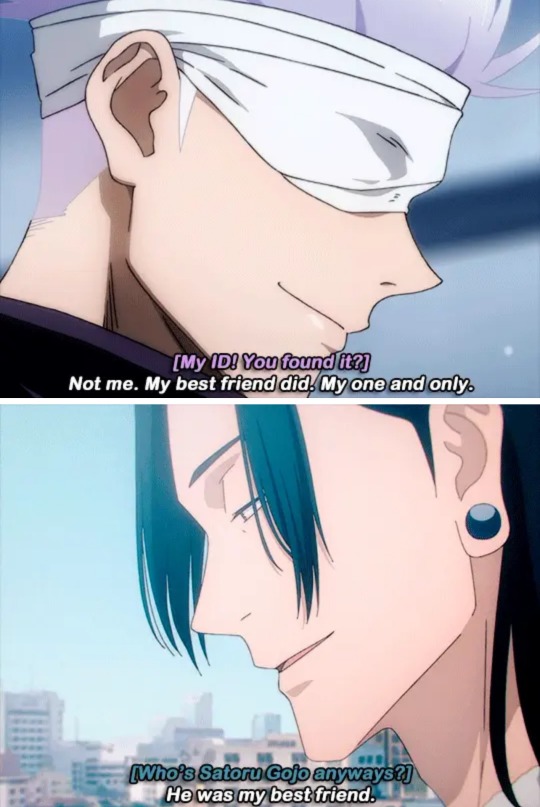
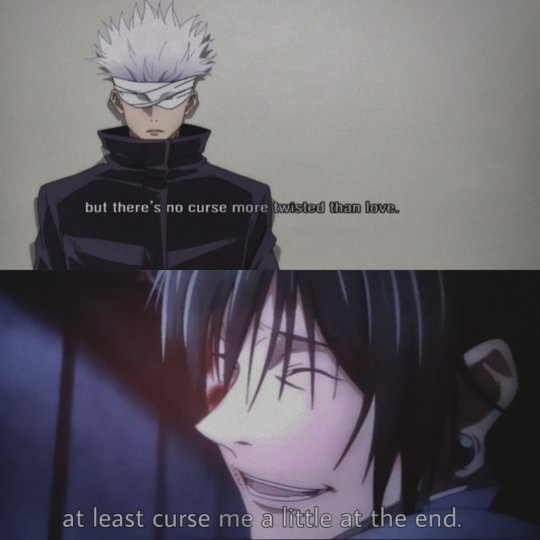
“I don’t need love to satisfy me” ... “if you were there I might’ve have been satisfied”
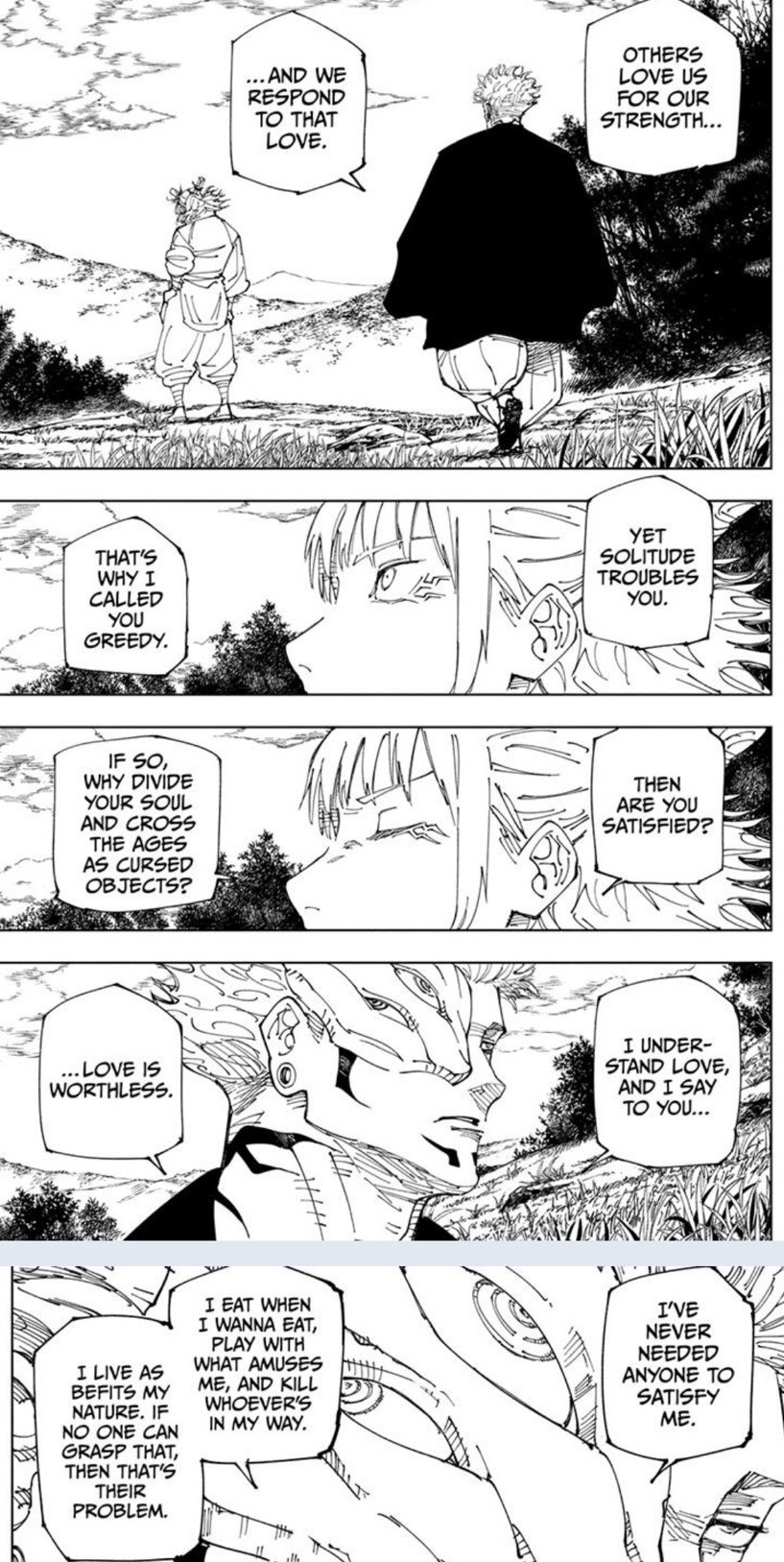
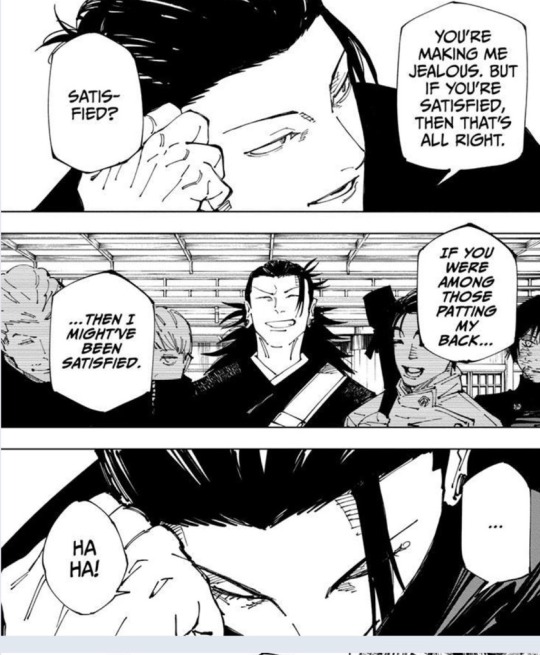
While love surrounds Geto, the theme that follows Gojo appears to be “the strongest” cursed; he was admired, revered, feared, and disliked by many. It truly breaks my heart, to think of what he had to give up to carry the weight of this for his whole life, until the very end.
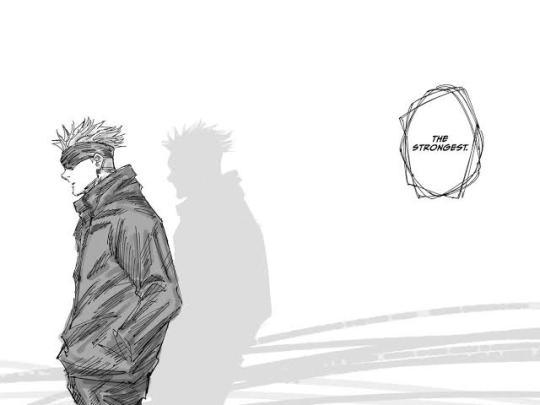
This looks like the most dizzyingly lonely picture of Gojo. It was indeed ironic to have it all but to embody what it means to have an unlimited void by being totally different.
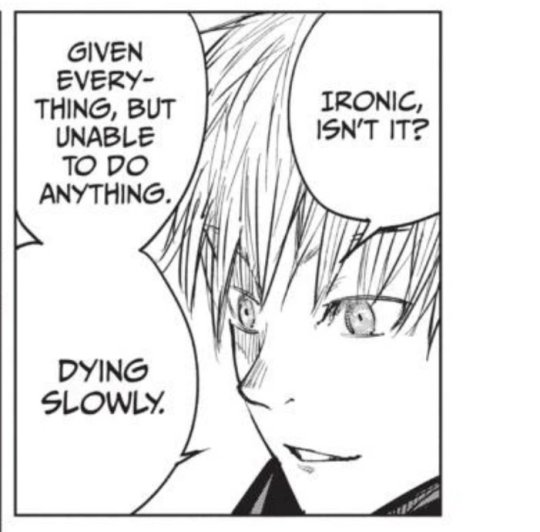
He suffered so much for his power and to have carried this strength. The sorcerer world was practically on his shoulders. The balance was up to him; everyone relied on him. Every time he tried to protect his love (geto) it seemed to fail. It worsened each time, ending with his own demise. But of course that’s just a dramatic interpretation - I don’t really mean/believe that, but it is one way to see the tragedy between Gojo and Geto. Strength at the expense of love; it plays out with the strongest this far as those identifying with this title are plagued by loneliness and do not know love.
They met before things got twisted within themselves, between them. Even after Geto left, Gojo seemed to be looking and waiting for him - to prove his trust for him almost as if he saw through his illusions and lies. Geto was the shadow (Yin) and Gojo was the light (Yang). Only the light can see through the dark. I’ll leave the gojo characterisation for another time / to other better writers.
For now, I’ll just say that I felt that he had planned for the possibility of losing to Sukuna (with the various things we see him do between scheduling the 24th and the actual day) and if he won, he’d just carry on the plan to cremate Geto on top of saving everyone and being a good example as the strongest. Worst case scenario, he would weaken Sukuna and I guess just die on the same day as Geto - idk, maybe as a form of redemption for one of his most painful experiences in life. Who knows?
I headcanon he was relieved to pass on, doing his part to defend the world that relied on him so much, with a big bang - a really fun fight.
And I’m glad they found each other at the end - the loved and the lost.
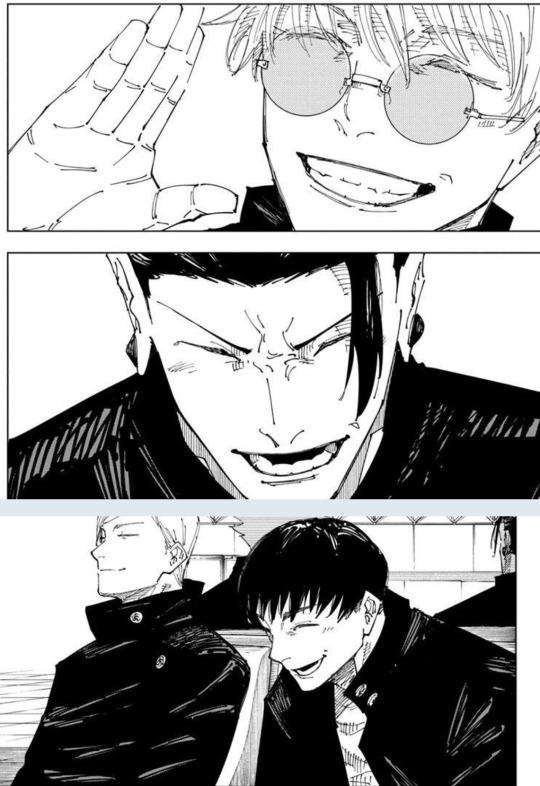
Back to Geto:
We don’t get much insight into what Geto wanted or felt aside from a world that was better for sorcerers, those he cared about. Even at the afterlife scene, or in subsequent chapters, we only hear from others rather than Geto.
Call me biased and delusional; I believe he didn’t kill the innocent despite saying he hated them all. He loved and hurt so strongly that he hated with almost equal force. He did want to force evolution and eventually extinguish all human kind, to him: the ignorant source of suffering, but I’m glad he didn’t manage to get Rika. I headcanon that he was aware he was losing himself by defying his own principles (to kill sorcerers) for his own gain. That, and Rika with a binding vow for a life, no less, was just too powerful.
In the official character book, Geto was described as someone who told himself that he hated humans a lot, like a reminder. He didn’t kill people indiscriminately. I’m sure he was well aware of how evil he had become but he had chosen, hadn’t he? He expressed to Yuta, that self-affirmation was incredibly important in his view. And the more he interacted with the students, I think the more his humanity fought back - I mean, he was standing there crying from being so moved by what he saw. He also let Yuta heal his friends. How villainous? Or how incredibly loving in spite of himself?
Geto has been shown to lie to others too: jjk 0: described having lied to the school about the conditions for obtaining a cursed spirit, and after defecting: upon taking stage for the first time, stating that the looking the part (wearing gojokesa) was important (ie lying). At his death’s door, he also prefaces with, no matter what anyone says - why would there be a need for that if he wasn’t telling a half-truth? He sought to avenge Riko (first person at the cult he killed after calling him onto the stage + cue mic throw) and the village represented a bunch of people who he slaughtered out of rage and ignorance. I’m definitely not defending him here - his actions are reprehensible. My headcanon view is that he didn’t know how to live with himself after snapping and that was the only path laid before him, which he ardently committed to.
I just think that he held onto a form of love/humanity still- Gojo and Geto both did. Without it, Geto would’ve become the Queen of curses due to Rika (uncaring about his family, or killing young sorcerors despite witnessing the students’ bond and yuta’s selfless power of love in jjk0) and Gojo may have focused on training at all cost without embracing Geto’s principles and becoming a teacher to change the jujutsu world - he could’ve become the next Sukuna and take the title of the King of curses instead - crowning them both King and Queen - instead of both the King and Queen contributing to their deaths. Anyway, I digress...
Geto appears very mother-coded in his protective and defensive relations to the girls, but also to Riko, Kuroi, and Gojo - especially after Toji had killed them. He was so fiercely trying to avenge and defend them, but failing that had a huge effect on him. Moreover, Haibara - innocent, glowingly positive - suffered an undeserved death. It weighed so heavily on Geto, that he didn’t defend Gojo when Nanami vented about leaving things to Gojo who seemed to take it all in his stride, almost insinuating that Geto, too, had little autonomy but to carry on that cycle of curse consumption he began to loathe.
Yuki also underlined the meaninglessness of the death / sacrifice / relationship rupture / suffering. And like the novel implies: Geto was too sincere for this world. He just loved too deeply and wounds cut him too painfully. At just 17... what inner resources were they forced to develop?
He was disillusioned by the system, but respected that Gojo had a place there. This is also SatoSugu indulgent: He never once attempted to talk Gojo into joining him, despite it being the most logical choice, but Geto was the emotional and loving kind - he prioritised Gojo over his ideals / himself. This man was willing to die trying to pursue his ideals, but didn’t want to try convincing his friend even if he know it might fail. What does that say about him? I think it says he loved Gojo. And Gojo loved him.
He masked like Gojo did : the infamous “yeah I’d win” and Geto’s “I’ve made my choice” and his face fell as he had his back turned, stating that he just needed to do it to the best of his ability. This may be headcanon but it does seem plausible to me. He was under no illusions about what he had done. To love was to turn away too. To love was to let the other go. Sigh.
Backtracking a bit: When Geto encountered the twin girls, who knows what entered his mind, but there was something that emerged from being horrified, enraged, and it gave birth to new meaning. He would take control and save them - from humans and the institution that made child sorcerors die. According to Gege, he became Papa Geto. (Kenjaku is also mum-coded but the antithesis of motherly love, with the womb protrusion domain and actually bearing children.)
This is of course not limited to feminine energy, as parents, both male and female, have protective instincts. But I’m not here to go into that discourse. Just stereotypically, and loosely speaking, Geto is very Yin energy. He is a big Mama Bear. With extreme maternal aggression. We see female counterparts do this in the wild more than males. And yes, of course both male and female are protective. Both geto and gojo were protective in their own unique ways. That’s for another post. Geto would rather die than have anyone come save him. In fact, the scripture behind him in the temple goes somewhere along the lines of “death to the weak”. If he had failed, he deserved to die. His family should live.
Gojo cares for others differently. And yes we know he died whilst defending others too. He is inherently more individualistic due to what he is with his gifts and noble heritage. He is less emotional and more cerebral, the only time we saw him lose his composure was due to Geto.
He allows his students to take risks and would allow them to fight in his stead, like in jjk 0 where Toge and panda were sent to be defeated by Geto. Tough love, as Gojo admits. This is also very Dad-like in the modern sense of the word.
In my subjective experiencing of the world, it’s almost like a husband who is only really emotionally vulnerable with his wife, and is otherwise the successful businessman, dad, and whatever else he is. Geto is much like a mum that he would walk away from her husband (lol, Gojo in this case) in order to protect them in a way she deems is best. Maybe I’m a little nuts, I don’t know. (Actually I am a little eccentric, but that’s by the by).
Now this is totally just satosugu indulgent: I headcanon that Gojo also “protected” / was possessive of Geto by making a deal with Miguel since the latter said he would curse Geto if he died, lol. Especially in light of the latest chapter where Miguel said he was spared by Gojo. (And i reckon Gojo was respectful of Miguel being Geto’s family, so he spared him for that reason too). I mean, Gojo had to kill his best friend, but this was his burden to bear, you know? It’s almost sickeningly intimate to allow someone to end your suffering, and be entrusted with that too. Ugh, ouch, my heart…..
Edit: I’m reminded of that scene where Shoko reflects on loving neither of them, like Gojo, Geto didn’t want anyone to be alone anymore either. Geto said he didn’t feel happy from the bottom of his heart. Gojo felt lonely (although he said it got better at the airport scene). They weren’t alone, but probably felt it… because of the absence of their true/first love? Larue stating in the panels above that Geto wouldn’t wish for them to fight seems like a nod to what Geto believed happened between him and Gojo. Gojo raised allies - be strong, don’t be left behind. Geto a family - get along, don’t fight. Just pointing out what my take is on the parallels I’ve observed.
That ends the brief analysis portion of what I wished to convey about what appears to surround Geto. He may not have been depicted much in the series, but his presence has been felt through the eyes of many. It made me wonder why did Gege do this?
This author deliberately wrote multiple people in the verse to love and follow him (and spare him a death sentence for 10 years) despite not agreeing to his ideals.
Perhaps it isn’t Gege’s focus, understandably, to give us a lot more insight from Geto’s pov, but there is certainly some kind of narrative he is pushing to depict how this man, cruel yet kind, is somehow one of the few he seems to portray in this way more than others within the sorcerer world at the very least. That his life was somehow a tragedy that he might not have really known the love at all? I wonder what Gojo’s last words were to incite such a heartfelt reaction - well done? Welcome home? You did well? I love you? My one and only best friend? Sigh, I guess it’s a secret between them.
There are others who have written metas on Gojo and maternal energy. If I find it I’ll link it! Otherwise, search through my reblogs! So many fantastic writers and thinkers out there!
Thanks for reading if you made it this far!
#satosugu#stsg#jjk analysis#jujutsu kaisen#jjk meta#jjk spoilers#geto suguru#jjk#gojo satoru#jjk satosugu#jjk theories#jujutsu kaisen meta#jujutsu kaisen geto suguru#jujutsu kaisen theories#gege akutami#geto meta#satosugu angst#suguru meta#jujutsu kaisen suguru#jujutsu kaisen geto#jjk miguel#jjk stsg#stsg angst#satosugu analysis#jjk character analysis#satosugu theories#jjk manga#jjk anime
271 notes
·
View notes
Text
Yooooo hold on.
So if Yuuta cursed Rika by thinking “don’t leave me.” so hard she manifested into a cursed spirit, Suguru’s “at least curse me at the end” to Satoru would then mean, “don’t let me go.”
It’s like saying, “Curse me like Yuuta did to Rika. Love me so bad that you can’t let me go. Hold on to me.”
#i cannot stop seeing it#and then satoru rly couldn’t let him go#he got his wish#but at what cost#jujutsu kaisen#jjk#satosugu#gojo satoru#geto suguru#stsg#suguru geto#satoru gojo#jujukai#jjk spoilers#jjk meta#jujutsu kaisen meta#jujutsu kaisen analysis#satosugu angst#satosugu analysis
790 notes
·
View notes
Text
Gojō Satoru's rude awakening

I'm refusing to let myself seriously entertain the possibility that Gojō can come back after chapter 236. However, that's because I'm trying to protect my future self from disappointment, not because I think it's implausible — and I really want to talk about this image!
A couple of days ago, @runabout-river shared an interesting theory about what might happen next for Gojō. The post itself is well worth a read, but it was the choice of the above image that really set my mind alight. This scene is fresh in our minds after the anime adaptation of Hidden Inventory, and timing is clearly never an accident with Gege Akutami. So, why is it relevant now?
We see Gojō giving himself over to his past, lost in his happy dreams of his youth, only for Megumi — Gojō's first student and a symbol of the future that he envisions — to bring him back to the present by telling Gojō, "You're the one who called us here, please don't go dozing off."
In other words, "You're the one who dragged us into all of this, don't go pretending this isn't reality just because it's nicer in the past."

In my immediate reaction to 236, I said:
Gojō's dying bloody smile shows he's at least happy in his final moments. [...] Although, if Gojō actually is at peace in death, maybe that's the reason Gege will bring him back. He'll *never* let that man be happy, I swear.
It was just a joke, but seeing @runabout-river's post made me realise that Akutami has already set a precedent for 'punishing' Gojō for looking backwards. When he's dreaming about his past, Megumi scolds him and brings him back to the present. When he 'lets his mind wander' to his blue spring in Shibuya, he literally gets locked in a box where time doesn't pass, only to immediately find himself at the bottom of Japan's deepest ocean trench when his students bust him out to fix the problem he created.

As a side note, in both of these moments, the anime adaptation played a melancholy version of Gojō's Limitless theme — the audio representation of Gojō's youth. I'll eat my hat if it doesn't play again when chapter 236 is eventually adapted (I shared some more insights into some of the easter eggs hidden in the season 2 score in my mini review of the Hidden Inventory soundtrack if you wanna read).
If Gojō dies here, looking backwards to his youth, then he's taking the easy way out and that's what I find hardest to swallow about 236. Gojō leaves what is potentially the most difficult conversation he'll ever have — telling Megumi the truth about his father — to Shōko. He leaves his students to deal with the fallout of his failure to cremate Getō's body. He's saddling the people he loves with the responsibilities he leaves behind, and that's not fair.
However, we won't know if that's what's happened for sure until the whole story is told. Gojō doesn't mention his students in this chapter, and lots of people were bewildered that he seems unconcerned about their safety in a world without him. While that could simply be explained by his faith that they've "got it from here", there's a chance that he genuinely didn't think about it and he's about to get a rude awakening as his punishment — hence, "I pray that this isn't just a delusion".
I would *adore* it if Shōko dragged him back to life kicking and screaming, hauling him away from his pleasant fantasy of youth to tell him, 'No, you and Getō don't get to leave me behind to pick up the pieces again'. Because isn't that Shōko as a character? The one who's left to pick up the pieces in their wake? The one to heal the wounds and lay the bodies to rest while everyone forgets she's even there?

It would be the most character development she ever receives, and I'd love to see how Gojō and Shōko's dynamic changes when he's not the 'Strongest' anymore. So, in Shōko's own words:

#jjk#jujutsu kaisen#呪術廻戦#jjk 236#jjk meta#jjk analysis#gojo satoru#ieiri shoko#jujutsu kaisen meta#jujutsu kaisen analysis#jjk spoilers#jjk manga spoilers#jujutsu kaisen spoilers#jjk leaks#i can't stop talking about this chapter#so i guess it might actually be really good???#i'm literally drafting another post right now 💀
449 notes
·
View notes
Text

till death do us part—the fate of the six eyes and zenin clan leader from satoru’s story
#cw blood#atsushi zenin#arashi gojo#jjk#jujutsu kaisen#jjk oc#jujutsu kaisen oc#six eyes#zenin clan#gojo clan#jjk meta#jujutsu kaisen meta#arctvros
325 notes
·
View notes
Text
A Character Analysis on Megumi Fushiguro from a Jungian perspective- The Shadow
"Emerge from the darkness, blacker than darkness. Purify all that is impure"
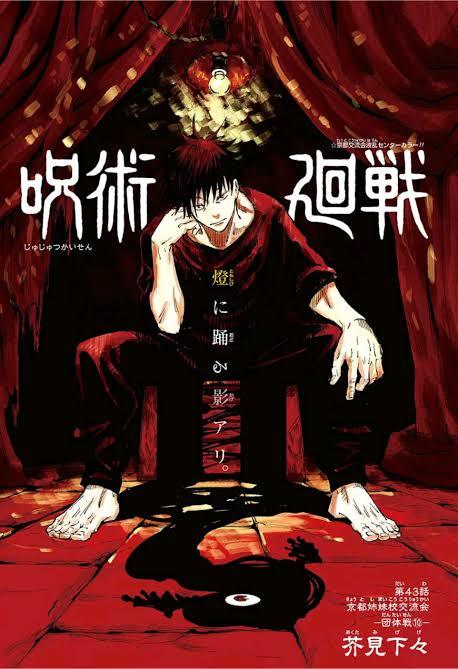
Megumi has been consistently portrayed as someone who really struggles with his self worth or his sense of self but there have been instances when he starts behaving in a really confident and assertive manner.
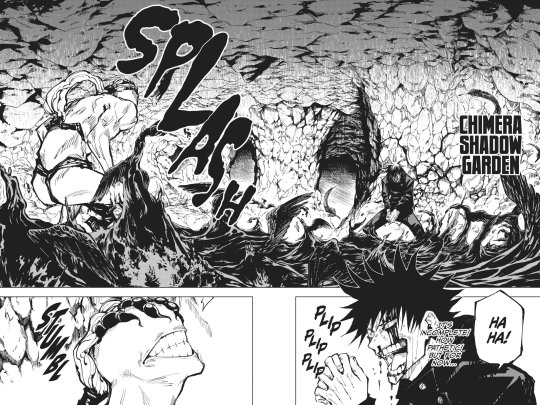
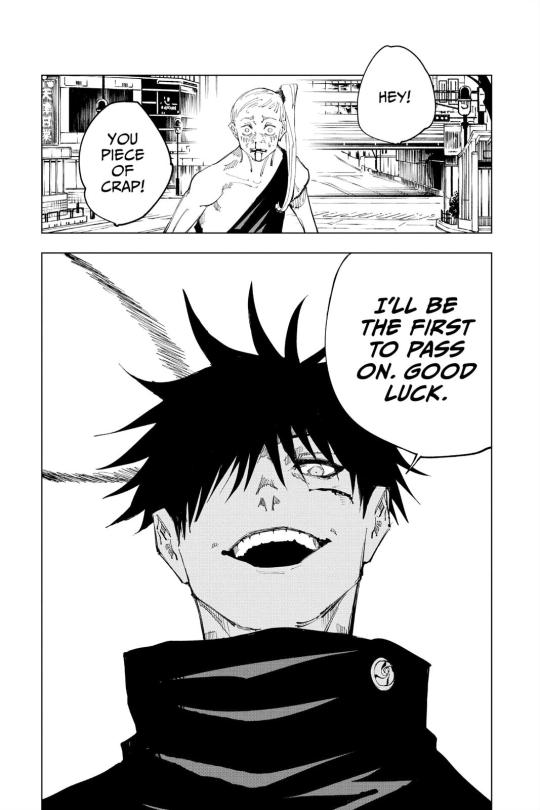
In order to better understand Megumi we need to look at his background. He was basically raised by Tsumiki with Gojo acting as his guardian at times. At a time when a child's personality develops, he had to make a deal with Gojo to work as a Sorcerer in exchange for Tsumiki's safety.
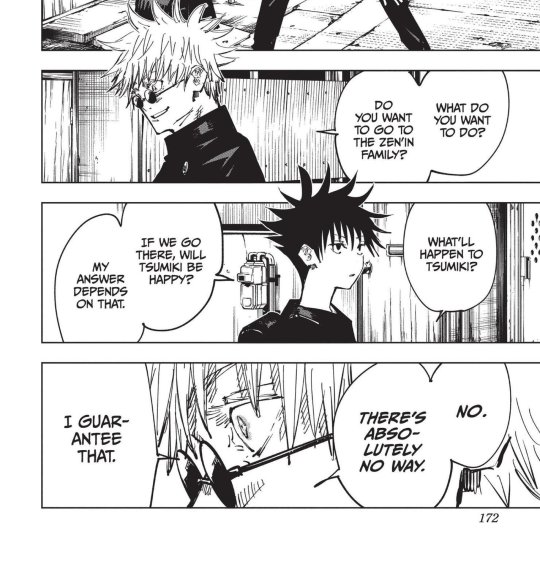
As a child, he had to come to terms with the idea that his father is somewhere out there but he has been abandoned by him when we know this wasn't the case. Toji did his best to look out for Megumi but he couldn't be close to him because he was fearful of the type of influence he would be on Megumi.
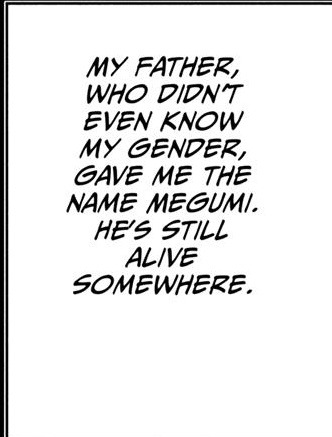
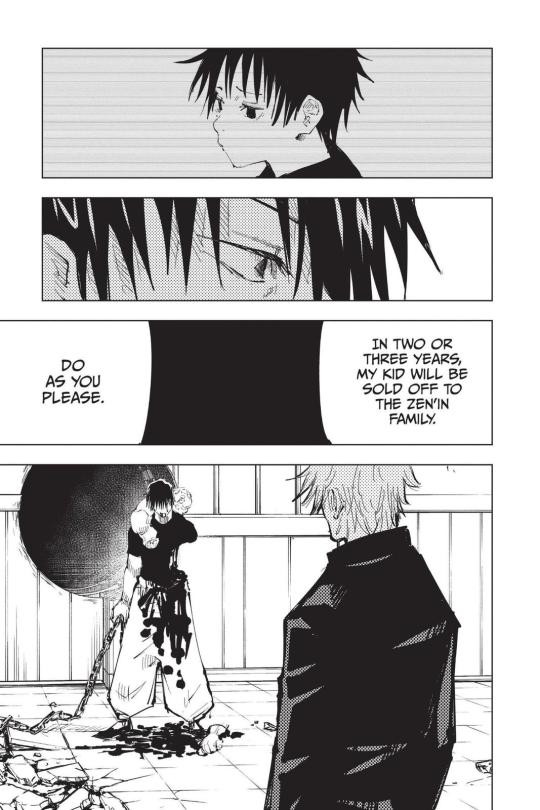
When Gojo tried to tell Megumi about his father, he himself stopped Gojo, acting as if it doesn't matter but that's a literal child, why wouldn't it matter, yet he refrained from trying to know the truth about Toji out of fear. Fear of what if the truth is even worse than being abandoned by his own father.
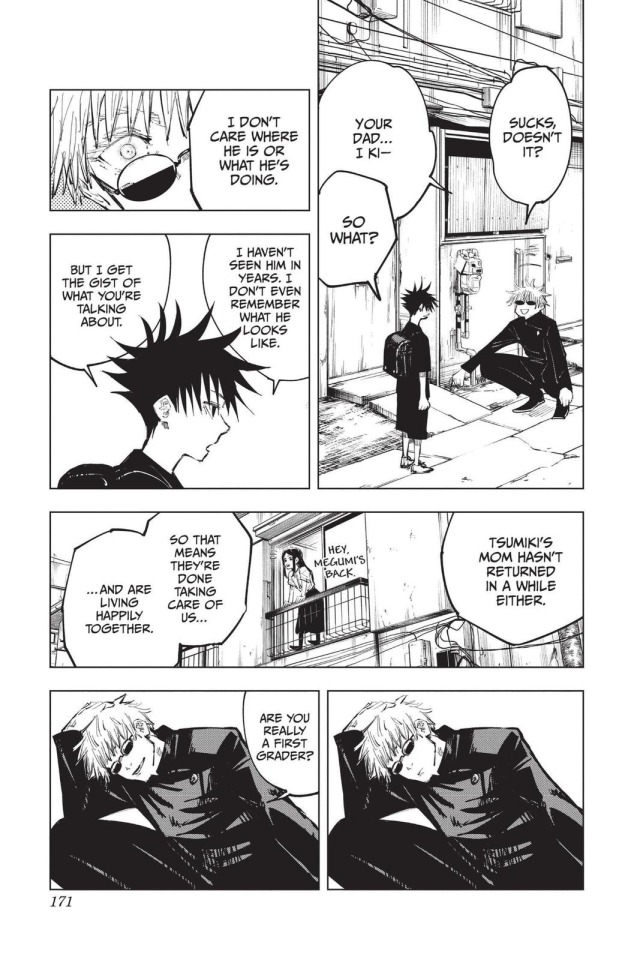
What did the most damage to Megumi was hearing from Gojo that Toji kept him hidden from the zenins to use him as a trump card against them as if he was just a commodity with value , who he is , is just about what is the value of his technique. His own potential crushed him, in a sense took his childhood away from him and halted his personal development.
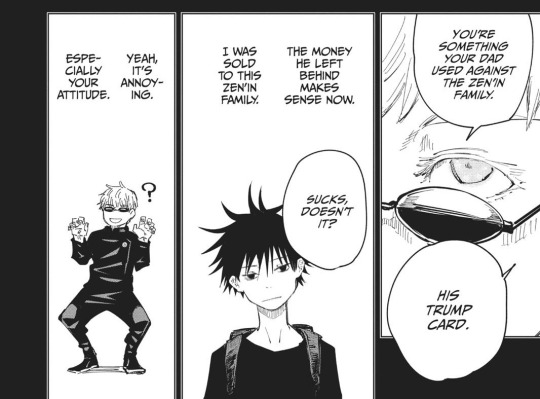
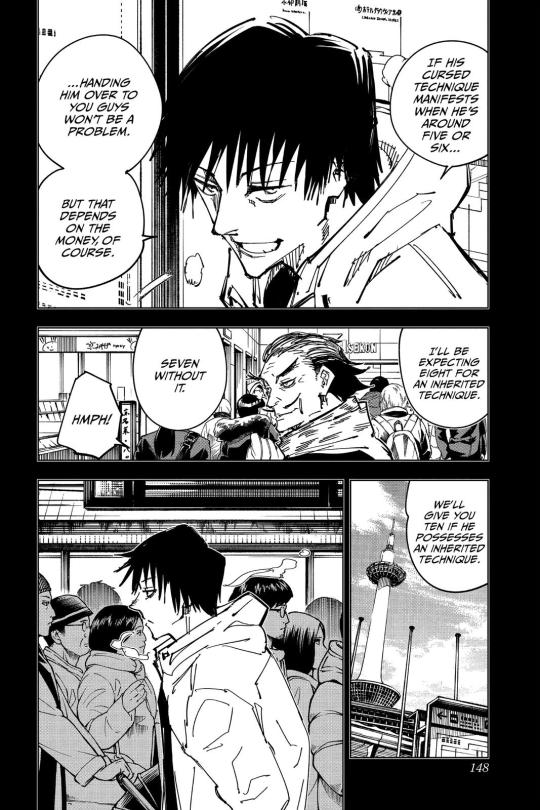
Even Gojo mostly interacted with him in a manner where it looked like he is more worried about Megumi not being strong enough than trying to understand and talk to him about who Megumi is and who he wants to be which isn't because Gojo didn't want to , he just didn't knew how to. Gojo met Megumi at a time when he himself lost all sense of his identity and didn't knew how to relate and understand others on a deep personal level.
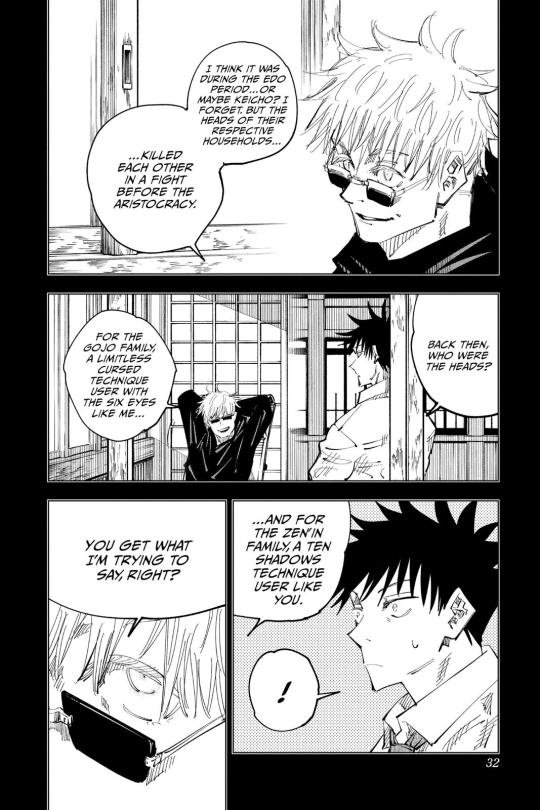
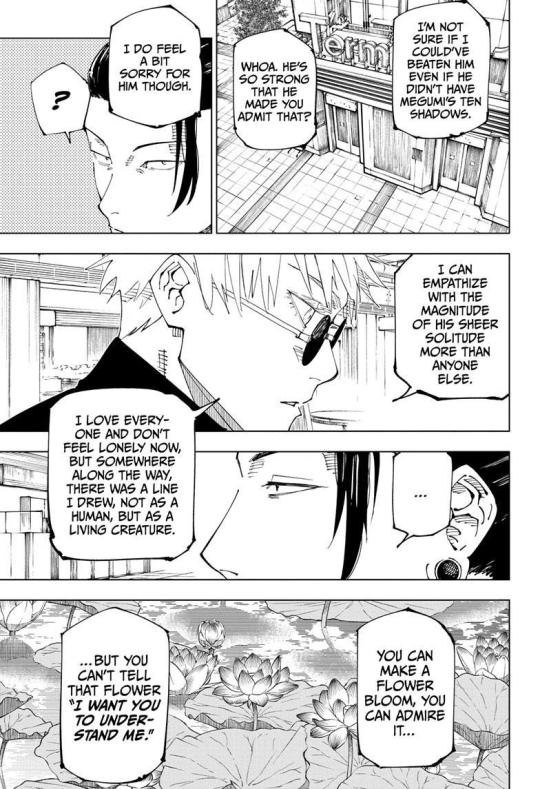
THIS led to the creation of the biggest divide between the persona (ego) and the unconscious (shadow) in Megumi's psyche. The mask that Megumi wears to face the society stored all the aspects of his personality that he doesn't deem good or worthy in his shadow, including his 'Potential' and feelings which is why Megumi looks so emotionally detached from everything . He has locked up his emotions in his shadow, he tries to rationalize everything without accounting for the feeling behind it and thats why his "instincts" are dull.
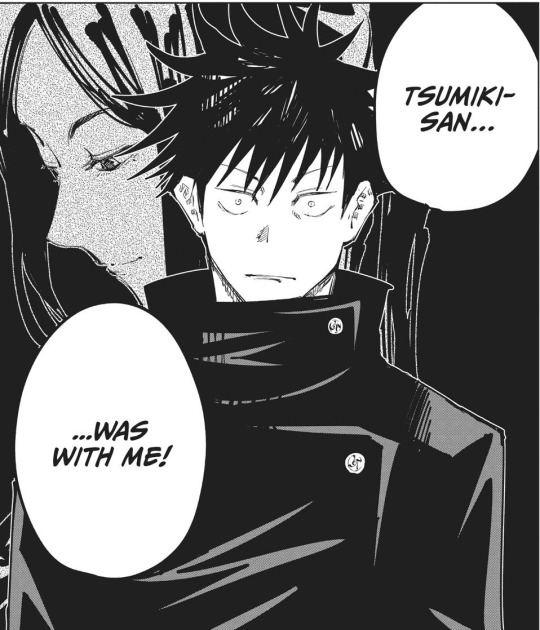
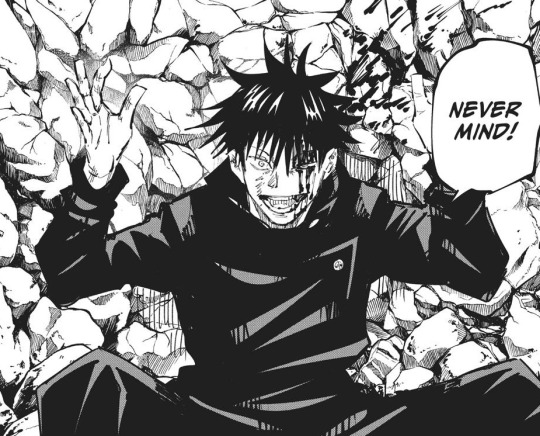
Megumi's persona Megumi's shadow
It's because he felt like an empty vessel with a technique that he objectified the only person he looked up to, Tsumiki. He viewed her more as someone whose goodness and purity needs to be protected than as an individual, he didn't let her reach him, himself acknowledged how immature he was, all a result of the deeply traumatized 'inner child'.
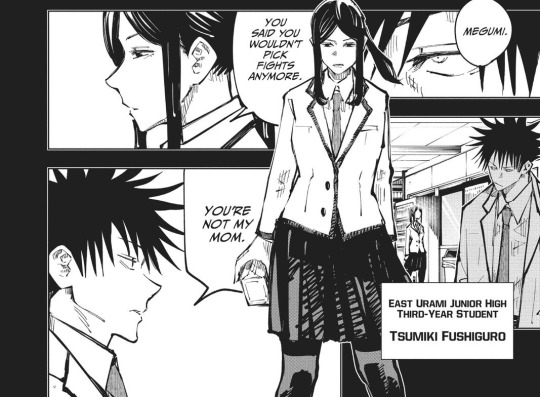
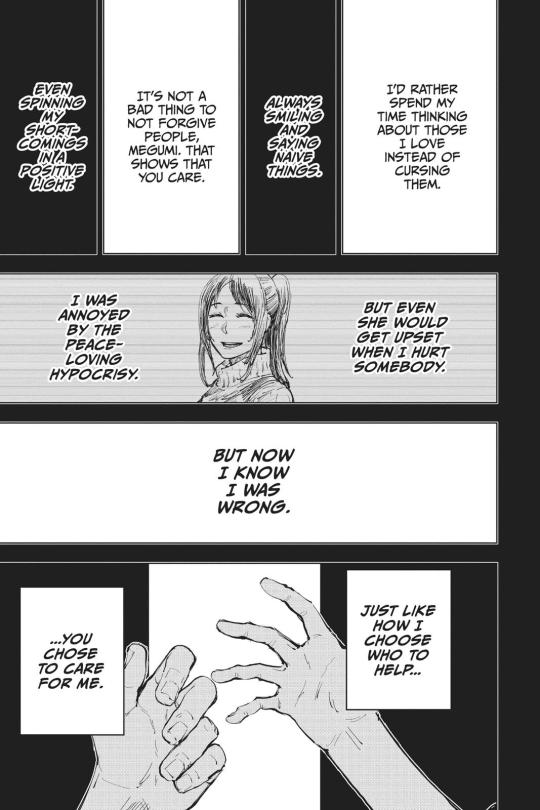
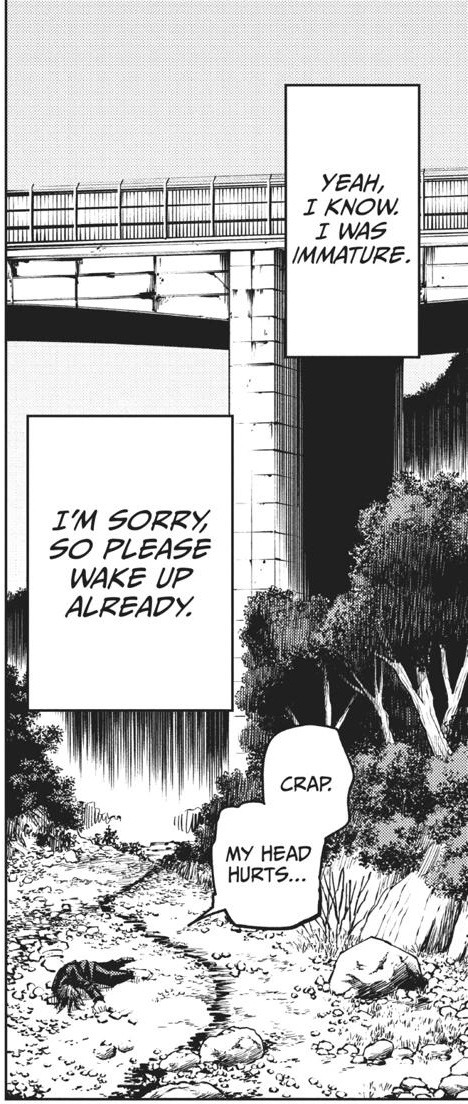
It's interesting how inner child was also used for a character who was introduced during Megumi's colony fight, Takaba. Both Megumi and Takaba ignored the "inner child" within them, except with Megumi, his ignorance is the result of an absence of childhood.
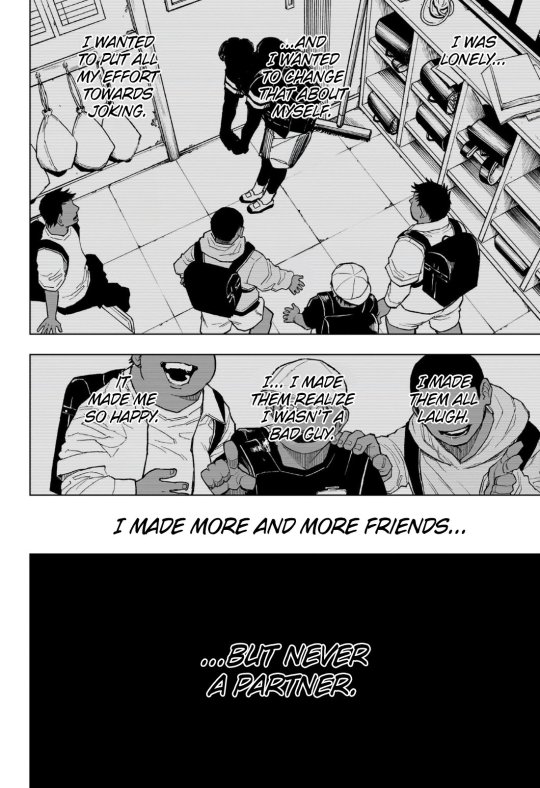
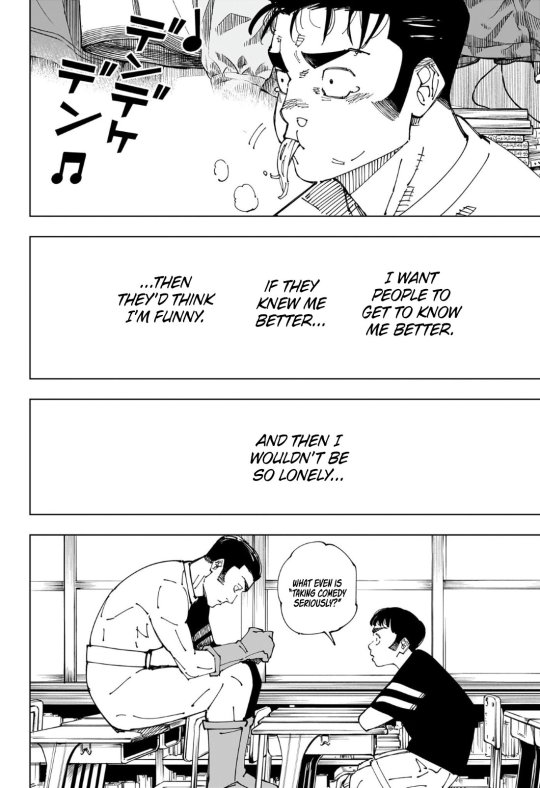
Megumi's fixation on saving Tsumiki got to a point where his own shadow took Tsumiki's form or this could actually be Tsumiki's own shadow that is connected to Megumi. The Shadow that influences him yet he isn't aware of its existence.
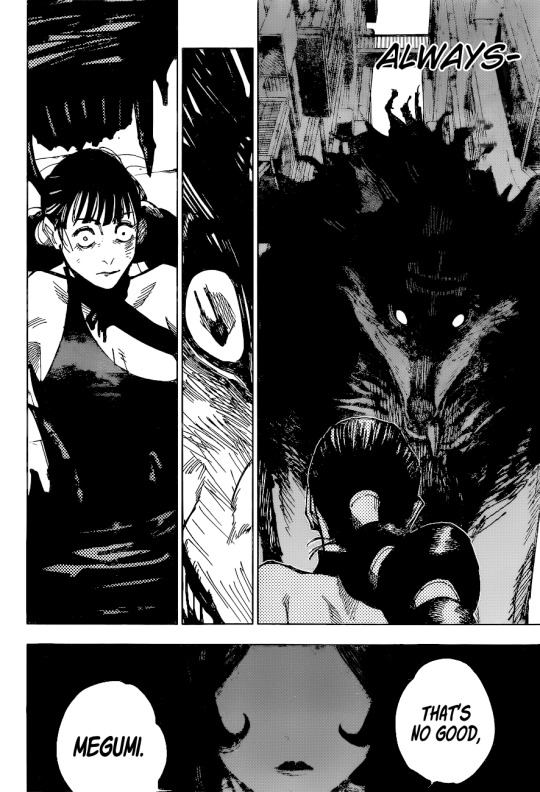
What Megumi is going through is described as "Dark night of the soul" in philosophical terms. It is the longest and darkest night of the soul where the soul is at its lowest, the will to exist ceases, however it is also the moment where divine light shines above oneself to guide them out of their suffering (How Gege depicted Megumi's condition). I think it's important that Megumi's birthday is on 22nd Dec ( winter solstice) the longest night of the year which in Japanese is called 'Toji' . Perhaps some intentionality on Gege's part to show how Toji is the core of Megumi's trauma.
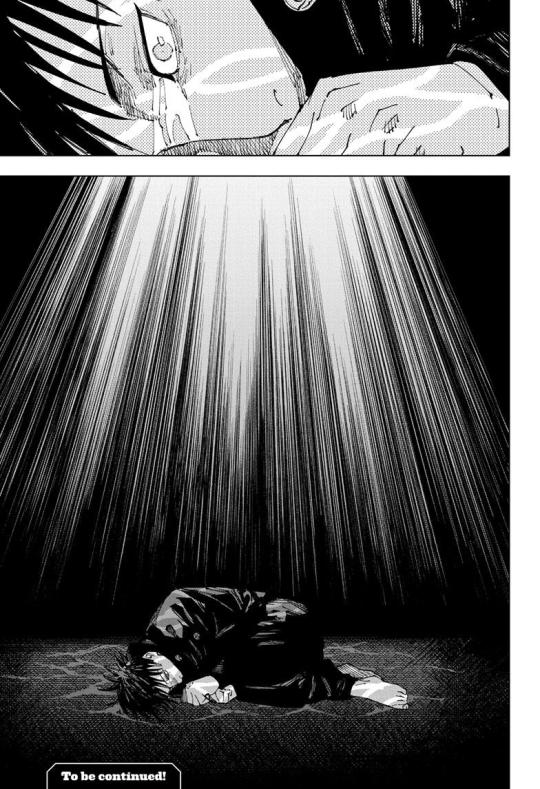
Dark night of the soul
But what lies ahead ? I believe the process of 'Individuation' , theorized by Carl Jung it's the process by which a person achieves psychic wholeness, recognizing his innermost uniqueness and he identified this process with becoming one's own self Or Self realization. It's the merging of the Persona and the Shadow
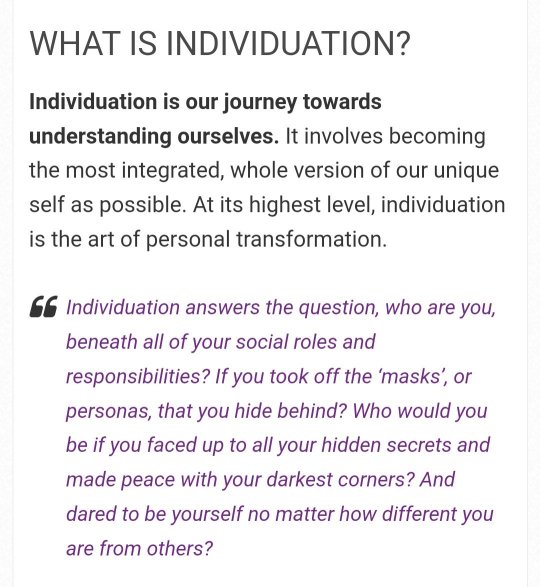
A personal "Merger" of sorts in Jjk's context and i believe Megumi's arc had already been foreshadowed in chap 47 through the introduction of 'Totality'. The 2 divine dogs represent the dual aspects of Megumi's Self. The White Divine dog is the Ego or Persona, first the ego dies but it doesn't disappear , it dissolves into the existing shadow (Black Divine dog), merging with it to create the 'whole' of SELF 'with no boundaries' between the Ego and his Shadow (Fate)
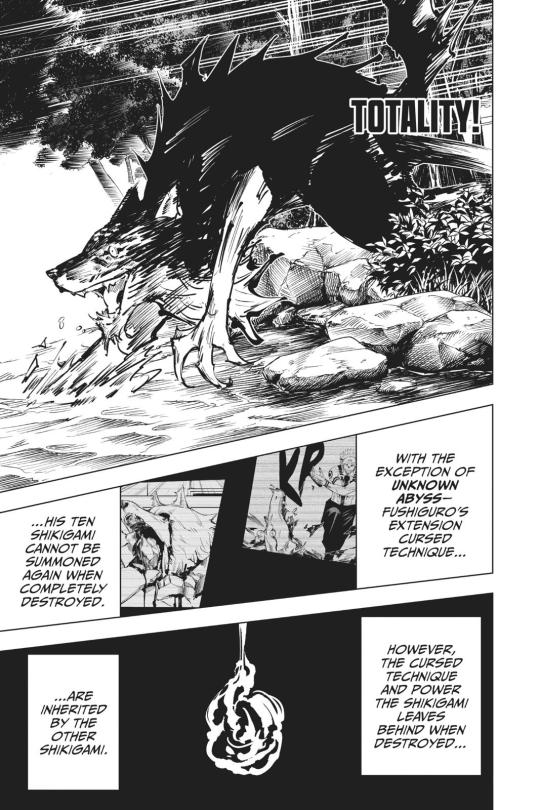
Totality (Individuation or merger of Persona and Shadow)

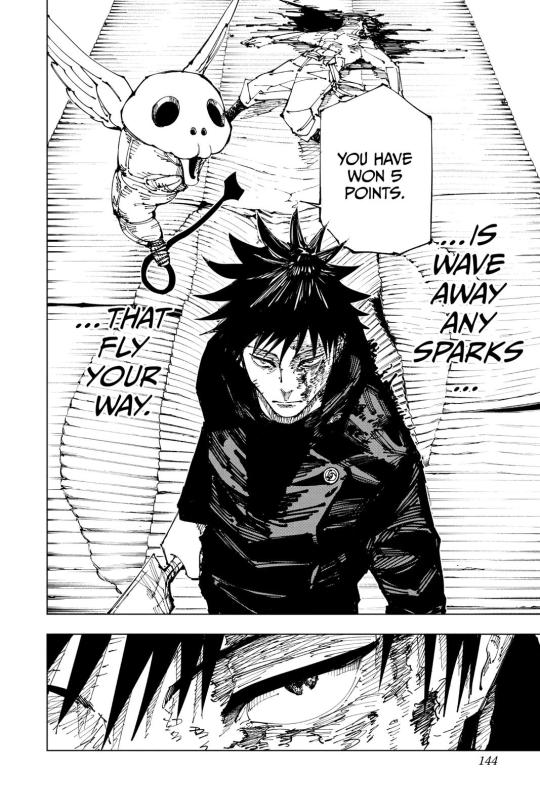
Ego death The shadow self
In order to find his life , Megumi first needs to lose it. He needs to bring forth his Deepest shadows and stop suppressing them because the True self is not Black and White, it's a hint of Grey. It's not just Tsumiki or Yuji who are good and pure , His own shadow that he deems evil has purity as well
This personal merger is the route to 'Love' , Love of the self. To stop ignoring the inner child and his own shadow that Megumi has suppressed constantly . To stop looking for Logic behind everything as he is a human, we value our feelings, they are our fuel.
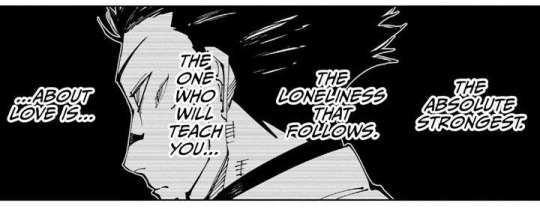
The dormant feelings that need to be realized and this is where Yuji comes in. When he says he wants to save Megumi , it's not because of Megumi's value or his technique, it's because he genuinely cares about who Megumi is and wants him to grow out this personal nightmare.
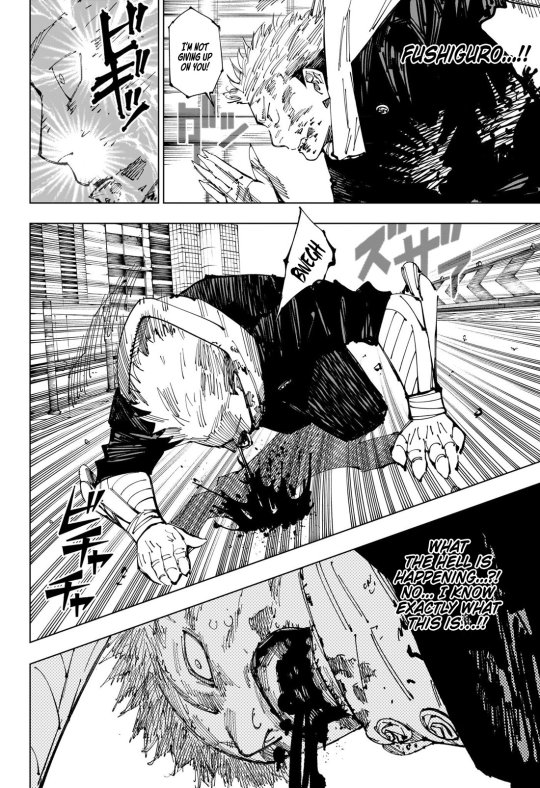
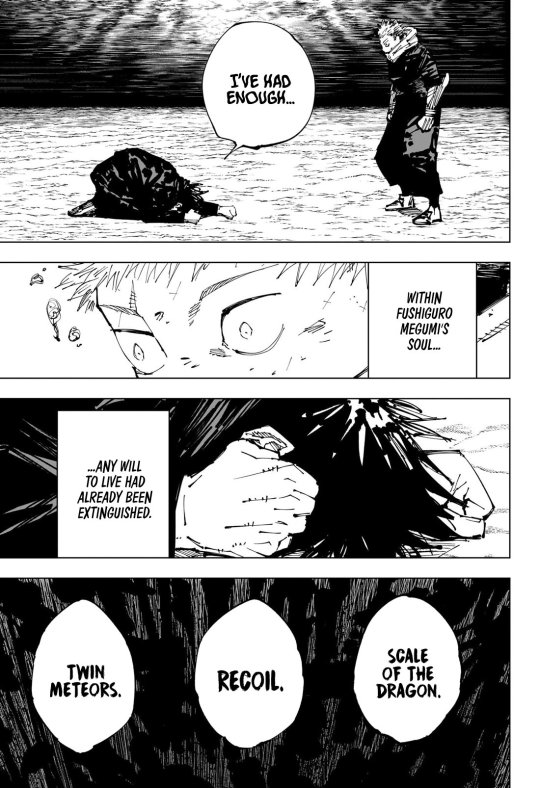
This can lead to Megumi conversing with his shadow and realizing that people do care about him and he needs to show the same care to his shadow and let it invoke the feeling within him
Ultimately Megumi is a product of this 'cycle of curses', being the son of Toji who was himself deeply traumatized and Gojo being his guardian who himself was never whole.
Gege always tries to explore the Self, the person that was Satoru Gojo, the person that is Megumi Fushiguro, not "the Strongest" or "The wasted potential"
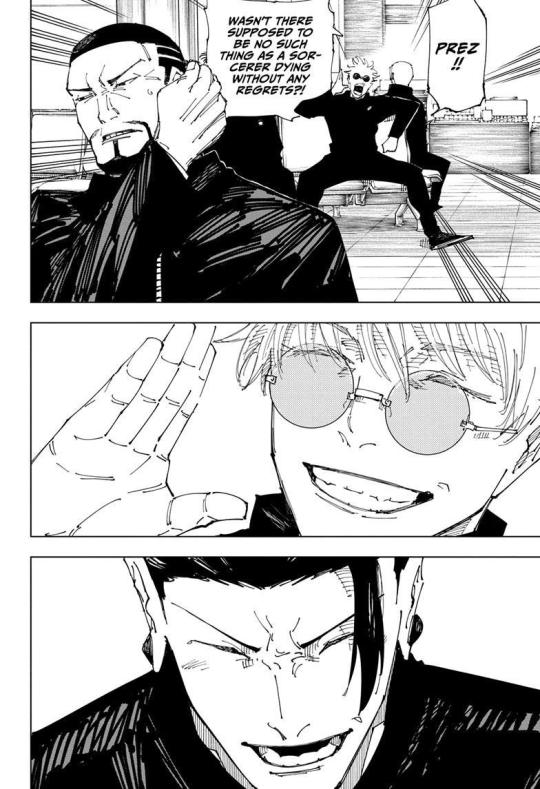
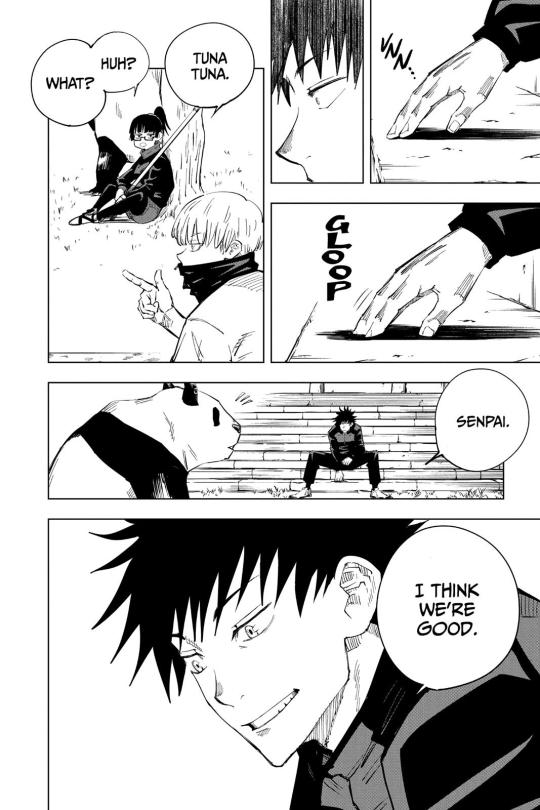
This is why I think Gege has masterfully constructed Megumi's character in a real subtle manner. He never really talks about himself or how he feels and that leads to a big chunk of the fanbase paying no attention to who he is as a character and only focusing on his potential which is Megumi's EXACT problem.
What's interesting is that i always thought of this sort of individual merger for Megumi's arc but now he holds the keys to the completion of the merger between Tengen and Non Sorcerers in Japan as well . Gege always knows what he's doing !!
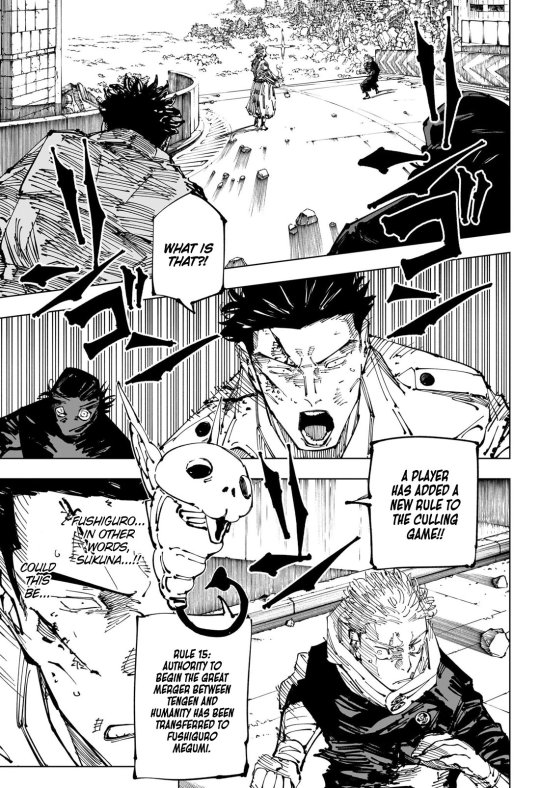
80 notes
·
View notes
Text
ohhhhhhhhh snap and holy smokes, there’s a lot in the short amount of text in this chapter!
1. First, Sukuna knows/recognizes/understands Yuji and what he is and where—rather who—he comes from
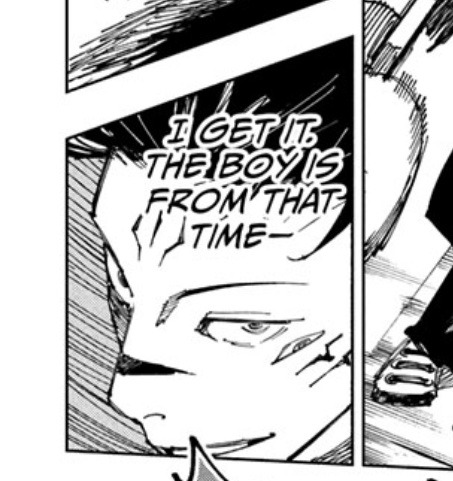

I guess since Yuji was his vessel he wasn’t able to get a full understanding of Yuji’s lineage and him being Choso’s little bro as a cursed womb painting, but now that he’s out of Yuji, he can see it all—and whew he wasn’t quite ready for it. Right before this, Sukuna was kinda puzzled by Yuji’s strength…and then he realized. He recognized that Yuji is potentially a product of what I affectionally call Kenjaku’s asshole era (though he has a couple of those) and knew Kenjaku has something to do with Yuji. Which brings me to the second thing
2. He, Ryomen, the ‘King of Curses’, Sukuna, is disgusted (or at least grossed out) by Kenjaku’s actions
Apparently Sukuna has a line that even he won’t cross and Kenjaku crossed it (and apparently crosses it frequently since he said grossest things, which implies Kenny does gross shit all the time or at least on a regular enough basis that he knows the horrible history). Sukuna maybe said it with a touch of admiration, but mostly it read in a way that was like, as messed up as he is himself, there’s things even he won’t do, and Kenjaku is the type to do them—
Which is wild to me, because you have to do some really messed up things for the King of Curses to say you do gross things. And we know Kenjaku is bad and he’s done messed up and gross things but like dude is apparently even worse than what we know, and has done things so incredibly awful and obscene and horrible that even Sukuna is like yikes.
I’m rambling but whether his comment is in admiration or disgust or a bit of both, it’s clear from Sukuna’s words that Kenjaku is worse than him. Which, while I’m comparing Sukuna and Kenjaku, brings me to the third thing.

3. Megumi is pulling a Suguru and is taking back control of his body
Kenjaku may be using Suguru as a vessel, but during Shibuya he tried to regain control for a brief second after Satoru tried speaking directly to Suguru (remember the whole, you’re just gonna let him use you like that comment and Suguru’s movement against Kenjaku’s wishes?). The same is happening with Sukuna to Megumi, except since Megumi is still alive he’s fighting back harder than Suguru’s residuals. And he’s fighting so intensely that he’s impacting his energy output so he can’t attack Yuji as hard as he wants.

Megumi said ‘not today’ and Sukuna, for what it’s worth, kinda doesn’t seem too mad about it. And I wouldn’t be surprised if he was expecting him to fight back. After all, he’s against Megumi before and knows what he’s capable of (kid’s a Zen’in after all) and what he’s like when he’s in fighting for his friends, but especially Yuji.
idk I’m rambling but whew this chapter had some interesting points and I’m tagging in my friend @theanimepsychologist in case I missed anything, but I can’t wait to see what comes next
#jjk#jjk 214#jujutsu kaisen#yuji itadori#Sukuna#megumi fushiguro#ryomen sukuna#jjk manga spoilers#jjk analysis#jjk thoughts#idk i’m rambling#kenjaku#ryoumen sukuna#fushiguro megumi#jjk meta#yuuji itadori#itadori yuuji#jujutsu kaisen meta#jujutsu kaisen manga
421 notes
·
View notes
Text
Choso - The Heart of Jujutsu Kaisen

Jujutsu Kaisen portrays a long list of interesting characters, each with important roles to play within the story, but amidst them all there is one character who lies in the very centre of the story’s core themes, and that is Choso.
Choso is introduced in Jujutsu Kaisen as a seemingly unimportant character with his only purpose to be a mere obstacle that the jujutsu sorcerers and Yuji need to overcome, very much like one of the many generic cursed spirits present in the story. This idea is driven further by his two brothers Eso and Kechizu, who were introduced only to be swiftly and unceremoniously killed off by Yuji and Nobara.
The natural path for Choso’s character at this point was simple and predictable, a basic revenge plot against Yuji for killing two of his younger brothers. However, the entire assumption of Choso’s purpose in the story was flipped on its head after the big twist that Choso is in fact a distant blood relative of Yuji. Choso’s innate cursed technique is blood connection, so upon being given the chance to finally kill Yuji after beating him in their fight, he decides on a whim to refuse as a result of his mind, body and soul sensing something wrong when he prepares to kill Yuji.
After walking away and spending time alone to ponder the meaning behind his unexpected connection to Yuji, he realises the truth that both he and Yuji are born experimentations of Kenjaku (known to him as Noritoshi Kamo at the time). After this, Choso’s alignments shift completely, deciding to ally not only with Yuji but all of the jujutsu sorcerers who were previously his enemies. He even goes so far as to completely forgive Yuji for killing his two brothers as he now understands that Yuji was simply ignorant of the truth, just like himself.
The whole purpose of Choso’s character is that despite the extremely unfortunate circumstances of his existence as a cursed human hybrid born from malicious experiments, with every reason to lash out at the world for causing his suffering, he still chooses to care for others. Choso currently being the only living cursed human hybrid in the story is also symbolic for him being the mentally healthiest character who understands both sides of the conflict.
Choso bears no ill will against humans, sorcerers or cursed spirits. This is implied early in the story while he was still aligned with the curse group as unlike the rest of them (Kenjaku, Mahito, Jogo, Hanami and Dagon), Choso was completely uninterested in killing as he had no personal investment. Choso chooses to fight only against the things that threaten him and the things he cares about, just like any other healthy minded person.
Despite his introduction as a background character who also possesses an unremarkable level of power within the context of the story, Choso is actually one of the most spotlighted characters in the story’s narrative. He has been shown in several long and intense fights where he pushes himself to the limit time and time again to fight for the things he cares for, often surprising much stronger characters in the story who belittle him. Choso parallels Yuji in this way for being his only distant blood relative to be shown in the story. Both of them are constantly looked down upon by their enemies including their own parent Kenjaku, as well as Sukuna.
Jujutsu Kaisen’s core themes revolve constantly around the struggle of making selfish or selfless decisions and Choso is the one character who is closest to achieving balance between these two extremes, being the only one who can’t be distinguished between a human or a cursed spirit. Choso is the character who wears his heart on his sleeve. Or in this case, his blood.
#jjk#jjk meta#choso#jjk choso#yuji itadori#kenjaku#jujutsu kaisen#jujutsu kaisen meta#jjk 206#so it's the first time i've posted in like 5 years or something#so that's cool
406 notes
·
View notes
Text
i saw an incredible post on tiktok and i wanted to expand on it, because it's genuinely amazing. all the credit to @noesbf on tt for the idea that inspired these thoughts.
geto's character is threaded through with motifs of consumption. he takes things in, whether they be curses or daughters, and is spurred by intense empathy that ends up going in the "wrong" direction once he takes the entire jujutsu world under his wing.
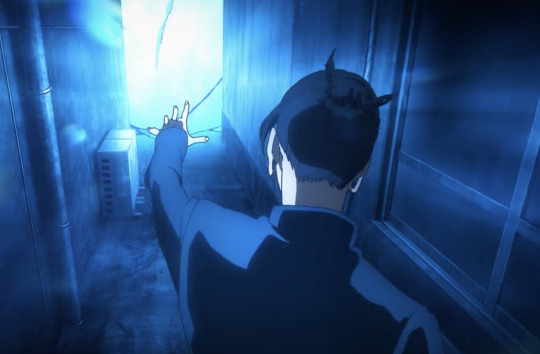
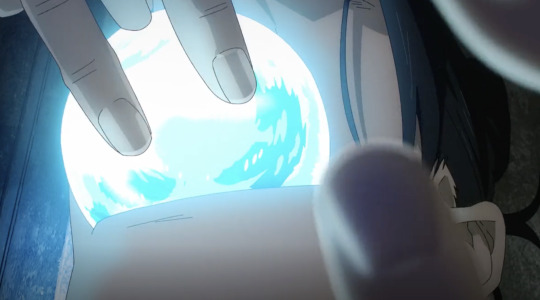
when we're introduced to him in hidden inventory, our first glimpse is of him consuming a curse. he's also alone, in a dark alleyway, a symbolic image that parallels his journey throughout the story. he's a consumptive force, a facet of his being that ultimately leads to his undoing because he consumes the responsibility of "saving" the strong, who are burdened by the weak.


gojo, on the other hand, repels. he's an outward force, extending out a physical barrier that creates distance between his body and the world. where geto invites, gojo rejects. their abilities are constructed as diametrically opposed to one another's.

through the motif of gojo's abilities, this image captures their consume/repel dynamic in a singular shot. after riko's death, gojo leans into red, which repels. he focuses on growing stronger and in doing so, isolates himself from the world (and subsequently, geto). on the other hand, geto leans into blue, which aligns with the consumptive nature of his character. he harbours riko's death inside of himself and it festers, like a curse.

black holes are all-consuming vacuums. they subsume everything around them and create an inescapable vortex— once you're pulled in, you're never getting out. it will literally eat you and in doing so, makes you an everlasting part of it.

white holes, on the other hand, function in opposition to black ones along the same axis. where black holes pull, white holes push. nothing can enter them; they're doomed to a lonely eternity because of the force that holds the universe at a distance. nothing outside of it can affect what goes on within, yet it affects everything around it.
however, white holes can be subsumed by black holes. while nothing can enter them, if a white hole were to cross paths with a black hole, its consumptive force is so powerful that it would eat them too.

after geto and gojo experience a rapture in their relationship, gojo withdraws from the world, holding everyone at a literal and figurative distance. yet, even while he's alone, he's endlessly drawn towards geto. his eyes are bound but his soul isn't— it's tied to the piece of him inside of someone else, and gojo visibly feels the pull.
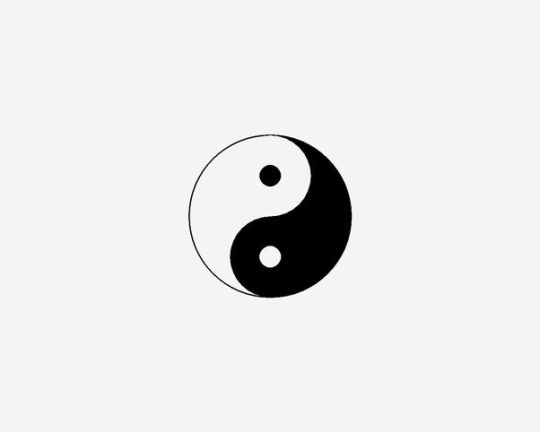
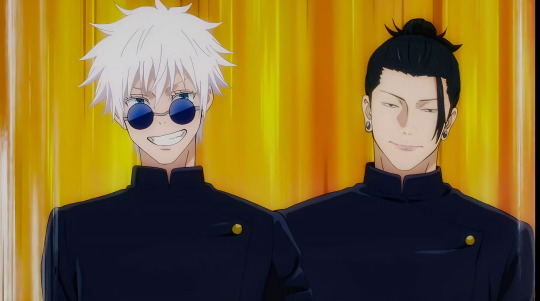
white/black holes also correspond to the colours associated with gojo and geto's characters (they align with their yin/yang dynamic, where yin (black) symbolizes darkness & the moon and yang (white) symbolizes light & the sun).
yin/yang are more than two halves; they form an indivisible whole. they become one another: light turns to dark, the moon replaces the sun in the sky, life transitions into death only to be born as life again.
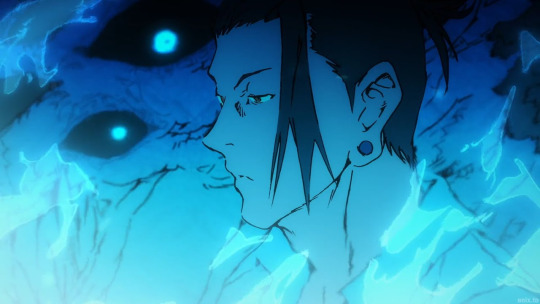
if two celestial bodies exert oppositional forces upon each other, they function in equilibrium. geto's consumption was growing alongside gojo's repelling, reaching an event horizon when he took the lives of 112 villagers and forcing the two of them out of equilibrium. he continued to consume (curses, money, vulnerable people through his cult) until he died and took gojo's soul with him.
consumption can only exist if there's a repellant force pushing back. geto and gojo are not opposites, instead, they each contain the other— every yin has yang within it and vice versa.
they are borne of each other, they are unknowable without the other. they are more than matching; together, they are complete.
#my jjk meta#this is kinda all over the place but hear me out lmfao#jjk meta#jjk#satosugu angst#satosugu analysis#satosugu meta#jjk angst#jjk analysis#gojo and geto#gojo angst#gojo analysis#stsg angst#stsg brainrot#stsg#satosugu#gojo satoru#geto suguru#satoru x suguru#geto#gojo#jujutsu kaisen meta#jujutsu kaisen analysis#jujutsu kaisen angst#jujutsu kaisen#geto angst#geto x gojo#gojo x geto#jjk gojo#jjk geto
1K notes
·
View notes
Text
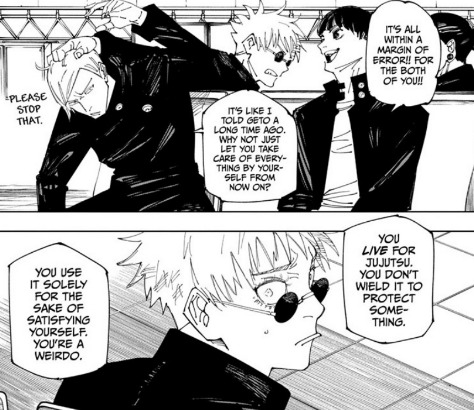
GREAT TEACHER, GOJO
For my final commentary on chapter 236, I thought I'd talk about this panel the starter of a million flame wars on twitter dot com. The big controversy is Nanami stating that Gojo fought only for himself without mentioning his students which a lot of people thought was a last minute reversal on Gojo's character, or character regression.
I'm not going to call anyone stupid, or say if you have good teacher Gojo headcanons you're wrong. However, I'd like to point out that Gojo's always been more complicated than most shonen mentors. He's not Kakashi, and he's not Aizawa, and I'd argue the fact that he's not the standard "I'd die to protect my students" mentor we see in shonen manga is what makes him interesting.
The Springtime of Youth
Jujutsu Kaisen is a shonen jump manga that is very aware of the other manga that are running in the same magazine and uses that awareness to play with audience expectations.
To put it simply if you don't want to use words like Deconstruction - if you're reading Jujutsu Kaisen then things are probably not going to go the way you expect them. It's not Naruto, it's not My Hero Academia, it's a little bit like Bleach except characters actually die.
If you expect things to go one way in Jujutsu Kaisen, then you're going to be thrown a curveball. To name some examples briefly before diving into Gojo.
Yuji Itadori is a normal boy protagonist suddenly dragged into the world of the supernatural.
However, everything goes wrong from there. Jujutsu Sorcerers are not heroes. Yuji is told that much from the beginning by Megumi within the first thirteen chapters. The world of Jujutsu Sorcery is not a good place to be, Yuji is initially excited to be a sorcerer and to be a part of this world and then learns that lesson fast. I mean, imagine if Deku was accepted to UA, and then he immediately learned that students at the school die on the regular and all the adults are either terrible selfish people, or if they're not they die too like Nanami because being selfless means sticking your neck out for someone else.
Yuji's not really special in the narrative. He's just a kid who swallowed a finger. He doesn't have a secret technique. We're hundreds of chapters in and he's still just punching people. If he's cornered in a fight he doesn't unlock a secret technique either, he just loses.
Yuji has a superpowered evil side, like the nine tailed fox, or Hollow Ichigo except it's not really his super powered evil side. It's an evil parasite attached to his soul with a will of its ownt hat will manipualte him. Hollow Ichigo and the Kyuubi can escape temporarily and there's usually no consequence. Sukuna escapes twice, the first time he nearly kills Megumi, the second time he kills thousands.
Yuji is kind of like a main character who is not a main character.
If you still believe he's the main character, then you can agree he's punished for thinking he's the main character and therefore things are going to be easy, because nothing is ever easy in Jujutsu Kaisen.
Megumi is a riff on the chosen one. He's supposed to be the Gojo Satoru of his generation, born with the strongest technique that ca even surpass the limitless and he's nowhere near the level he's supposed to be. This is because Megumi has been continually failed by every adult figure all his life, starting with his father who sold him, then Gojo the man who SAVED* him techically but with a big asterisk that he needed to become his student and do jobs for Jujutsu High School otherwise Gojo would just let the Zen'in take him or let them starve I guess. Megumi has no adult figures to rely on, and has been given very little freedom about who or what he wants to be in his life, and therefore he's a very passive, repressed individual who's riddled with insecurities. Megumi doesn't want to be the strongest like Gojo, or like many hero / rival characters in shonen manga. Megumi doesn't even know what he wants to be, because he's never been given any choice in life.
If you don't think Megumi's a deconstruction of any sort of character type, look at those posts on twitter that are like "Look at the black haired depressed shonen boys" and then look at Megumi, he's never actually like any of these boys because he's much deeper and probably closer to being the main character than Yuji is.
Then we get to Gojo who is very unlike all the other mentors in shonen manga.
If Yuji and Megumi are both riffs on a main character, a hero in a world so cynical he's not allowed to play hero and actively punished for it, and a chosen one who doesn't want to be the chosen one then you have Gojo as the mentor who's nothing like the classic mentor.
The problem with mentor characters in fiction is that number one they die a lot (spoiler warning Obi Wan Kenobi dies in Star Wars just so you know) and number two they're not usually the most complex character in the cast.
What is the mentor there for?
To Mentor (duh.)
What this means is they are usually a fully formed adult who can teach a lesson to the main character, who in shonen manga is typically a teenager.
I say they're usually less interesting because stories are about characters changing, or characters learning lessons. A teacher presumably already has learned his lesson. They are usually at the end of their journey and not the beginning, that's why they can offer wisdom to the main characters. They're not usually their own separate characters because of this - a narrative doesn't have time to waste on a character that's not going to change.
Jung had a term for this character, it's called the Wise Old Man.
In Jungian analytical psychology, senex is the specific term used in association with this archetype. Examples of the senex archetype in a positive form include the wise old man or wizard.
In the individuation process, the archetype of the Wise old man was late to emerge, and seen as an indication of the Self. 'If an individual has wrestled seriously enough and long enough with the anima (or animus) problem...the unconscious again changes its dominant character and appears in a new symbolic form...as a masculine initiator and guardian, a wise old man, a spirit of nature, and so forth'.
The role of the wise man archetype is to help other people along with their ego development, because usually they are already fully developed individuals.
Obi Wan is the most typical of typical mentors, and he dies in Star Wars because after he finishes teaching Luke he has nothing to do. This is Luke's Hero's Journey. Obi Wan's already happened offscreen, he's at the end of his journey there's no room for change or growth in him because his story purpose is to exist to advise Luke and to do that he needs to be a fully grown adult figure.
The subversion to this when the mentor has their own agenda (Gandalf), or the mentor is as flawed as the main characters themselves and so therefore he has something to learn.
Gojo is kind of a combination of both, like Gandalf he is the mysterious but seemingly all powerful wizard (er... or rather sorcerer) with his own agenda, and he's also practically the fourth member of the main cast who are otherwise all teenagers. In fact, Gojo spells out his agenda in the same panels that everyone uses to constantly assert that Gojo is a good teacher who only wants to protect his students.
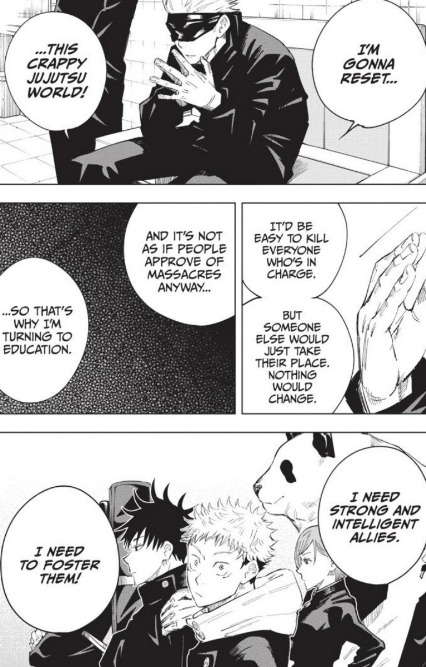
He wants to make the Jujutsu World a better place (good) which is why he is raising students so he can turn them into his political allies to make a regime change (hidden agenda).
It's a means justifies the end type scenario. In Gojo's mind the means (raising kids as tools in support of his political agenda) justifies the ends (a better jujutsu world for those children). His motivation is still the same. This is what I think people most often get confused about with Gojo's character. I think he is one hundred percent genuine about wanting a better world.

"I have a dream, I want to reset this crappy Jujutsu World" is his motivation, but not his means. He uses his students as a means to achieve that end. Even if it's purportedly for their sake, he's still using them. I don't even think this is subtext it's text, both Megumi and Yuji call themselves cogs.
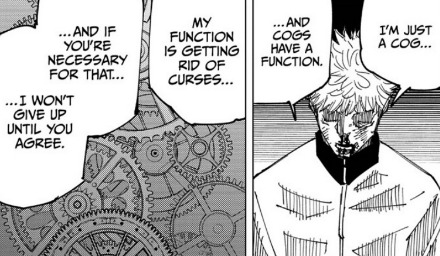
"But senpai, what's your function...?"
You could say in this case that the ends don't justify the means. Is Gojo really protecting these kid's youth, if Yuji and Megumi are going around calling themselves cog and acting like they don't matter in the grand scheme of things? In fact the narrative is inviting you to question if Gojo's ends justify his means.
Gojo's ideals can be one hundred percent real, but he can also pick faulty ways of choosing those ideals that fail to live up to them. In fact most people fall short of ideals, that's why they're called ideals. Gojo is taking these kids in because they have strong potential as sorcerers and he wants to recruit them, that's his hidden agenda. It's confirmed in databooks in Yuji and Yuta's case, and even if you don't trust databooks as canon then look at how he treats Megumi.
Megumi is explicitly Gojo's student, not his son. He only intervened in Megumi's situation on the caveat that Megumi work for him. Presumably, if Megumi didn't want to be a sorcerer and just wanted to be a normal kid, Gojo would have either let the Zen'in have him or do nothing. The option of just calling child services and getting someone to foster Megumi until he was older didn't even seem to cross Gojo's mind. There's the help he gives (Food money, rent, protection from the Zen'in) and then the hidden agenda (Don't work for the Zen'in who are my political rivals, you're my student now).
Yet at the same time Gojo is shown going to find Megumi after Geto's defection, probably because of the words he said to Yaga "You can only save those who want to be saved," when he realized it was too late for Geto. Was he intervening earlier for Megumi because he learned from being too late with Geto? Did he think Megumi needed guidance, or did he think Megumi needed protection in his youth so the Jujutsu World wouldn't corrupt him like it did Geto, or did he think he just needed to make it so Megumi was strong so he wouldn't fall behind him because Geto fell so far behind him once Gojo became the strongest. There's ambiguity there, because the hidden agenda is you know... Hidden. That's what I mean with Gojo though, you can look at him from multiple angles, he's not just (I love my students I'd die for them) because that character would only have one purpose in the narrative and that'd be being the perfect mentor who teaches them all the right lessons.
Gojo's not like other mentors, and in fact he's a commentary on the mentors that everyone is always comparing him to and expecting him to be like.
Literally everyone who reads Naruto has the exact same response, "I hate how the manga never talks about how it's a bad thing to send these child soldiers into war, and nobody breaks the cycle."
There are a lot of people unhappy about the same thing in My Hero Academia, "Why does nobody talk about how wrong it is that the adults make these high school students fight on the battlefield."
Well there you go. That's Gojo. His dream is to make it so Jujutsu Society is a place where teenagers can survive until adulthood. His method of doing so is to... raise those teenagers to be stronger than the previous generation, but you know still letting them be child soldiers on the battlefield just stronger ones. He does this because if he's working within the system the his two choices are raise a group of people who can age out and replace the old regime, or just kill everyone at the top.
Everyone complains about how no one talks about the child soldiers in Naruto or My Hero Academia, but here you go, we have a manga that is centered around how messed up it is to send high school students to continually fight these curses before they even turn eighteen. Gojo's sending these kids out there still even if he wants to change things, and it's supposed to be a little messed up and also a contradiction to what his ideals are supposed to be.
Because in My Hero Academia you have characters like Aizawa and Kakashi who are "I will die for my students" but then they just send those teens out to fight in a war, and seem totally fine with that. It's a hole in the writing, but this time it's done on purpose, to ask why these adults are always comfortable sending teenagers out to fight for them?
Jujutsu Kaisen provides two answers, number one the system is inherently corrupt and it sees the youth as cogs because the system is rooted in traditions that keep the elderly in power. Number two, in Gojo's case at least this is exactly what it was like for him growing up as a child. Gojo is just repeating with his students what was done to him, subconsciously.
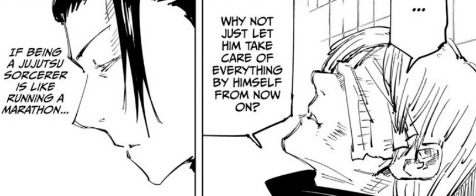
The reason Nanami said this, and then repeated it in this most recent chapter is Gojo was born to be a Jujutsu Sorcerer. Being a Jujutsu Sorcerer is a highly deadly occupation for everyone else, except for Gojo. Not only that but because he's so good at it, and he's so lauded for it he's built his entire identity around it. Nanami's not just saying that Gojo is selfish, he's also saying that Gojo thinks being a sorcerer is a good thing. It is the end all, be all of Gojo's existence.
He doesn't want to make it so sorcerers don't have to fight, or make it so all cursed energy is gone for the world like Yuki Tsukumo, his dream is actually kind of limited in scope he doesn't want the school days of his students to be destroyed by the outside world the way it was for him and Geto.
Gojo looks at the symptoms and not the cause. Geto defected, Haibara died, Yaga wasn't really able to do much for his students in both scenarios. Gojo deduced it was because the elders and regressive policies were holding people back in favor of keeping the regime in charge (correct) and that because of that the sorcerers in Gojo's high school years just weren't strong enough to keep up (this is just what Gojo thinks).
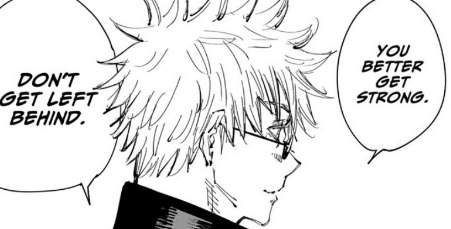
His words to Megumi are encouraging him to be strong so he won't get left behind, which as I speculated above might imply Gojo thinks that part of what went wrong with Geto was that he simply wasn't strong enough to keep up with Gojo or stay on his level. If not then he still encourages Megumi to get strong before everything else, he's not taking care of these kids emotional needs, he's pushing them to get stronger because in Gojo's mind that's the be all end all solution to every problem.
"Nanami's line was not saying that Gojo doesn't care about children, it's saying that "You live for Jujutsu." It is the lens through which Gojo sees everything, and so therefore he doesn't think of breaking kids out of the Jujutsu World, just making it a place that's slightly more safe for them. Gojo's ego is so strong that he only ever sees things from his point of view, being a sorcerer was fun for him, his high school days were the happiest time in his life before they got ruined by outside forces.
He's trying to protect those days for his children, but he's not arguing against the existence of an institution like Jujutsu High in the first place. He's not saying the teenagers should never be sent out on missions, he's saying we need to make the teens stronger. If they're stronger than they won't die (that's probably true but they'll be even safer if they don't have to go on missions in the first place).
Now we have a reason! Why do Aizawa and Kakashi send out child soldiers into the battlefield if their goal is to protect their students? Because it's a shonen manga and the main characters are all teenagers.
Why does Gojo send out teenagers to fight for him if he wants to protect them, well I just explained it.
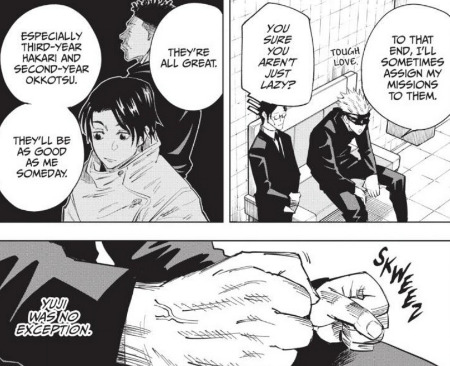
In fact, the entire purpose of Nanami in the story is to give us a character who explicitly treats children like they are children and not miniature adults. Who acknowledges that this is emotionally hard for children to deal with and they shouldn't have to do that.


Nanami's lines of "I'm an adult you're a child" and "Being a child is not a bad thing." would not have the weight they carry if they weren't so different from the way that every other adult in the story (including Gojo) treats children.
Nanami and Gojo have the same goal of making being a Jujutsu Sorcerer easier for children, but Nanami practices what he preaches. He tells Yuji to stand back and that he doesn't need to fight if he sees an enemy that's too strong, to let the adult on scene handle things first.
When he sees that Yuji is disturbed by the idea of killing former humans that Mahito had changed with his technique, he consoles him. He knows that Yuji is a sensitive kid and tries to spare him as much of that grief as possible. When he leaves Yuji behind he tells him explicitly that he's the adult in this situation, he shouldn't be forcing a child to help carry that burden if it's not necessary.
He also explicitly tells Yuji that being strong or jumping into life threatening situations =/= as growing up. Nanami is a character aware that the problem isn't that the children are not strong enough, but that too much responsibility is being thrown on these children. That there is a difference between what children and adults are emotionally capable of. Gojo doesn't see that difference because he reached enlightenment as seventeen. He even explicitly chose Nanami because Gojo knew he wasn't good at that stuff.
Nanami was not saying that Gojo doesn't care about children, Nanami was saying Gojo lives to be a sorcerer, Gojo who loves sorcery doesn't understand why being a sorcerer is too much of an emotional burden on a child. He just doesn't. He literally says his students are flowers.
Now, here's the kicker. Nanami dies.
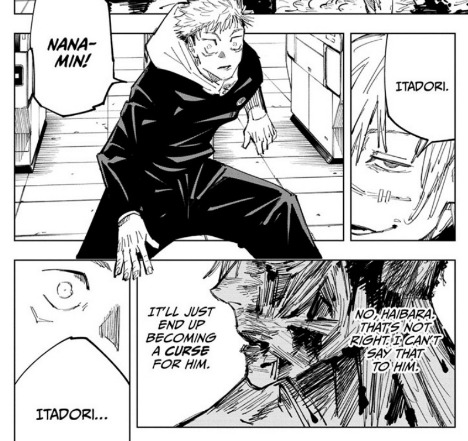

Nanami wanted Yuji to not take on too much responsibility, and he died leaving Yuji with more responsibility than he could ever carry. Nanami failed in his goal, despite the fact he is the most responsible and well-meaning adult in the story who treats children like they're children.
The reason he dies is because this is what happens to people like Nanami in Jujutsu Society. The whole of society is built to condition people into being cogs and Nanami who's just one person can't overcome it on his own. I can write a whole meta on how Nanami's way of dealing with children is way better than Gojo's and yet they do essentially the same thing, throw way too much responsibility onto Yuji even though he's just a kid. They're both too ingrained in the system to make any sweeping changes, and that's why the child soldiers keep on child soldiering.
Gojo as a Character
The second reason as eluded above that Gojo is not meant to be read as a perfect teacher, or even a good one really is because he's the fourth main character of the cast. If you are a main character, then you need a flaw, and an arc where you either improve upon that flaw or you succumb to it in tragic fashion.
Gojo's not the perfect adult mentor, because he's kind of in the same place as the kids themselves. I think there's a reason we never learn anything about Gojo's backstory, we know nothing about his parents, the Gojo clan, because those details aren't as relevant. The most important thing about Gojo is the three years he spent at high school, because that was the only time he felt like a person, and also because he is trapped there mentally.
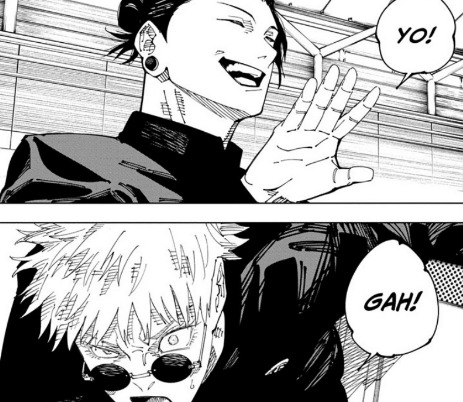
There's a reason that Gojo's dying dream is him imagining everyone reset to seventeen years old, because that was where the clock stopped for him in his youth, and that was where all of his regrets as an adult come from. His motivation to help teenagers today only comes from his own youth being ruined, and the adults in his life failing to protect him.
It's very likely that Gojo who lives for Jujutsu probably would never have realized the problems in his current society, if his youth wasn't ruined by those same adults he's now fighting against.
The reason most mentor figures in fiction are not main characters is because as adults they don't really need to grow up anymore. The obvious solution is that you just need your mentor character to just fail to be an adult in some glaring way.
To show how Gojo falls short as an adult, especially in regards to these children and how he treats them is to drag him down from all powerful, all knowing wizard, and make him struggle with the rest of the main cast. Gojo is not a positive adult figure in these kids lives despite having the best of intentions, because he's not really an adult.
I guess if you were already the best and strongest person in the world at seventeen, smarter and more capable than all the adults around you, you wouldn't really feel the need to grow up. Coupled with the fact that you are alienated from other people and do not relate to them on a personal level that's not going to help with your identity formation.
I mean I constantly compare Gojo to Superman, but to be fair to Gojo instead of bullying him like I usually do Clark Kent was raised by parents who raised a boy not a superman, and who constantly tell him that he's just a normal person, his powers don't make him great, it's his heart.
Nanami says that Gojo only fights for himself that ""You don't wield Jujutsu to protect something, you use it solely to for your own sake. What a weirdo" it's likely Gojo only fights for himself because he's never ben told that's he's more than just the six-eyes and more than just the limitless.
The best way to make a mentor a part of the cast, is to make them through some way or another have failed to grow up properly in their youth and therefore they need to do it while the story is taking place. We know how Gojo failed, his springtime of youth ended early, it ended the day he couldn't stop Geto from leaving, the day he can be the strongest sorcerer ever and still fail because sorcerer society is too corrupt for one person to handle alone. We also know he didn't really grow up past this point, because he still thinks the solution is to make people be stronger. Why does he not do anything about Geto for 11 years? In story terms he's basically suspended in time unable to grow past Geto. Kenjaku literally uses the trauma from his youth and the memories that seeing Geto alive would provoke in Gojo again, to trap him because he knew it would make him freeze up. Gojo is frozen in the past, he failed to grow up in story terms and must now grow up while the main story itself is taking place along with the children he's trying to raise.
This is how you make a mentor interesting. You have to make them flawed in some way that makes it worth having them onscreen, because a perfect mentor only serves one purpose to teach a main character and then he's gone.
Dazai Osamu from Bungo Stray Dogs is a character that's almost as massively popular as Gojo. Similiarly, he is a teenage genius who found trouble relating to other people who is now as an adult attempting to mentor two children.
However, Dazai's faults as a mentor are made much more explicit.
Dazai suddenly punched Akutagawa in the face, preventing him from finishing his sentence. Akutagawa flew back onto the ground, his head bouncing off the stone flooring with a thud.
"Perhaps I made it look like I wanted to hear excuses. Sorry for the misudnerstanding," Dazai said while rubbing his knuckles.
"Urg..."
Akutagawa moaned. He'd hit his head so hard that he couldn't even stagger to his feet.
"Give me your gun," Dazai ordered one of his men. The subordinate was hesitant but nonetheless handed over his weapon. Next, Dazai removed the magaine from the automatic pistol, took out all but three bullets, then put the magazine back in. He immediately pointed the gun at Akutagawa, who was still on the ground.
"I have this friend who's supporting several orphans all on his own, you see," he continued his weapon still drawn and aimed at the boy. "AKutagawa I'm sure Odasaku would've been patient enough to give you the guidance you needed had he been the one who'd found you on the brink of starvation right in the slums. That would have been the 'right' thing to do. But 'righteousness' doesn't take very kindly to me. And there's only one thing people like me do to useless subordinates."
Dazai mercilessly pulled the trigger the moment he finished his sentence.
(Don't worry, Akutagawa lived). Dazai is a character who had a troublesome youth he never grew up from. He was too smart for the world as a kid, and because of that joined up with the mafia because he wanted to feel like he was more connected to life and other people by getting closer to death (weird dazai logic I know) and was the best of the best at it, but it only drove him further away from people. He makes one friend, and loses that friend similiar to Gojo. Just like Gojo too, that friend is the one who gives him his purpose as an adult that drives him to mentor young people.
"Odasaku.. What should I do?"
"Be on the side that saves people," Odasaku replied, "If both sides are the same, then choose to become a good person. Save the weak, protect the orphaned. You might not see a great difference between right and wrong, but... saving others is something just a bit more wonderful."
Is this not what Nanami said just in different words. Odasaku tells Dazai point blank, I know you're selfish, I know that you don't really have any concept of good or evil but you can choose to save others anyway.
Isn't this what Gojo does?
He is selfish. He doesn't really consider the morality or his actions or get hung up on the idea of protecting the weak like Nanami or Geto do, but he still does go out of his way to live for the ideal of saving children.
Both Gojo and Dazai are characters who are struggling with this ideal of saving the children, because while their ideals are good they themselves as people are morally gray. Adding onto that, they're also children and a good deal of their backstory is devoted to showing why they never really grew out of the mindset that they held as children.
The story doesn't call them horrible monsters for it, it's just saying that they need to grow up or face the consequences of not growing up.
"I have one regret," I said. "I never got to say good-bye to my friend. He was always there for me as 'just a friend.' He was bored of this world and always waited for death to come for him."
"That man was in search of a place to die just like me?"
"No, not exactly," I answered. "I thought you were similiar to Dazai at first, rushing into battle and wishing for death without even considering the value of your own life. But he's different. He's sharp-witted with a mind like a steel trap. And he's just a child - a sobbing child abandoned in the darkness of a world far emptier of the world we're seeing."
He was too smart for his own good. THat was why he was always alone. The reason why ANgo and I were able to be by his side was that we understood the solitude that surrounded him, and we never stepped inside it no matter how close we stood. But in that moment, I kind of regretted not stepping in and invading a little.
Does that sound like the narrative is condemning Dazai for being who he is? No, it's Dazai's best friend offering empathy and understanding for how lonely it must be, and how if Dazai made real connections with people then he could have a chance of growing up like everyone else. That's what the narrative challenges Dazai to do while empathizing with why it's harder for him to and why he's still trapped in his youth, because to take care of children you need to be an adult yourself. Otherwise if you're a child, and I'm a child, then nobody's driving the plane.
Rupert Giles from Buffy the Vampire Slayer is another mentor who faces the same moral dilemna that Gojo does. In fact his entire character revolves around the fact he knows deep down he's sending a kid to her early grave.
Buffy is the Chosen One TM. One girl in all the world is chosen to fight the vampires. Much like sorcerer society, there is an entire bureaucracy dedicated to identifying the chosen slayer and then raising her up and guiding her as a weapon to be used against the threat of vampires and demons.
The watchers are all adults. The slayer is a teenage girl. The slayer slays. The watchers watch. Just like in Jujutsu Kaisen, there is a necessity for the Slayer to exist, because the alternative is just letting vampires eat people. Yet even if the slayer needs to exist, at the end of the day a bunch of adult men are sending a teenage girl to fight for them.
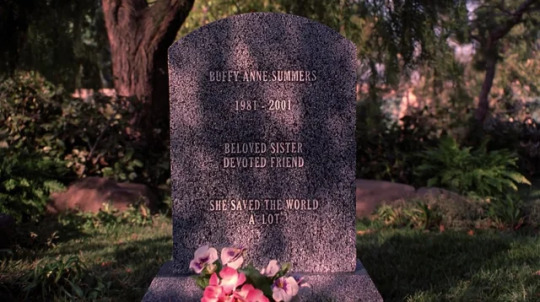
All Slayers die young. All of them without an exception. No matter how good of a mentor is, no matter how much he cares about her, Buffy is going to die one day, and Giles is going to watch. Because that's what the watcher does, they watch. Sending her on missions means Buffy's in danger, not sending her means innocent people are in danger.
It's a scenario that's pretty much like Gojo's, and the narrative of Buffy makes it explicit that Giles really can't be a father figure to bufy in this scenario. A father would have to choose to put their child above the world and keep them safe, not send them out straight into danger.
It is a choice that Giles makes over and over again. He is always her watcher and never her father. There's a season 3 episode where Giles literally drugs Buffy as a part of a test to prove she is "worthy" of being a slayer. A test that deliberately puts her in harms way that he complies with - because the system told him to. A choice to be her watcher and act according to what the council of watchers wanted and not what Buffy wanted. A choice that shatters the illusion that Buffy had of him, showing her that Giles is only there to teach her to be a Slayer, not to take her to the iceapades or buy ice cream with her.
In this scenario Gojo is very much like Giles as no matter how much he may personally like these kids, he is not their father, and there is only so much he can do for them when he's still feeding them into the same system. Giles loves Buffy, Giles wants to protect Buffy, Giles is a part of the system that exploits Buffy. Giles is an adult asking Buffy to risk her life to save the world.
Gojo goes out of his way to recruit Megumi, Yuji, and Yuta among others. Gojo still doesn't let them be anything other than sorcerers, and as sorcerers they're still guaranteed to one day die and probably die young. Gojo wants to revolutionize the system he is, but he still sends out his students to do missions as part of that system. He's not letting them escape it, he's just making them be stronger sorcerers.
Not only is Gojo not a father figure to Megumi, he is exploiting him more or less. The option of Megumi not being a sorcerer isn't on the table. No matter how well-intentioned he may be, or how good his ideals are he's still an adult telling a child to make a sacrifice for the world.
So, there are two character conflicts with two different mentors that both reflect Gojo. Gojo cannot grow up because he's still trapped in the tragedy of his youth. He himself is not an adult, for various reasons (lack of connection to other people, trauma in his youth) he's egocentric like a child but there are children in his life who need him to be.
Gojo also cannot be a proper adult, because he is part of a system that exploits children. We see what the system does to proper adults like Nanami, he shows us just how much well-intentioned adults struggle to help kids under sorcerer society so how about Gojo who thinks being a sorcerer is really fun. A proper adult would never send kids on those missions, they'd find some way to shield them but Gojo cannot do that. Because sorcerers are short staffed and innocent people will die if he doesn't. Because Gojo isn't the sorcer-king of Jujtusu Society and is working within it to affect change. There are reasons, but still Gojo is failing to live up to his desire to protect children because he's not doing what a responsible adult should do in this situation.
Gojo's failures are two-fold, and yet it's because of those failures that he was a main character who got as much special plot attention as he did. If Gojo was a perfect teacher he wouldn't be a character. After all, we relate to the struggles of other human beings we see onscreen in television and in movies so why would we care about a perfect character?
Gojo has a lot more to say about teachers in shonen manga, and also about childhood vs. adulthood as a bad teacher struggling to be a good one, then a teacher who's already perfect. Nanami said those lines because he wanted us to understand the audience that this is who Gojo is, he is a selfish and egotistical person who nonetheless was trying to do good things.
#jjk meta#gojo satoru#satoru gojo#nanami kento#kento nanami#jujutsu kaisen meta#jujtusu kaisen#jjk spoilers#jjk 236#jujutsu kaisen spoilers
680 notes
·
View notes
Text
Geto was loved even in death.

Wouldn’t it be nice if he were judged by his intentions in the afterlife - wherever that was? He had suffered living with the love he had. We see through the eyes of those left behind, that the ill deeds didn’t define him, as strange as that may be to us as readers in the real human world we live in. Geto’s influence and loving nature were far reaching; Gege certainly made him so treasured by many even after his death. If Gojo was touched by his caring influence, this was also Geto’s will he passed onto his students.
NOT spoiler-free as I’ll be referring to the recent chapter, 255.
I wrote this the other day:
And honestly it’s long enough; here’s part 2.
Is it obvious I’m suffering from brainrot? All my drafts from jjk brainrot are rivalling my thesis/dissertation from way back (lol)
Here is more under the cut:
I’m really moved by the reasons for why Miguel and Larue have decided to join in the risky fight against Sukuna.
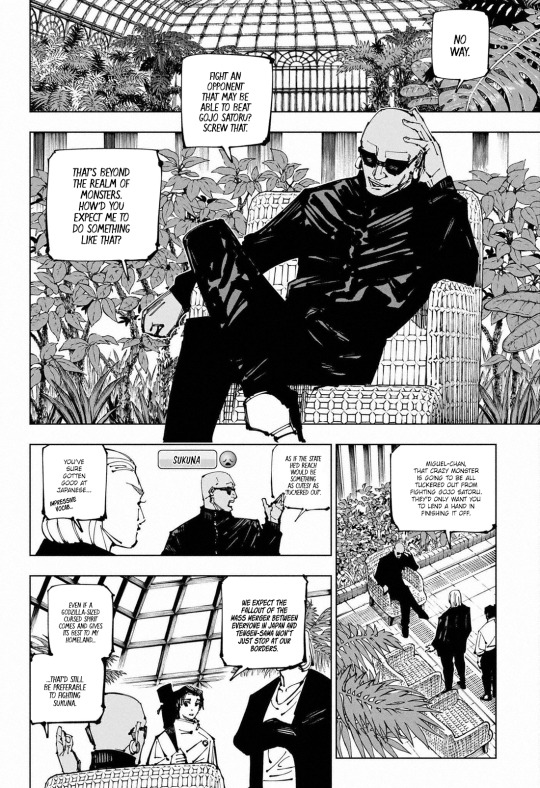
It’s very obvious that Miguel is reluctant at first. He says he he’d rather terrible curses arrive at his shores than to fight with Sukuna, adding that he doesn’t see himself having any ties with Japan any longer.
We can deduce that this was part of Gojo’s plan for the possibility that he dies/loses, and I had a post about this saved in my drafts - but I guess I never got around to finishing it. Basically, in sum, he will achieve giving Geto a cremation (avenging him) and gets to show off to his students (which he does enjoy) by going all out (soo satisfying), and in the worst case scenario, he loses but gets to go all out, weakens Sukuna (for the rest to handle), and idk if he really is that romantic (so it’s really stsg headcanon fantasising) he will die on the same day as Geto.
The Opening theme is rather beautiful in that it interprets Gojo having the words, “we’ll meet again” stuck in his throat, which he doesn’t say. But I’m a bit weird and tend to separate anime from manga. But it’s worth noting that here.
I digress. Back to Miguel and Larue who have moved to speak privately without Yuta.
In a previous post I wondered aloud about what Yuta knew about Geto from others aside from being villainous and I guess this implies he doesn’t know much, since he wasn’t close to Miguel enough to sit around to chat with them. It makes sense.
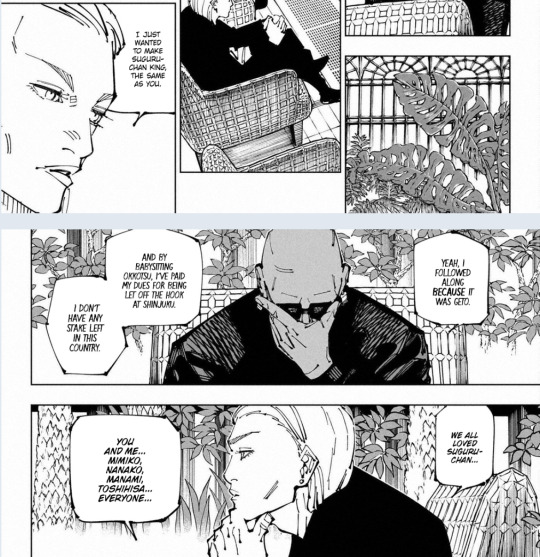
Miguel and Larue both agree they followed Geto in jjk 0 because they wanted to see him become King. What does this even mean, really? Gege, you’re missing stuff out again!
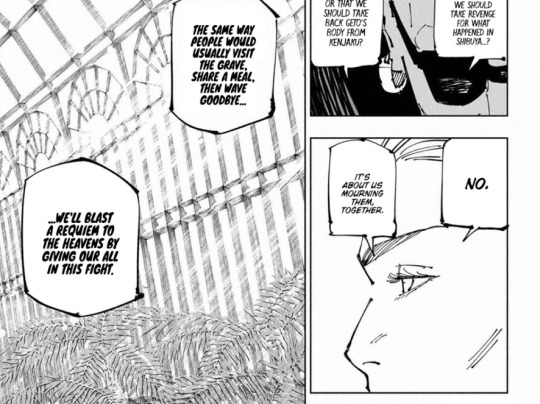
Nevertheless, we understand how reluctant Miguel was. He enquires that Larue intends to do, clarifying: is it for revenge or to take Geto’s body back?
And it seems like their main motivation for putting their lives on the line... is to honour Geto’s memory. Like a traditional ritual one makes for the dead (customary in Japan on death anniversaries - not limited to the year, but also number of days).
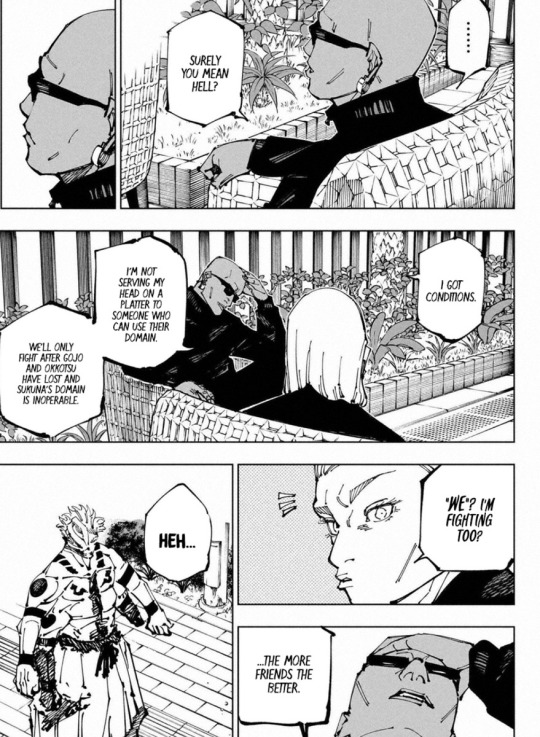
It’s incredibly moving how much they love him. This is actually what led Miguel to reconsider. We see him go silent as he thinks “...” before he reaches a moment of clarity/a decision.
Tbh I have issues with interpreting his statement in between the two panels (re: hell) in Japanese - it doesn’t directly indicate if he is referring to the former part of the conversation (whether he thinks Geto is in hell), or the latter (he thinks the battle will be hell). The phrasing goes like this: “no matter how I think about it: it’s hell.” - I’m not a native speaker so it’s difficult for me to be certain which is right. But the consensus is as translated above. Larue thinks Geto is in heaven, Miguel thinks it’s hell, and we see the airport scene where presumably Haibara and Riko with Kuroi have been there for over a decade. lol. Who knows!
So the bottom line is… regardless of where they think Geto ends up in the afterlife, Miguel is willing to give Geto a send off that’ll even reach hell. Or, despite it going to be hellish, he will do it. It also seems so heartwarming how they still emphasise family and friendship in wanting to fight together - perhaps things we can surmise had meant something to Geto.
They will fight Sukuna because it is for Geto. Geto was so loved that they would risk themselves - not for a title, not for revenge, but out of … love. Again. That’s pretty damn loving. Can we imagine what Geto did and was to them, for them to experience such loyalty and reverence?
Sadly, it goes without saying that Geto’s body being used as a vessel and puppet by Kenjaku has possibly evoked an emotional response by those who cared for him - namely Mimiko and Nanako, and also Gojo. Arguably, even if it were a death without his body being hijacked, Gojo did refuse to cremate his body or have it processed “by the book” of jjk high through Shoko. If that’s not out of a form of love (or “consideration” as Kenjaku put it), I don’t know what is.
The twins went against what Geto wanted for them (to carry out his will) to fight against immensely power beings in hopes they could bring him home. Those were their reasons to fight. Gojo scheduled 24th December - this was after he teleported to Kenjaku immediately upon unsealing so he could bury Geto. We saw Larue and Miguel’s. Toshihisa is alleged to be quite weak, and despite potentially being considered a son to Geto (if his life situation did mimic that of the twins’ - source: jjk character book), he opts to follow the inherited will as prescribed by Geto.
It’s all love. Geto was loved, I’m telling you. I want to shout if off the rooftops because that man just looked so darned sad and deranged after he lost it.
So. Continuing where I left off: Everyone thus far has had a reason to go into battle with Sukuna. I wonder what / who will actually reach him? I hope it’s Yuji ... and that Megumi will react again at some point. They have their own themes relating to love and purpose. I’ll leave them to someone else more familiar with their characters to write about!
And now I’m going offside quite a bit, but it’s still of relevance to Geto and the theme of love that seems to surround him. Way back to jjk 0 and Hidden inventory.
I wanted to just bring this into the picture as well now that I’m already writing a post on that topic, but please feel free to stop if you’re bored now.
So. Jjk 0!
There were direct parallels with Yuta & Rika and Gojo & Geto. This was also confirmed by the director when discussing their vision for the movie. The light novel also drew a link between Geto and Yuta where they were described as being too sincere for this world.
There is a direct theme of love - the type, is open to interpretation.
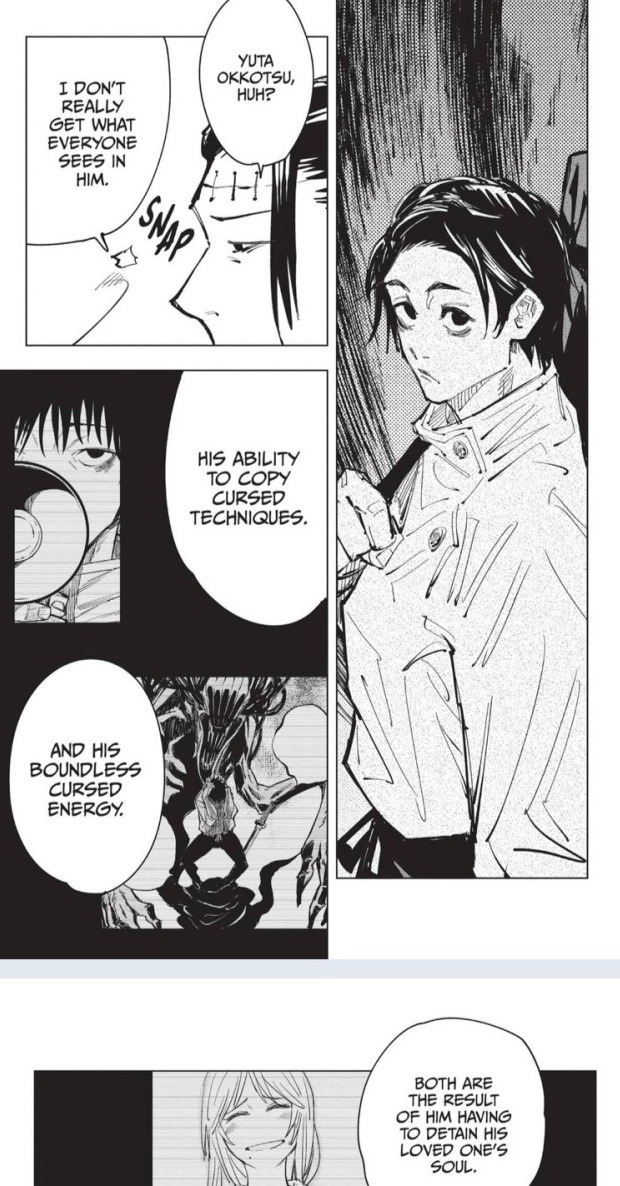
Kenjaku also makes reference to this in the Shibuya arc. So to me, it remains relevant. Love in its many forms is somewhere in what Gege wishes to convey thematically.
Within jjk 0, Geto seemed to pursue power but this was also a symbolism where power = love. It is twisted. In light of recent events, we know that the pursuit of power leads to the dilution and even absence of love. Love that gives birth to power becomes cursed. So it seems.
As we know, Yuta bound his lover to himself to gain power.
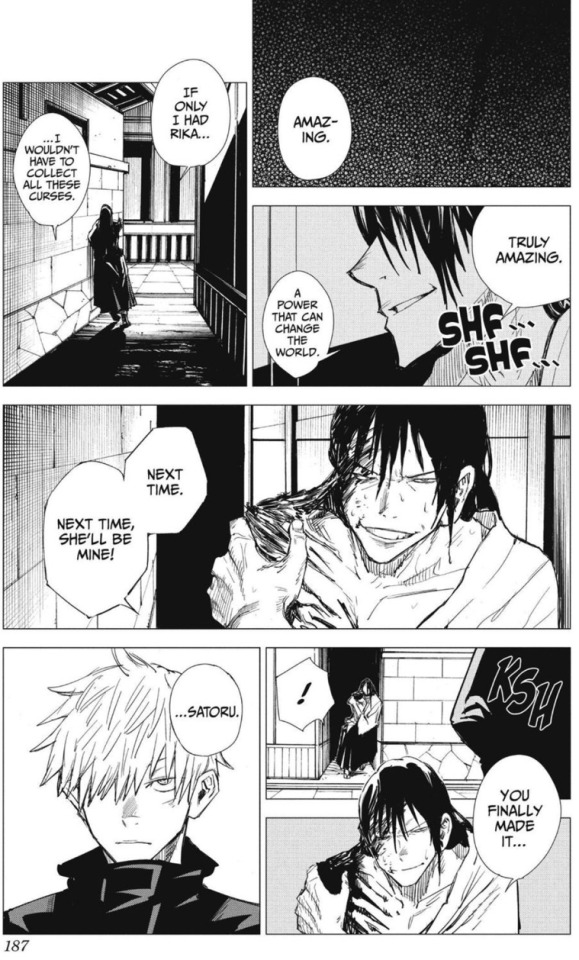
If only he had Rika (metaphor for love: Gojo) he probably wouldn’t have had to skulk around the shadows consuming curses which he hated doing. Geto was lamenting on the past in the above panels. He probably was determined to carry on, as he vouched to give it all he got (Haibara’s last words to him echoing here).
A flashback to the past:

Geto doesn’t do things in half-measures. To avoid hypocrisy, and I headcanon that it was a merciful killing to protect them from him, he kills his parents. To die by his hands than to be used as a pawn to get to him. For them to see the horrors their son could be capable of. It is so very wrong, and we can see the twisted nature of his love in this interpretation.
And Gojo delivers the ultimate blow that leads to Geto reflecting - depicted by the mysterious ellipses “…..” (gege really likes the reader to work hard huh) - insinuating it is impossible for Geto, so don’t even bother trying. The blossoming possibility of discourse was nipped, as the strength differential was implied - you’re the strongest now, whereas it used to be “we”. There was no more place for Geto; it was probably a misunderstanding. Gojo was protecting everyone in his own way, and the only way he knew how.

For power, Gojo was a source - but Geto couldn’t do that in Shinjuku, nor earlier in the arc, when Gojo himself was on the brink of insanity and deferred to Geto about annihilating humans as he held Riko’s dead body. Geto in the scene above acknowledges their different paths they needed to take - Gojo had a place as part of the elite at the school - Geto was already facing an execution order.
And after hearing Gojo’s condescending tone in an emotionally-fuelled attempt to reach out to him. He turns away to protect his friend from himself, and himself from his friend. Anyway, I touched on this in my previous post. Geto feels they had fought and didn’t deserve a place next to Gojo. But deep inside, even his body remembers the sound of Gojo’s voice, reacting to it when called despite his soul no longer being there.
sigh. Moving on... back to jjk 0:
After witnessing the bonds through willingness to sacrifice and the love between these students, Geto was really moved. Gojo trusted Geto retained his sense of humanity / love / idealism - even if it would lead to him sacrificing himself.

He was finding it difficult anyway:
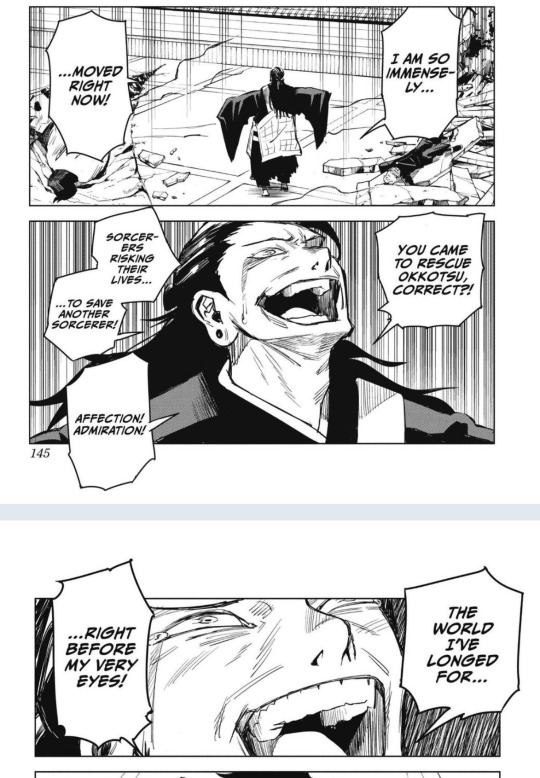

He could always empathise with love. I suspect he tried his best, but the binding vow for Yuta’s life was also just the cherry on top to make Rika super saiyan.
Kenjaku knew Geto probably could’ve won though, had he been more selfish.
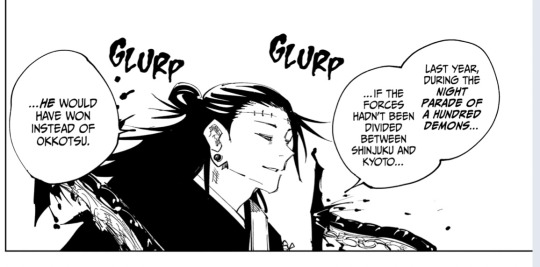
Geto conceded without a fight with Gojo. Maybe it was a matter of trust in that they both knew his living on borrowed time. As the light novel insinuated, this was the only way it could ever end. And Gojo would have to carry the curse that was Geto. This seems... so cruel.
He did his best. He perhaps always wanted the love but set it free.
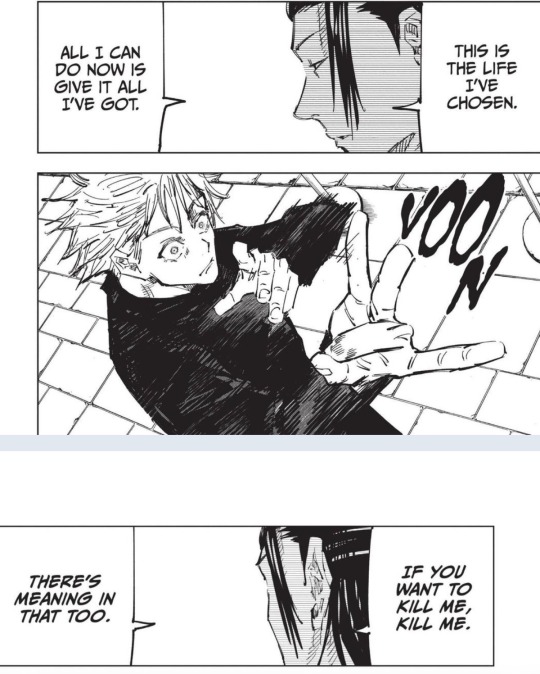
He did so many things for others in spite of himself, in sacrificing himself, in staining himself with blood drenched hands.

Avenging Riko by killing Sonoda. Note how manipulative “humans” are by using Jujutsu rules against them.

He embraces a life of smoke and daggers. Living in lies and half truths in order to live, survive, and find justice in a wicked world.
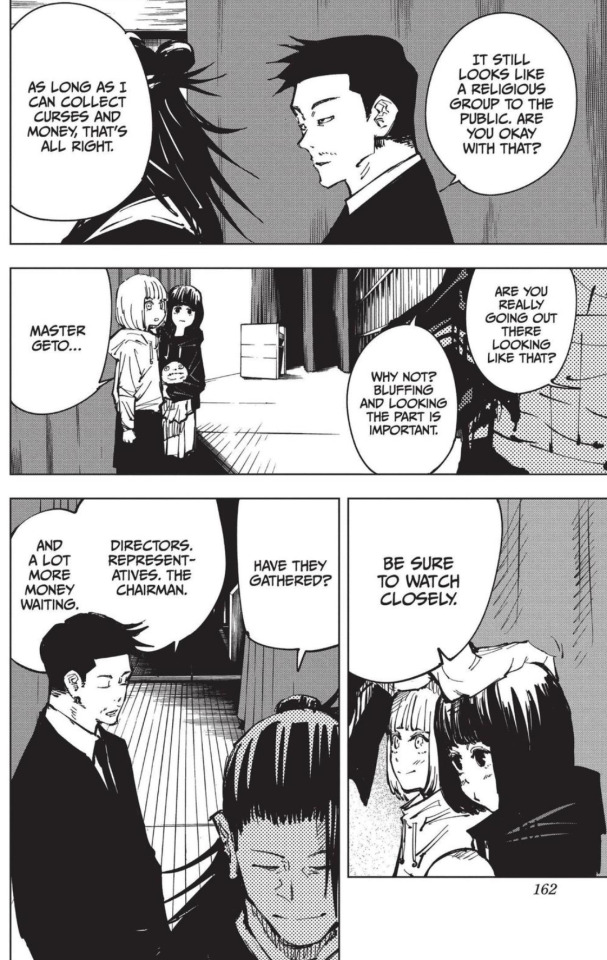
Watch me closely, I’ll protect you, I’ll avenge you, this is how you protect yourself.
This is the path I’ve chosen.
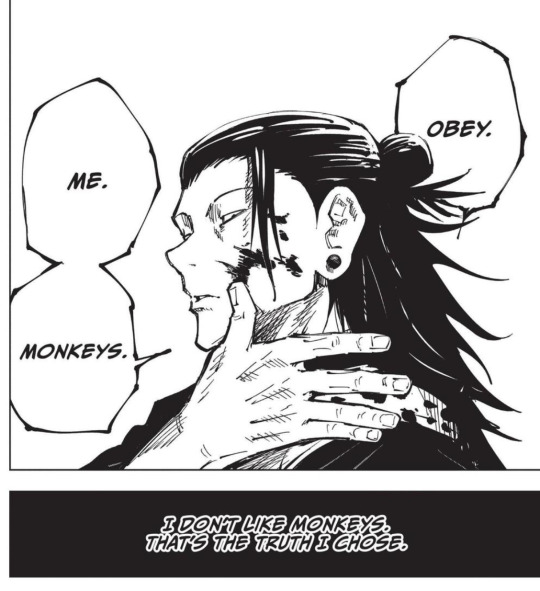
I’m not saying he was right or justifiable. His character is just tragic. The system had set him and others to fail.
The worm foreshadows Geto’s maternal nature. Calling him “okaasan”. I mean, this very worm had a binding vow with Toji. And now it calls for a new owner? I’m not sure if Gege had anything else in mind with this... is the womb protrusion domain Geto’s? But that’s tied to a sorcerer’s soul…. Anyway, I digress again. (Sorry). Geto did have a martyr complex and was written captivatingly well by Gege. The extra touches where how he has been perceived by others and the effect he has (and continues to have) on those we see.
And I just want to leave this heartbreaking thing here:
Source from twitter/now X:
Wouldn’t it be so sweet for Geto to get one (love declaration) at the end of his life, regardless of the way you perceive Gojo and Geto’s relationship?
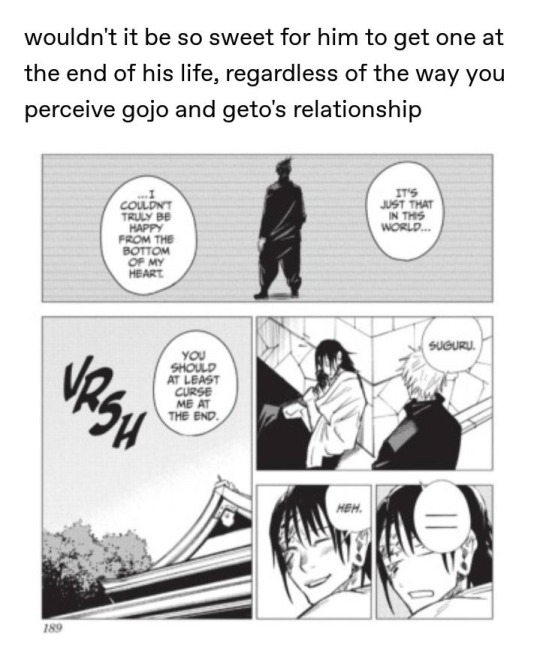
Wouldn’t it be nice for him if he could know that his family who he instructed to flee had all loved him, adored him, and would honour his sacrifice in differing ways...
Instead, a form of love meant his body was desecrated and used by Kenjaku. His girls were killed, and his full potential was not quite realised at all.
If only things were different.
Gojo should have kept him in his basement!
But at least, I think, Gege is giving Geto some love even after his death.
For that I’m thankful.
And thanks for reading if you made it this far with my rambling!
If you want something more light hearted I have a fluffy fic up on AO3 (it isn’t great but i enjoyed writing it to fantasise about what happens at the airport) and if you want more angst and pain, please browse my tags (lol).
#jjk chapter 255#just my interpretation#satosugu#stsg#jjk analysis#jjk spoilers#jujutsu kaisen#gojo satoru#jjk meta#geto suguru#jjk#jujutsu kaisen analysis#jujutsu Kaisen meta#suguru geto#Geto meta#Geto analysis#Geto Suguru analysis#jjk 0#jjk character analysis#jujutsu kaisen character analysis#Geto theories#jjk theories
90 notes
·
View notes
Text
The heart-breaking thing is, Satoru would never have left Suguru the way Suguru left him.
When Satoru was near his breaking point, instead of just killing all the cultists, he waited to ask Suguru if they should do it. To him, it was together or not at all. Suguru chose not at all, and he listened.
When Suguru was at his breaking point he had already felt alone so he didn’t bother extending a hand to Satoru. What would have happened if he called Satoru before he massacred the village? I believe that Satoru would have talked him down.
The thing is, because of his self-isolation, Suguru made the decision on his own and consequently left Satoru. Which, as we all saw, quite literally caused irreparable damage within Satoru.
But even still, even after Suguru left Satoru, Satoru never abandoned Suguru. He let him live, let him kill people, let him galavant all over Tokyo as an evil curse user with a genocidal agenda—all because he couldn’t let him go.
And it’s like, Suguru may have felt that Satoru left him first, what with him being too busy on missions and ignoring the warning signs that Suguru had been putting out for a couple years, being the strongest alone—
But half of that was Suguru’s own mental spiral. He made himself believe that Satoru didn’t care anymore, and because of that, furthered his own isolation. He self-sabotaged.
And in the end, he was the only one who left.
Years later, after he’s long gone, Satoru is still there, right where he left him.
#this episode on depressing shower thoughts#satosugu brainrot#satosugu#stsg#jujutsu kaisen meta#satosugu meta#jjk#jujutsu kaisen#gojo satoru#geto suguru#suguru geto#satoru gojo#jujukai#jjk spoilers
655 notes
·
View notes
Text
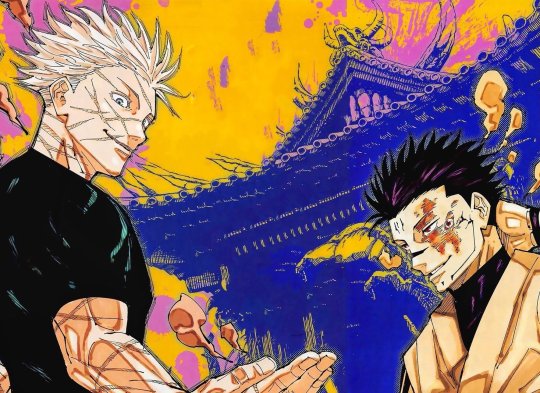
Gonna lose?! It’s Gojō Satoru!!
Karma and consequence in Jujutsu Kaisen
With the release of chapter 235 of Jujutsu Kaisen, the King of Curses has been defeated and Gojō Satoru has cemented his title as the 'Strongest’. The war isn’t over yet, but the battle is won, and I think the outcome of this fight is by far the most interesting for both characters.
Truthfully, at the start of the Shinjuku Showdown arc, I wasn’t particularly rooting for Gojō or Sukuna to win. However, as the fight developed (alongside the release of the anime adaptation of Hidden Inventory/Premature Death), I found myself becoming more and more invested in Gojō Satoru as a character and, consequently, theorising about what a ‘satisfying conclusion’ to his story might look like.
Shortly after the release of chapter 232, I saw an interesting post suggesting that ‘gain and loss’ is the theme of the Gojō vs Sukuna fight. Of course, ‘Gain and Loss’ is the title of chapter 221 when Gojō finally gets out of the Prison Realm only to learn that Sukuna has taken over Megumi’s body. I’d like to go a step further and suggest that ‘gain and loss’ — and by extension, karma and consequence — is actually a key theme of Gojō’s character (and maybe even Jujutsu Kaisen on the whole).
For full disclosure, I wrote about 90% of this before chapter 235 was released, operating on the belief that Gojō would eventually win this fight. It is a long post, so buckle up and let’s get into it!
Gain and loss in Jujutsu Kaisen
The idea of gain through loss was developed very early on in Jujutsu Kaisen with the introduction of binding vows. From Nanami’s ‘overtime’ to Sukuna's open barrier domain, a self-imposed binding vow offers a sorcerer an advantage in combat in return for an increased level of risk. In other words, sorcerers can ‘gain’ strength in exchange for a ‘loss’ of security. When it comes to binding vows, the bigger the risk the bigger the reward.
The idea of gain through loss was further developed through the introduction of Heavenly Restriction. Similar to a binding vow, a person with a Heavenly Restriction is ‘gifted’ with enhanced abilities in one area in exchange for limitations in another. However, unlike a binding vow, Heavenly Restriction exists from birth (although it remains unclear whether it occurs due to mere chance).
There are numerous powerful examples of both binding vows and Heavenly Restriction throughout the series. For Gege Akutami, they are key to maintaining a balanced power system where intelligence and tactical thinking can lead an underdog to prevail in the face of a more powerful opponent — think Yūta beating Getō or Toji beating Gojō. Through these mechanics, we can deduce that understanding gain and loss, give and take, risk and reward — however you want to put it — is crucial to mastery of jujutsu sorcery.
Naturally, if gain and loss are embedded in the laws of the Jujutsu Kaisen universe, it makes sense that the theme exerts a heavy influence over the narrative, too. Of course, consequences are an important way to create compelling characters in any story, but this rings especially true for Jujutsu Kaisen which draws deeply on Buddhist themes and traditions.
In Buddhism, karma is not a deterministic system of retribution, but the natural law of cause and effect. It is directly referenced in Jujutsu Kaisen when Fushiguro Megumi explains his personal ideology using ‘因果’, a Japanese Buddhist term meaning ‘karma’ or ‘fate’ which can be more literally translated as ‘cause and effect’. The second kanji means ‘fruit’, hinting at the underlying agricultural metaphor behind karma in Buddhism: plant a seed, later receive a harvest — or, to use a saying derived from another religion with an important role in Jujutsu Kaisen, ‘you reap what you sow’.
However, an important characteristic of karma which is commonly misunderstood is that the relationship between a cause and its effect is not necessarily linear, but rather part of an intricate network that spans past, present, and future. In other words, the ‘consequences’ of one’s actions might arrive much later.
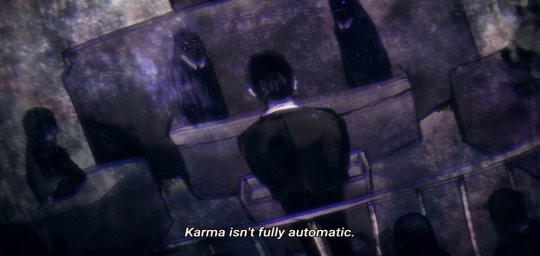
This can lead to mistaking the effect of one cause for the effect of another, creating a reality where ‘bad’ things happen to ‘good’ people and vice versa. The resulting circumstances may make it easier to do ‘bad’ deeds but, importantly, the freedom always remains to choose the path of ‘good’.
Thus emerges a system where liberation from suffering (in Buddhism, the endless cycle of rebirth known as samsara) is not determined by the judgement of some higher power, but by an individual’s continued choice to do ‘good’. In other words, you can create your own destiny, but only if you understand karma.
The beginningless karmic cycle is rooted in actions performed in ignorance. Therefore, breaking free of it — enlightenment — can only be achieved through knowledge.
Gojō Satoru: the embodiment of enlightenment
As a character, Gojō Satoru is symbolically tied to these concepts. We’re told that his birth altered the balance of the world, causing curses to grow stronger in response to the sudden injection of power into the ecosystem. However, while Gojō’s birth might be the cause of the imbalance, his very existence is itself the effect of something else.

Supposedly, the Star Plasma Vessel, the Six Eyes, and Tengen are all connected by fate. However, the term that Tengen uses — ‘因果’ — is the same one that Megumi uses for ‘karma’, suggesting a cause and effect relationship. This is confirmed when Tengen implies that the Star Plasma Vessel and the Six Eyes always appear in response to the merger — the irrepressible effect to the merger’s cause.
Kenjaku cannot contend with the immense strength of the Six Eyes nor the universal law of cause and effect. However, Fushiguro Toji, who possesses no cursed energy due to his Heavenly Restriction, is not bound by fate and is thus able to interrupt a cycle of cause and effect which has existed for at least a thousand years.
Tengen actually suggests that karma (因果) and cursed energy are one and the same so — if we take Tengen’s words at face value — Toji is an anomaly who is free from its bindings.*
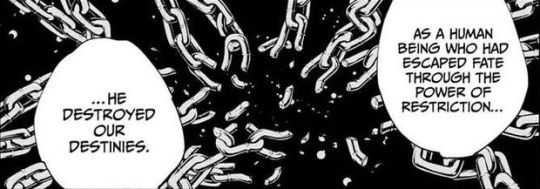
However, the characters whose lives he touches are not. Toji sets another chain of cause and effect into action when the events of Hidden Inventory lead to Gojō’s ascension to 'the Strongest'.
There is much debate in the fandom about whether Gojō’s moment of ‘enlightenment’ is legitimate, especially in light of his fight with Sukuna — the only other character associated with the phrase supposedly uttered by Buddha Shakyamuni at birth.
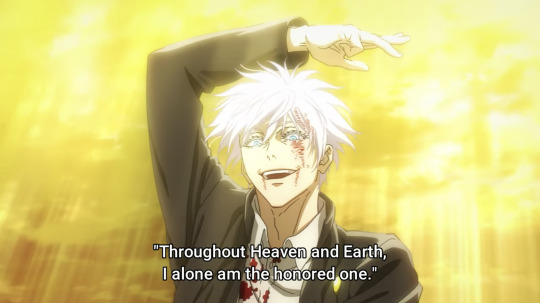
However, if enlightenment is understanding of reality that transcends conceptual thought, then Gojō Satoru is its physical embodiment in Jujutsu Kaisen.
His given name, Satoru (悟), is a verb meaning ‘to know’ or ‘to understand’, and the root of the Japanese Buddhist term for ‘enlightenment’. His innate domain — a representation of one’s innermost self — is a flood of infinite knowledge that constitutes the ‘truth’ of the universe. His Six Eyes are reminiscent of the all-seeing Eyes of Buddha or the Six Transcendental Powers or the Five Eyes — or perhaps all three!
Gojō is steeped in symbolism not only relating to Buddhist enlightenment, but to the founding Buddha himself, right down to his world-altering birth — the divine event which sets the modern-day story in motion.
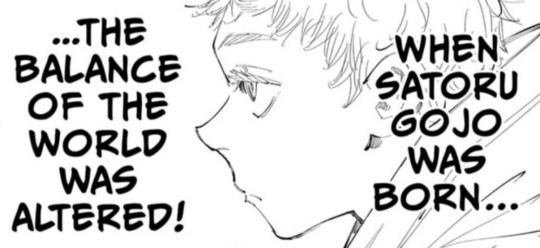
Although he may have spoken Buddha Shakyamuni’s words in a moment of euphoria, the suggestion Gojō had reached a higher state of being was never intended to be called into doubt. The pertinent question, instead, is why the unimaginable strength that accompanies his ascension to almost godlike status seems to bring Gojō more loss than gain — especially when, in a twist of irony, he was only able to gain that strength through loss.
‘The Strongest’ : an allegory for enlightenment
As the two strongest sorcerers battled it out in Shinjuku, the question on everyone’s lips during the weekly chapter discussions was, ‘Who will win?’ However, Jujutsu Kaisen has already established that ‘winner’ is not necessarily always interchangeable with ‘strongest’. Perhaps that’s why, in the aftermath of the fight, the discussion has turned to arguments about which character is the strongest instead — from cursed technique to battle IQ.
Even now, we don’t know much about Sukuna’s abilities nor his character, so it’s always been difficult to accurately judge his strength against Gojō’s. However, a surprising number of people went into this fight believing that Sukuna would win without much trouble.
Some made the reasonable argument that ‘the strongest sorcerer in history’ using the Ten Shadows technique while inhabiting the body of his dearest student presented a no-win situation for Gojō. Others made the much less reasonable argument that Gojō’s claims about his strength were little more than arrogance born from a cushy life in an era of ‘weak’ sorcerers.
Indeed, Sukuna himself echoes that sentiment in chapter 230, going as far as to call Gojō ‘unenlightened’ (凡夫) — before being immediately humbled.
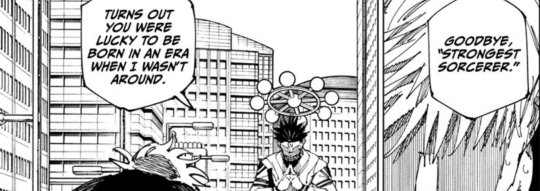
This isn’t the first time that Gege Akutami has directly challenged readers’ assumptions through his characters. However, Gojō in particular lends himself to reader speculation, because Akutami deliberately makes it difficult to know the character by maintaining a narrative distance from him that mirrors his Limitless technique.
This leads to a wonderful phenomenon where the reader falls into the same trap as the characters in the series by assuming that, while other sorcerers are struggling dreadfully, Gojō is having an easy time of things — because that’s what it looks like most of the time. Nanami might be right when he suggests that Gojō could take care of everything by himself. However, just because he could do it, does that mean he should?
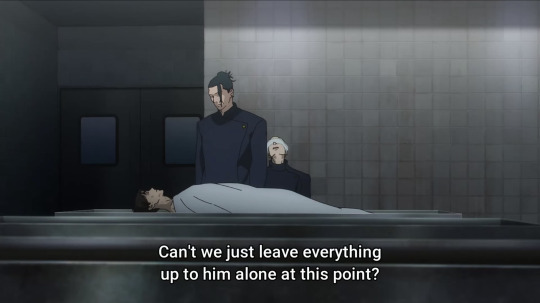
The problem is, with Gojō kept at a distance, it’s easy to forget how he became 'the Strongest’ in the first place. It’s true that, even before he becomes a fully realised Six Eyes user, Gojō’s abilities dwarfed those of any other living sorcerer. For people like Getō and Megumi whose techniques require a very steep learning curve to master, I can imagine that it feels like Gojō’s unimaginable strength was handed to him on a silver platter at times.
However, both things can be true: Gojō was born with innate strength that most sorcerers can only dream of and Gojō is an exceptional talent in his own right.
We all saw the suffering and sacrifice that Gojō went through on his path to becoming a sorcerer strong enough to face the King of Curses. In a series where the primary power source is born from negative emotions, perhaps it makes sense that tragedy promotes strength. Yet, Getō — whose technique is the epitome of strength through negative emotions — experienced the same tragedy as Gojō. So why did they head in opposite directions after the events of Hidden Inventory?
If Gojō is the embodiment of enlightenment in Jujutsu Kaisen, then Getō is his opposite. Where Gojō achieves understanding, Getō is blinded by ignorance which shackles him to a cycle of suffering — the marathon game of jujutsu sorcery.
In blaming non-sorcerers’ inability to regulate cursed energy — rather than the negative emotions that generate cursed energy in the first place — Getō mistakes one cause for another. Following the natural law of cause and effect that is karma, the solution should lie in shedding negative emotions altogether — just like Gojō at the moment of enlightenment.

Sadly, in his quest to find liberation from suffering, Getō actually condemns himself to it. Where Gojō chooses to let go of hatred and anger, Getō chooses to cling to them. This is ultimately why 'the Strongest’ changes from plural to singular. However, all of this assumes that Gojō did things the ‘right’ way when it’s very possible that Gege Akutami actually seeks to criticise a religious doctrine that separates the ‘honoured’ ones from everyone else.
Getō’s response to the horrors he endured evokes sympathy because it feels fundamentally human. In contrast, enlightenment seems so unattainable to the average human being that it becomes almost inhuman — the reserve of gods.
Indeed, Gojō is often accused of having a ‘god complex’, and Gege Akutami’s continued references to the divine don’t do anything to help. However, the series more often paints its strongest characters as closer to weapons of mass destruction or natural disasters, making the reality of ‘the Strongest’ less like reverence and more like dehumanisation.
Although Gojō achieved ‘enlightenment’, he’s ultimately still a human being — something that’s easy to forget. In fact, one of my favourite things about Gojō’s character is how he exists on an almost metatextual level. Too often, characters and readers view Gojō Satoru as 'the Strongest’ first and a human being second — a notion embodied by this notorious panel.
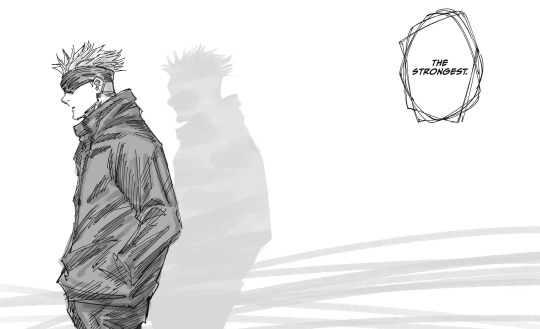
Thus, rather than having a ‘god complex’, I interpret Gojō as a character who struggles with his place in the world. His strength is what keeps him at a distance from the people around him — from the literal distance maintained by his technique to the metaphorical distance that separates him from the ‘unenlightened’.
Even the blindfold he wears to avoid discomfort hides his eyes, shutting off the ‘window to the soul’ and making him a less approachable figure. Thus, the thing that makes Gojō more comfortable around other human beings is ironically the thing that makes others less comfortable around him.
With the power at his disposal, Gojō is frightening at times, and Gege Akutami goes to great pains to show us the brutal potential of such strength — for example, in Shibuya when he ruthlessly dismantles 1000 transfigured humans with the precision of a machine in less than five minutes.
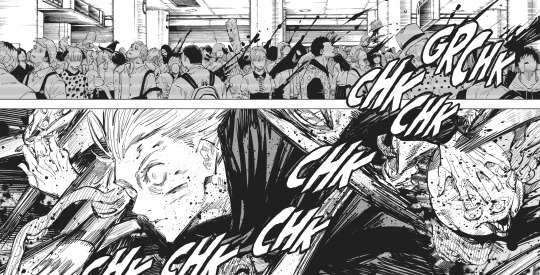
However, this display of violence comes off the back of Gojō’s most compassionate moment in which he bends the laws of jujutsu sorcery to preserve as many human lives as possible. Each time the curses attempt to force his hand, he does the inconceivable, even going so far as to limit his own strength by fighting without his technique to avoid collateral damage to humans caught up in the chaos.
Importantly, he doesn’t agonise over his decisions like the curses expect. Instead, when presented with a choice between two options that fundamentally violate his ideals, he forces another path without thinking. This is Gojō’s ‘overwhelming sense of self’. His commitment to upholding the ‘meaning’ he inherited from Getō is so unshakeable that it’s instinctive; so engrained that it’s unconscious.
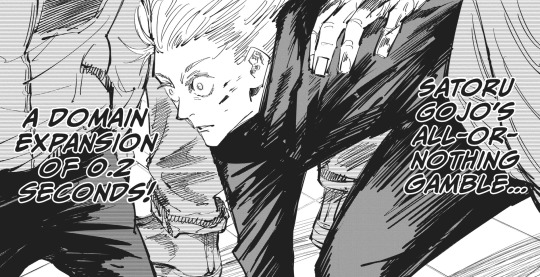
Despite his inhuman strength, Gojō’s actions in Shibuya exemplify his firm stance on the side of ordinary human beings. From his technique to his blindfold, he removes the physical barriers that separate him from the rest of humanity. The result is that, although his display of power in Shibuya is godlike, Gojō never seems more human.
Of course, it’s his humanity that ultimately makes him vulnerable to the Prison Realm, and many suggested that this ’weakness’ is why he would lose to Sukuna — a character who has wholly relinquished his humanity.
Humanity in opposition to strength
The unexpected appearance of his ‘best friend’ in Shibuya causes Gojō to falter for a heartbeat, but it’s long enough to make his brilliance look like foolishness in hindsight. His decision to save innocent people at B5F ultimately leads to the deaths of many thousands more over the course of October 31st and the following Culling Game. Among the casualties of the chaos are some of Gojō’s friends, colleagues, and students — as well as the Fushiguro siblings who were under Gojō’s personal care.
Of the Hidden Inventory arc, Nakamura Yūichi, Gojō’s voice actor said:
‘Even though Gojō had power, he failed his mission, he failed to protect Amanai, and he lost his best friend. He lost everything, and the only thing he succeeded at was awakening his abilities.’
So, it certainly seems true that Gojō’s choice to hold onto his humanity has brought him more losses than wins. In fact, at this point in the story, can we honestly say that Gojō has ever truly ‘won’?
Despite this, the characters in the series never stop thinking of Gojō as ‘the Strongest’. The narrative doesn’t ridicule him for his sentimentality in Shibuya, because it’s perfectly reasonable in the face of Kenjaku’s mind-boggling scheme. Even Sukuna recognises Gojō’s strength in the immediate aftermath of the event.
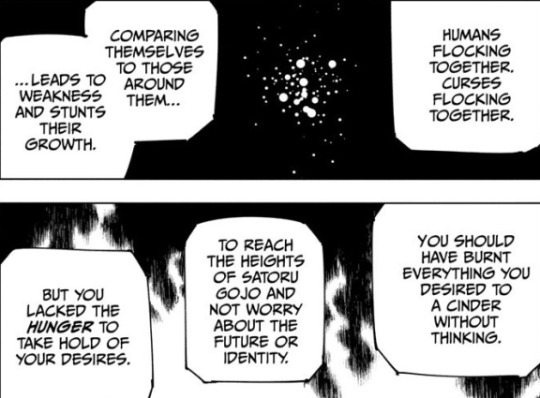
Aside from Kenjaku themselves — who has never suggested that Gojō is anything but immensely powerful — no one has ever criticised Gojō for his humanity. In fact, even prior to the Shinjuku Showdown arc, I’m not convinced that humanity is ever reliably situated in opposition to strength in Jujutsu Kaisen.
Many point to Uro Takako’s conversation with Okkotsu Yūta as evidence that tossing out one’s humanity is the only way to achieve ultimate strength. However, putting aside the fact that the translation warps Uro’s meaning somewhat, it’s unwise to assume that Sukuna’s is the only way to reach that level, simply because he’s the only example in history of a sorcerer with comparable strength to Gojō.
This is even more true when you take into consideration that everything about the context surrounding Uro’s assertion suggests otherwise. After all, this prideful, vicious sorcerer has just been beaten by a teenage boy who fights solely to protect the people he cares about.
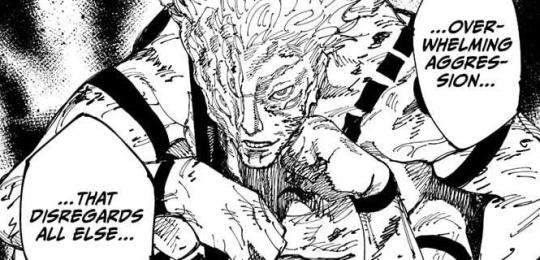
‘Overwhelming sense of self’ — the more accurate translation of the above panel — is about having absolute conviction in who you are as a person. The quality of your ideals is irrelevant as long as your commitment to them surpasses all else, and this has never been Gojō’s issue.
To say that Gojō’s humanity makes him weak misses the point, because it’s never been a question of strength. There’s no need to invent a weakness in the form of his humanity, because we already know his weakness — he told us himself.

Perhaps this starts to get at the the truth of ’the Strongest’ and the solitude that comes with ultimate strength. In Gojō’s own words, ‘When granted everything, you can't do anything.’ Despite being strong, he simply cannot save everyone. So, if being ‘the Strongest’ doesn’t help Gojō towards his goals, then what’s the point in his strength?
Of course, this is why Getō’s parting words hit Gojō so hard. When the boy who taught him that ‘protecting the weak’ is important tells Gojō that he has the power to commit the biggest act of genocide in history, the title of 'the Strongest’ is transformed from a blessing into a curse. I can’t imagine that Gojō ever feels more powerless than when he realises that he’s trying to save people using a body that’s built to destroy — a contradiction that’s illustrated to us in our first introduction (chronologically) to Gojō as a character.

If that wasn’t enough to cause an existential crisis for Gojō, Getō’s follow-up question guarantees it. In challenging Gojō’s assertion that Getō’s goals are impossible to achieve, Getō simultaneously questions Gojō’s identity beyond ‘the Strongest’, unintentionally (or perhaps intentionally) dehumanising Gojō by reducing him to his strength. This is especially painful coming from Getō of all people.
By the end of the conversation, Gojō’s entire worldview has been called into question by the person he trusted most. Getō, who always impressed upon Gojō the importance of meaning, leaves Gojō searching for the meaning in his strength — and, over 200 chapters after Getō asked the question, the answer still isn’t clear. This, I believe, is where the Shinjuku Showdown arc comes into play.
A reason to fight
From a narrative point of view, Getō isn’t entirely wrong to insinuate that Gojō lacks an identity beyond ‘the Strongest’. His primary role in the story has always been to act as a power ceiling from which the reader can extrapolate information about Gege Akutami’s world and its mechanics. Even his absence from the story is meticulously set up to illustrate the anarchy that breaks out due to the power vacuum he leaves behind.
Prior to the Shibuya Incident, Gojō Satoru’s overwhelming strength presented an obstacle to other characters’ growth. In order to create a more balanced playing field and an opportunity to explore creative techniques and fights on a previously unseen scale, it’s understandable that Akutami needed to get Gojō out of the way — at least until Sukuna could join the story as a fixed member of the cast.
As expected, even the strongest sorcerers we encountered during the Culling Game pale in comparison to the prowess on display during the Shinjuku Showdown. It all serves to show that Gojō and Sukuna are on an entirely different level — to the point that, even after Gojō burns out the part of his brain responsible for his domain, his strength still doesn’t dip below that of Okkotsu Yūta and Hakari Kinji.

To paraphrase Megumi, I shouldn’t try to find logic in a powerscaler’s behavioural patterns, but I can’t deny it’s immensely frustrating that week after week fans get caught up in arguments about who is the better sorcerer when it’s the least interesting thing about this fight.
The only reason ’the Strongest’ even existed as a neatly defined category up until this point was because of the lack of any viable opponent for Gojō. Now that he’s fighting someone on his level, comparing these two behemoths of jujutsu sorcery is the same as any other powerscaling exercise: reductive, vulnerable to bias, and ultimately missing the point.
Gege Akutami has never written a fight simply for the fun of seeing two characters go at it. There’s been a greater purpose behind every carefully created match-up in the series, either in the form of high stakes or an important lesson for the characters involved — or sometimes both.
While Akutami clearly enjoyed writing this back and forth between two masters of their craft, carefully balancing the scales to ensure that neither gained the upper-hand for too long, there is a great deal of character development staked on the outcome of this fight.
There are parallels between Gojō and Sukuna as characters but, more than anything, the Shinjuku Showdown arc has exposed some fundamental differences between the two — namely, why they fight in the first place. While it’s true that Gojō is fighting Sukuna partly because there’s no one else who can, it’s also true that the stakes have never been higher for Gojō. He has a lot to gain and a whole lot more to lose, so his reason for fighting feels tangible to the reader.
Conversely, Sukuna’s reason for fighting is considerably less clear. While we don’t know the nature of Sukuna’s binding vow with Kenjaku — or anything about his motivations in general — it doesn’t seem like there’s much at stake for Sukuna except for, perhaps, his pride. Beyond advancing the plot, this poses a lot of interesting questions about what Sukuna would have to gain from winning this fight.
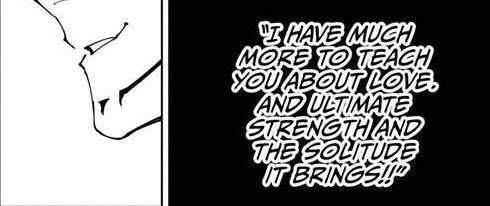
Since Gojō’s return, Sukuna has recalled Yorozu’s words about love multiple times. Their purpose — and Sukuna’s initial reaction to them — are still shrouded in mystery. However, through Gojō, we can learn something about ‘love’ and how it relates to the ‘the solitude of ultimate strength’.
Gojō never wanted to be ‘the Strongest’ alone. In fact, his entire motivation as a character is raising up ‘strong and intelligent allies’, constantly chasing the companionship he felt as one half of the strongest duo and trying to ensure that his students never feel the same isolation that’s plagued him and Getō before him.
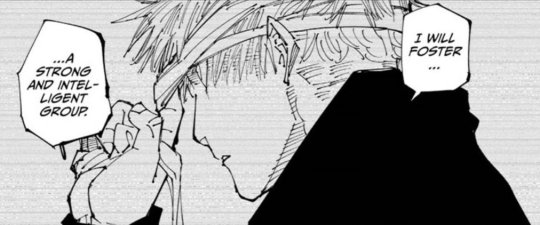
In the recent chapters of the manga, Gege Akutami has made it clear that Gojō isn’t really alone at all — Shōko reminiscing on their friendship in chapter 220; Gojō’s comrades rallying around him during the send off in chapter 222; the wonderful ‘my students are watching’ callback in chapter 230.
What’s more, for the first time in his adult life, we see Gojō — who’s famously in his element when he’s alone — start a fight with people at his side, leaning on three characters who we’ve previously been led to believe he looked down on.
The distance that’s always existed between Gojō and the people around him is closing. He has removed his mask and he is open to the world — the blindfold is gone; the shapeless, oversized jacket is gone; Gojō even removes his technique to let people in during his sendoff. Akutami makes it explicitly clear that Gojō’s allies have got his back, and he’s got theirs in turn — they’re his reason for fighting.

On the other hand, his opponent only has a single ally in all the world and, although Uraume is a devoted servant, there is no suggestion that they would tag in when the going gets tough. Sukuna has already told us that, for him, losing and dying are the same thing — a curious contrast to Gojō who does not put ‘winning’ and ‘dying’ in opposition, and this creates an interesting situation where both fighters could ‘win’ by their standards.
If Gojō saves the people he cares about (and the world at large) but dies in the process, he wins. Equally, if Sukuna is the sole survivor of the fight, he wins — but what would that actually mean for him?
One approach embodies overwhelming selfishness, the other embodies overwhelming selflessness, but only one of these approaches has been established as the most powerful form of binding vow in Jujutsu Kaisen. With all that said, many people believed that Gojō dying to win was the most likely conclusion to the fight — but that’s what a small fry would think!
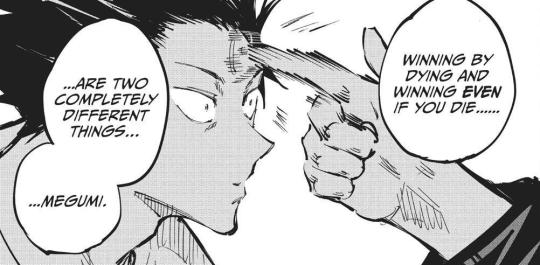
In Jujutsu Kaisen, it has always come down to one question: how much are you willing to risk — not sacrifice — in order to win? This is the lesson that Gojō impresses upon Megumi, and it’s why I was always in the camp that believed Gojō would win and survive. I didn’t expect his victory to be quite so clear cut, but it seems obvious in hindsight — and it’s all thanks to the power of love and friendship.
In chapter 234, Kusakabe suggests that Sukuna is keeping something in reserve, because he knows that if Gojō loses, he’ll immediately have to fight a number of other powerful sorcerers. Gojō knows that there are strong allies ready to back him up if he fails, so he can go all out.
Meanwhile, Sukuna is truly alone — to the point that he has to create allies in the form of shikigami in order to contend with Gojō. In the end, the explanation for Gojō’s victory is simple. Where Gojō gave it his best, Sukuna didn’t — and that was a grave underestimation of his opponent for which he paid the price.
So, the Shinjuku Showdown arc has come to an end and Gojō has reaffirmed that he is, in fact, 'the Strongest'. However, his story isn’t over yet, so what would a satisfying conclusion to his character arc look like?
Are you Gojō Satoru because you’re the Strongest?
Although Itadori Yūji is the main character of the series, Gojō Satoru is foundational to the story — despite how much Gege Akutami jokes about hating him. Gojō’s story is the thread that ties the series together, so landing the ending is crucial for completing not only Gojō’s character arc, but also that of many other characters. For Gojō, everything consistently comes back to Getō Suguru and Fushiguro Toji, but there remain unanswered questions regarding both.
Toji’s presence during the clash of the strongest sorcerers is too large to ignore. Aside from the allusions to Toji himself, his son plays a pivotal role in Gojō’s story as the human representation of gain through loss — the blessing born from Gojō’s curse. Taking Megumi under his wing marked Gojō’s first step towards a brighter future after the tragedy brought on by the failed Star Plasma Vessel mission, but there’s one major plot thread left unresolved.
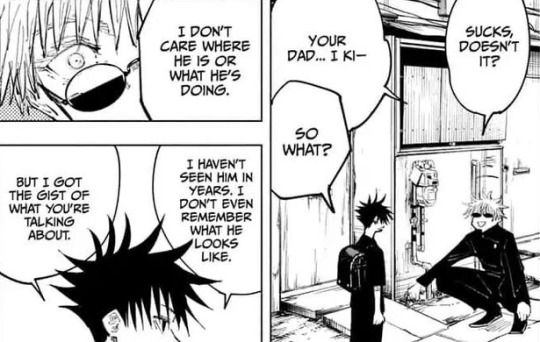
I wouldn’t have thought that Megumi learning the truth about his father was important after he dismisses Gojō’s attempt to tell him during the Hidden Inventory arc. However, the combination of Megumi’s interaction with Toji in Shibuya, his visible cluelessness when Tengen mentions Toji, and the numerous ways Gojō references Toji during the Shinjuku Showdown arc has convinced me that Akutami plans to follow this up at some point.
Right now, Megumi’s fate is still hanging in the balance. Although many people are waiting for something terrible to befall Gojō — losing his Six Eyes; burning out his technique permanently; dying — I’d like to believe that, if we look at Jujutsu Kaisen through a karmic lens, Gojō isn’t owed any more losses. At the very least, he certainly doesn’t have to die to progress the story as some people have suggested.
Our heroes, including Gojō himself, have been on a major losing streak for a long time now. Gojō being freed from the Prison Realm represented a shining beacon of hope at the lowest point in the series. To extinguish that light by killing Gojō almost immediately after he’s returned to the story would be another major blow to the characters and the readers.
I wouldn’t put it past Akutami to send some more pain our way before the end of the story, but if Gojō is going to die on December 24, I don’t think it’s before a number of other things happen.
If Gojō inherited Getō’s ideals in a symbolic ‘passing of the torch’, then his death before he has confirmed the safety of the people who depend on him is a depressing end to his best friend’s legacy. Additionally, up until now, Gojō has never had the opportunity to answer Getō’s question once and for all.
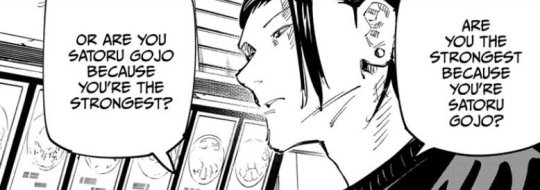
I would argue that Gojō has proven multiple times during the fight against Sukuna that he’s 'the Strongest' because he’s Gojō Satoru, but is he Gojō Satoru because he’s the strongest? He can’t discover that unless he experiences what it’s like not to be 'the Strongest' — either by losing his strength or by sharing the burden with the strong and intelligent allies he’s been raising for the entirety of his adult life.
Of course, there’s one more glaring thread to tie up, and it might be the most important of all when it comes to the completion of Gojō’s character arc. His first thought when he bursts out of the Prison Realm is a desire to lay Getō’s body to rest — a desire to rectify the mistake which threw the entire world into chaos.
As we’ve already discussed, despite his strength, Gojō has racked up a collection of costly failures. Thus, his entire character arc is about learning from the mistakes of his past. He’s taken every cruel loss that the universe has sent his way and, instead of lashing out with all that power at his disposal, he has grown from his experiences and chosen the path of ‘good’ time and time again.
If Gojō dies before retrieving Getō’s body from Kenjaku’s clutches, he has failed his best friend at the very last hurdle, and this would be a truly bleak way to end his story.
Concluding thoughts
At the conclusion of the Shinjuku Showdown arc, I’d like to see Gojō Satoru step back from the fight after inspiring hope in his students by delivering a final lesson in the form of his win. It is impossible to predict what Gege Akutami will do next, but I would like to see the reins handed back to the students for a while, as I feel Gojō has played his part against the King of Curses.
It is Sukuna, not Gojō, who presents the most interesting possibilities for character development after the conclusion of this fight. I am genuinely excited to see how he grapples with this loss that has the potential to challenge his entire view of himself and others. He disrespected Yorozu and treated his fight against her as a ‘test drive’, and thought he could get away with treating Gojō the same way. I think Ryōmen Sukuna might be about to learn some important lessons, and I would love to see him in conversation with Gojō before the latter bows out of the story.
Of course, we can always trust Gege Akutami to surprise us, and it’s entirely possible that the story will veer in a completely different direction than I expected. However, I have faith that he will deliver something profound, no matter what lies ahead.
---
*This is a very interesting concept in and of itself, especially in relation to the goal of the Culling Game, Yuki and Kenjaku’s battle of ideals (i.e. ‘breaking free from’ versus ‘optimising’ cursed energy), Maki’s ‘enlightenment’ in the Sakurajima colony, and the understanding that true enlightenment lies in breaking free from all karma — both good and bad. After all, golden shackles are still shackles. Perhaps I’ll write about this another time.
#jujutsu kaisen#jjk#jjk 235#呪術廻戦#jjk meta#jjk analysis#jujutsu kaisen meta#jujutsu kaisen analysis#jjk spoilers#jjk manga spoilers#jujutsu kaisen spoilers#gojo satoru#sukuna#ryomen sukuna#fushiguro toji#fushiguro megumi#geto suguru#kenjaku#can you see why this took so long???#it's almost 6000 words 💀#and maybe it's all bullshit haha!!#but i'll hate myself if i wasted all that time for nothing#so enjoy i guess!!#my writing#fushiglow
203 notes
·
View notes
Text
Jujutsu Kaisen Chapter 238: Shinjuku Showdown, Part 19
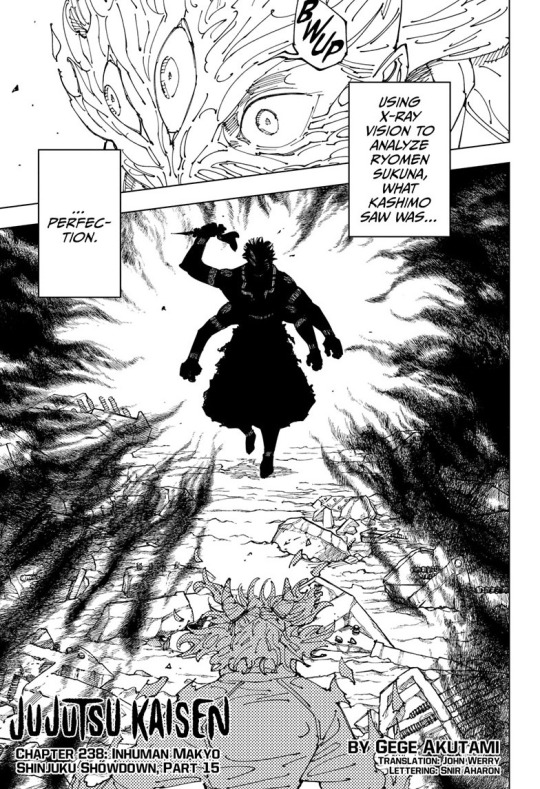
Oh boy oh boy. Another jjk chapter with Sukuna showing off why he is the KING of Curses. Beyond his strength, he speaks like a king to those he defeats, and his meaning is very esoteric.
I'm going to go full fanboy in this post, everyone, so please forgive me if you are here to hear bad things about jjk (you're weird, btw).
Perfection...Beautiful..
Kashimo looking at Sukuna with X-ray and seeing nothing but perfection is exactly what I feel looking at Gege.
But on a serious note.. Finally, seeing Sukuna's true form in action is insane!!! He looks so terrifying, and Kashimo knew that instantly. Sukuna not having any strain on his heart or lungs due to the build of his body is so damn impressive. I love seeing him flexing his perfection to Kashimo and then blitzes him.
I love this moment because it's showing how much Kashimo overestimated his ability to fight Sukuna. I knew Kashimo was a non factor, and Sukuna made it APPARENT. He literally showed Kashimo, he just was not that good, lol. (I was never a Kashimo fan, so this is nice for me).
Sukuna is quite truly beautiful. Gege gave him such a design to reflect him being the peak of jujutsu. I just want to say thank you to gege for following through so thoroughly on this.

Then to go even farther and give us Sukuna's feats against the great sorcerers of the past was even better. He defeated the Sun, Moon, and Stars squad that Uro was once a leader of. I love Gege doing this type of stuff, man!
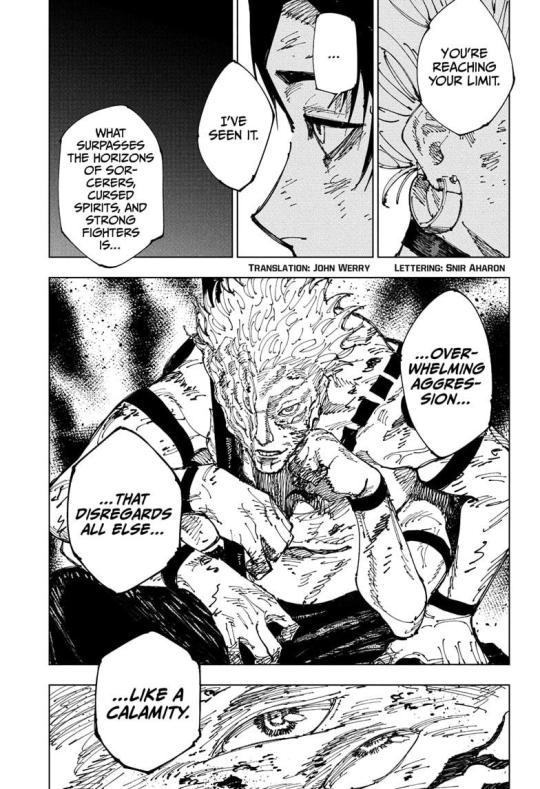
If you remember, Uro's vision of calamity when talking to Yuta was Sukuna, and when Sukuna revived she knew it was him just based off his cursed energy. Gege made sure that all of this was continued by giving us more lore on Sukuna's final form.
It's these little things that really move me in story telling. Connects those dots for us!
We Are Loved Because We Are Strong
Sukuna's speeches to people after defeating them is becoming one of my favorite things in jujutsu kaisen. I already loved his moment with Jogo + his final words to Gojo, but now we can add Kashimo to this list, lol.
I love Sukuna mentioning Yozoru's words to Kashimo, because it directly reflects the short conversation we saw between Kashimo and Kenjaku. Kashimo wanted to go against Sukuna to feel fulfilled. Initially, I took this as a warrior fighting for the fulfillment of a real fight, or a true fight to the death. Kashimo is similar Gojo, where he felt all the surrounding sorcerers were below him, causing him to separate himself as an entity. However, this was dissatisfying for Kashimo. The difference between him/Gojo and Sukuna, is that the king of curses accepted that as a fact of life. Due to this fact, he saw the world as his playground, and anything that went against his desires were to be destroyed.
“You know the answer you seek, you just can't comprehend it, right..?”
I love this quote by sukuna. Implying that kashimo knew all along the answer to his soul's dilemma.
“Is strength solitude”?
That question is always known by the strong, but I think sukuna's lesson was to deeper understand how to live as the strong.
“You were strong”
I see this as sukuna reminding kashimo that because of his strength, love should be known. Those under you will love you because you are strong. He goes on to tell kashimo that the ones who challenged him did not do so to curse him, but to be recognized and to validate themselves. That itself is love, or maybe an easier word to translate it would be “admiration”.
Admiration however is a product of love. That is how sukuna connects with those below him. I believe Uraume is the example of this, as he/she has been by sukuna's side for seemingly the longest. That love Uraume has is most likely the best execution of love sukuna can have for one below him.
(it makes me wonder why uraume is so special)
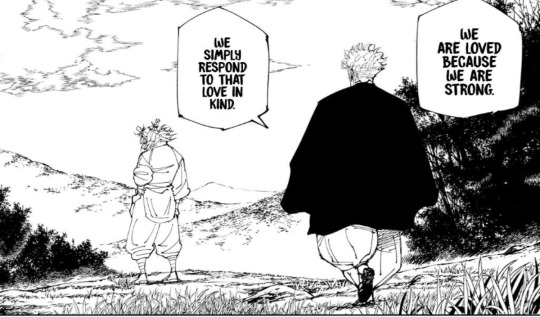
Telling kashimo that he was strong, but also lamenting is greedy. Wow, sukuna... when you think about it, sukuna's outlook is very royal and fits that of a being existing on a higher frequency. What Sukuna is trying to relay, is that being the strongest comes with natural love (or being strong in general). It is when you begin to hate that strength or see it as a burden that you begin to lose sight of that love. Those around you love you for your strength, even those that challenge it have some form of admiration and search for recognition from that strength.
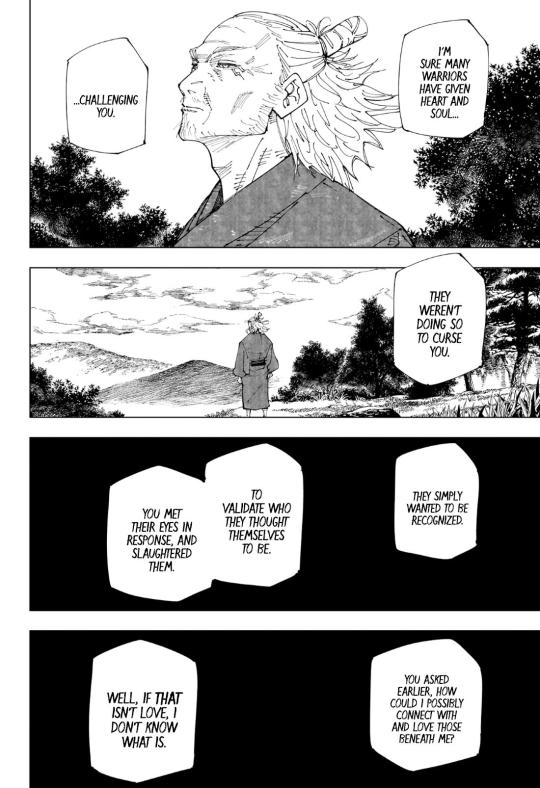
This takes me to when Nanami said to Gojo that he also once believed they should just send him out on every mission. Gojo felt that he could never be understood, and that burden carried with him his entire adult life. Before, he had Geto who he saw as his equal, best friend and dare I say other half. That is why he wished that Geto was there, patting him on his back. Gojo felt separated from everyone, even if he loved them, he still felt isolated. I believe that Geto was Gojo's “love” and that is why he could never truly feel satisfaction.. He could never save Geto.
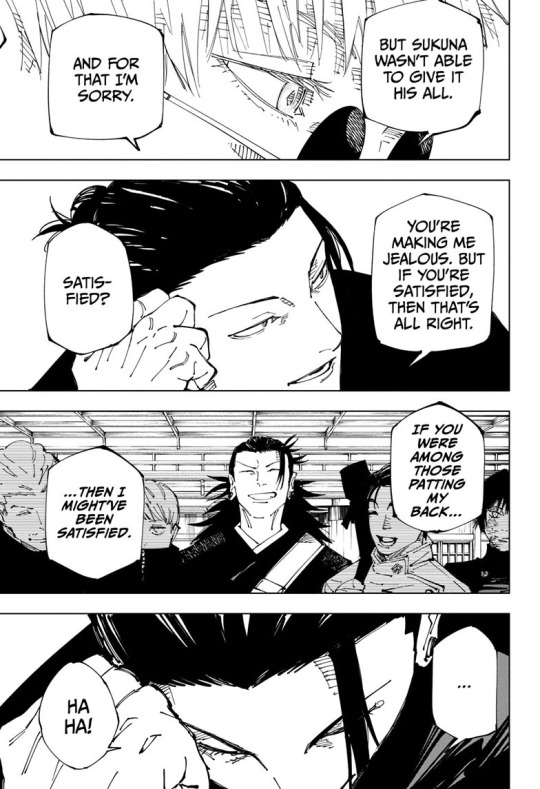
(Sorry to go back to the sadness that is Gojo's separation from others as a human due to his exceptional skills as a sorcerer, but all of this ties in together so well).
Kashimo and Gojo both got “greedy”. They were strong, but also wanted to hate that strength instead of taking everything that came with it and finding true satisfaction within. Gojo felt pure isolation from his talent, while Kashimo felt lament because he could never have an equal. Both of these stemming from feeling the need for others to fulfill them, which is why Sukuna believes that...
Love is Useless...
Sukuna calls love useless. I find this so intriguing, because the “love” he spoke of was surrounded by the motif of “the strong”, and also he straight up says the thought of needing someone else to fulfill him never crossed his mind. He never thought that another person would give him the satisfaction he wanted, instead he put his desires first.
“I live according to my own stature. If that can't be measured or understood, that's not my problem”.

MEGUMI? YOU HEAR THAT?!
My god i hope megumi is listening. I talk with @theanimepsychologist about megumi coming back and also how sukuna is possibly his golden shadow. To expound on this train of thought, I see all of this as Gege playing deeper into Sukuna's role as megumi's catalyst.
In simpler terms, I see Sukuna & Megumi's dynamic on the same level as Mahito & Yuji's. Mahito propelled Yuji's understanding of being a jujutsu sorcerer, while Yuji propelled Mahito as a curse. For Sukuna and Megumi, Sukuna saw Megumi's technique as something to gain. There could possibly be more he plans on doing with the ten shadows specifically, giving him an even more powerful arsenal than he had before.
For Megumi, Sukuna was the first to make him see himself as a stronger person. The words “why did you run away” stuck in megumi's mind from the first fearsome womb chapters. That was when he discovered he could place things in his shadow, and from there he began to elevate each arc.
Sukuna being in Megumi's body right now feels like a terrible journey of enlightenment for megumi. I find it interesting that sukuna states he was born cursed and unwanted. Megumi talks as if he was treated the same way, even believing his father is still alive living it up somewhere. Megumi has no idea he faced his father in shibuya, or that his dad wanted him to be something outside the zenin clan. Even if he did end up there, he believed megumi would be okay because he was talented. Megumi never saw himself as wanted by his family, and his cope for that was Tsumiki.
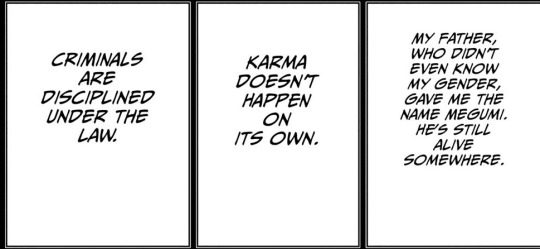
Sukuna was different, he chased after his desires alone. He believed he could make himself happy, and that there was no one else who could fulfill that. Megumi losing Tsumiki is so difficult for him because he relied on Tsumiki as his heart and conscious. At first, megumi was indifferent, but expressed himself boldly. Tsumiki's positive outlook is what moved megumi, and that was all the family he had. Megumi isn't heartless as sukuna may naturally be, but his decision to save people has left him too selfless.
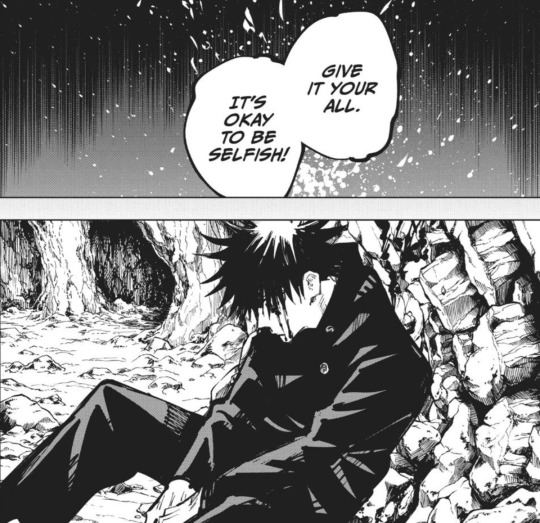
For megumi to return, I need to see his understanding of self-worth change. He needs to see his strength and importance as an individual to truly understand the love that comes from being strong. In order to save people, you need strength, but you cannot develop that strength without having a stronger sense of self to dismantle any sparks that fly your way.
"Its okay to be selfish"
"A jujutsu sorcerer's growth never comes easy"
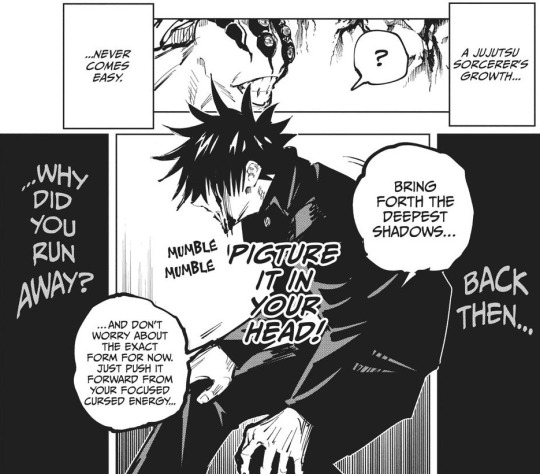
(I could continue on about this megumi and sukuna connection but i think my point is made)
That is why Sukuna said love is useless. There is no need to look to another to satisfy yourself. To understand yourself is to understand your desires. And to be true to one's self is to chase after those desires without remorse. He hasn't changed a beat from when he spoke to Jogo, and I love consistency.
What Can You Do...Brat?
The final spread of the chapter was C R A Z Y! Uraume and Hakari break out of the domain with no damage on either person, while Higaruma and Yuij (with scales and claws??) begin to drop.
WTH?
My assumption is that they are going to try to get Sukuna into Higaruma's domain to win a trial and take away Sukuna's CT. This could work, but I'm worried that even without a CT, sukuna is still going to be very proficient in his raw CE usage unlike the other sorcerers Higaruma has faced. Maybe that is all they need to start the process to save megumi, or something else entirely crazy that only gege can come up with!
Truly endless possibilities.
Gege is continuing to Gege (whatever that means) and I will continue to not miss a beat. I believe we have a break coming up, so we will have to digest on this chapter a bit before we figure out what's going on!
#jjk 238#jujutsu kaisen chapter 238#jjk meta#jujutsu kaisen meta#jujutsu kaisen manga#jjk 238 meta#gege akutami#weekly shonen jump#dh🍵#jujutsu kaisen#manga#manga meta
82 notes
·
View notes
Text
volume 0 of jjk is more important then you think
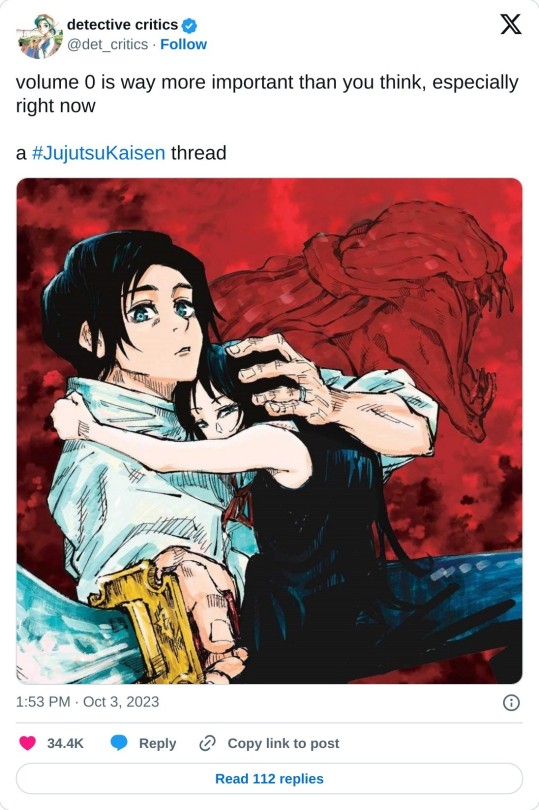
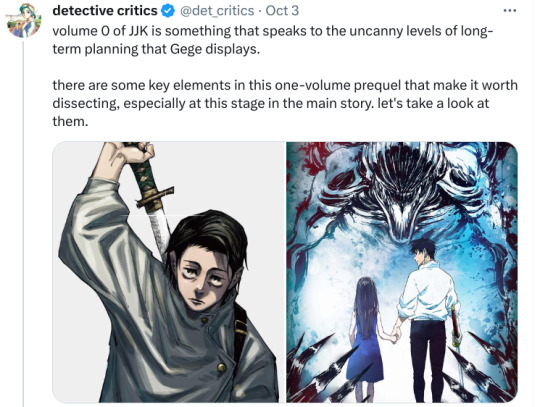
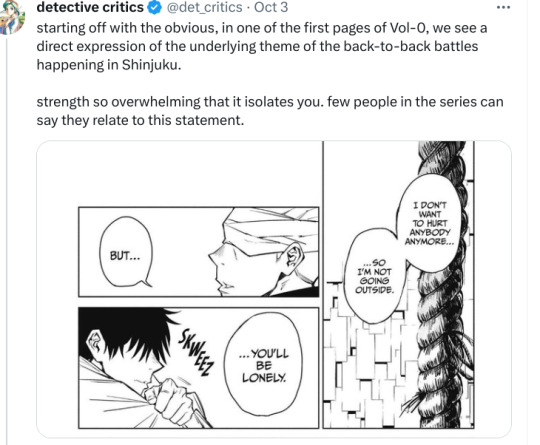

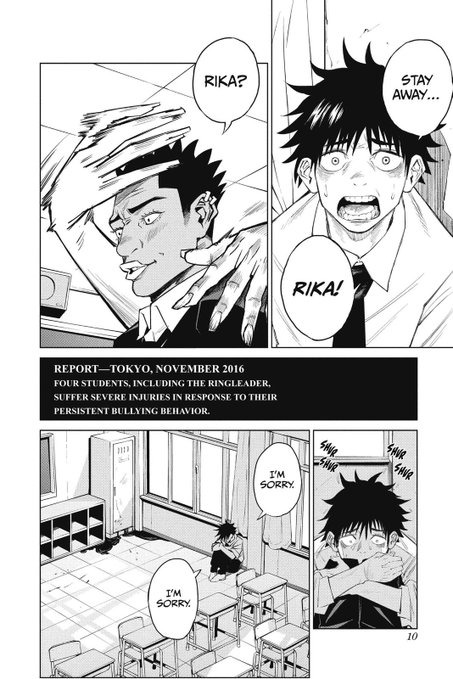
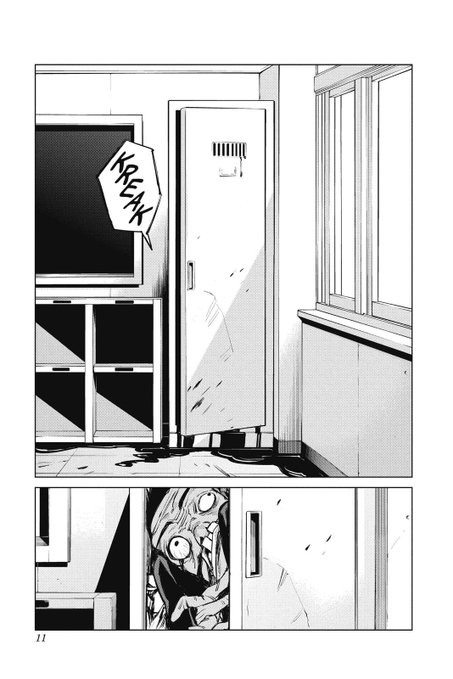
because the idea that a burdensome level of strength is nothing but a curse, is literalised with Yuta. Rika is literally a curse that's formed out of love. this same plight is not as apparent with Gojo Satoru and Kashimo Hajime. with these two, their mannerisms say far more.
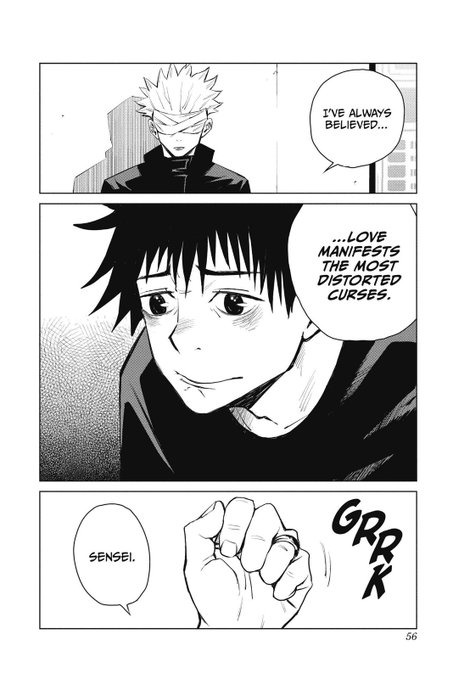
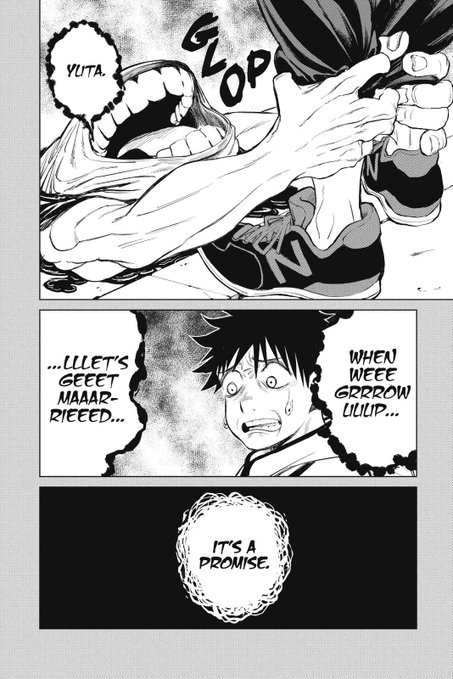
what's noteworthy is that the resolution of Gojo's own crisis is 100% opposite of how Yuta's was resolved, and it looks to be the same for Kashimo as well. Yuta forgoes his overwhelming strength by dispelling the curse on Orimoto Rika, and prioritizes his bonds with his people.
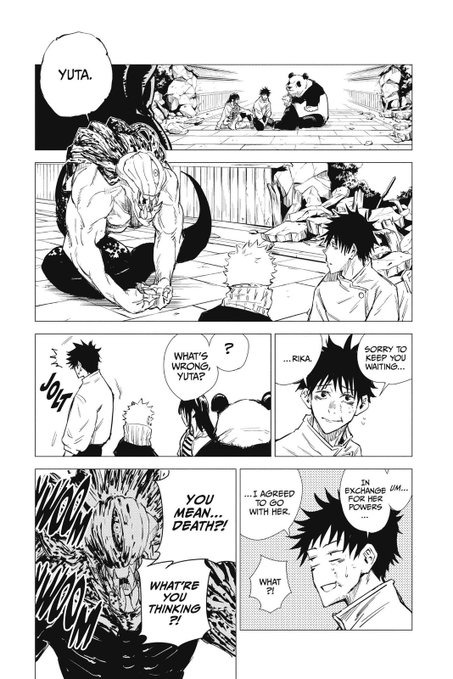
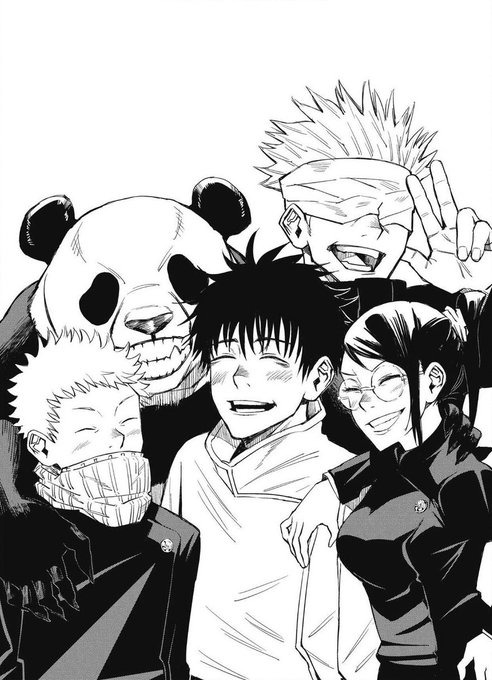
after all, that's the central theme of volume 0. as such, the most interesting thing about the shift between the prequel and the main series is just how COMPLETELY the main series contradicts the themes of the prequel.
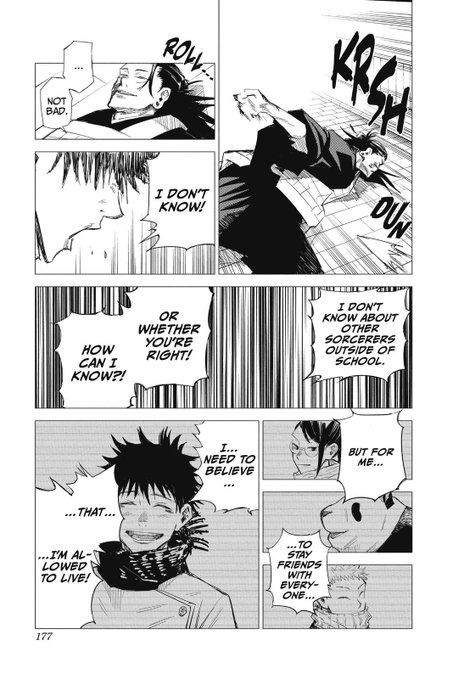
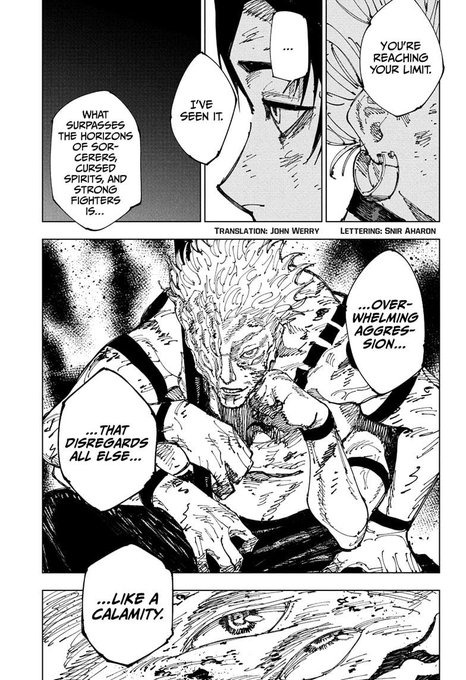
the main series, so far, has severely punished anyone that prioritizes their bonds over a robust sense of self + selfish pursuit of power. the special grades are the best example of this. Tsukumo Yuki worked with Tengen and Choso; she didn't fight with her own domain.
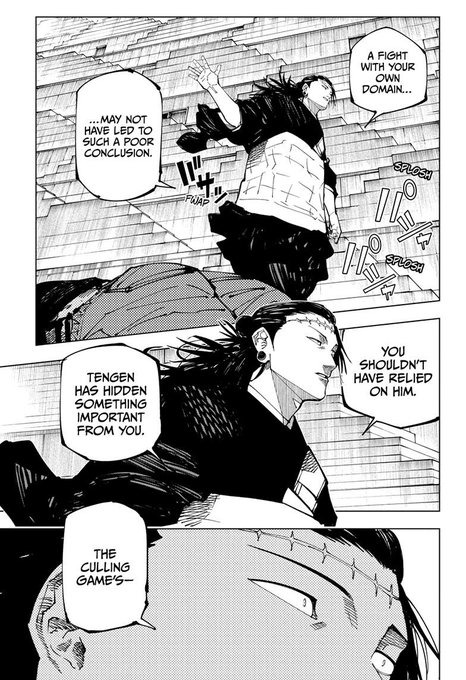
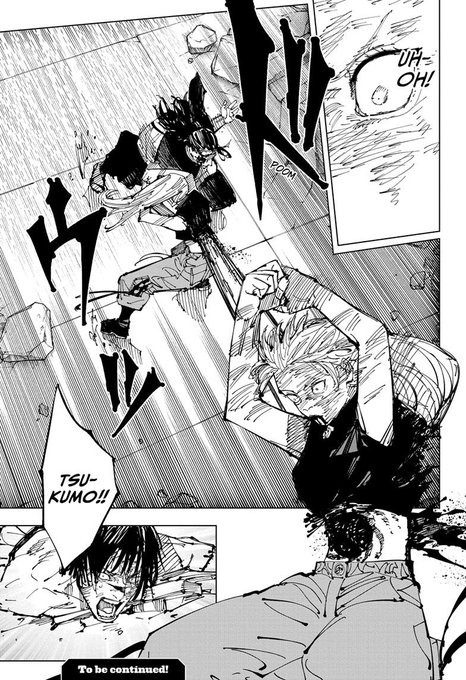
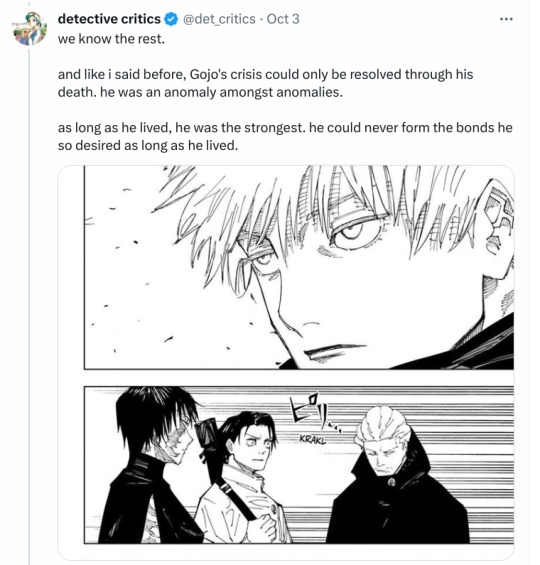
only in death could he stand on an equal footing with his comrades. the framing of these demises in the main series is so deliberately opposed to how the thematic framework of JJK 0 functions. and the reason is none other than the King of Curses, Ryomen Sukuna.
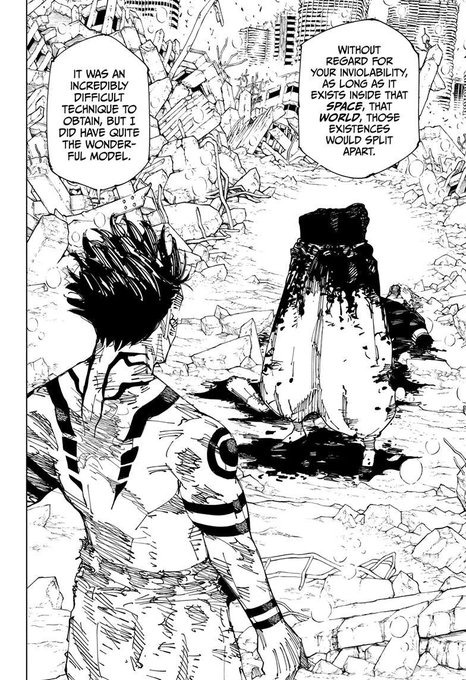
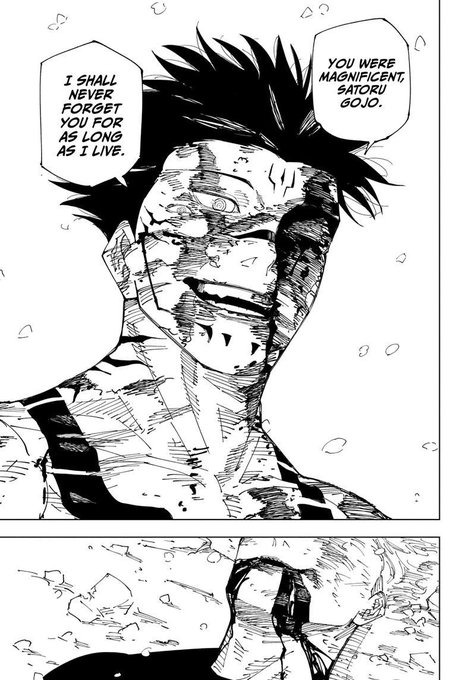

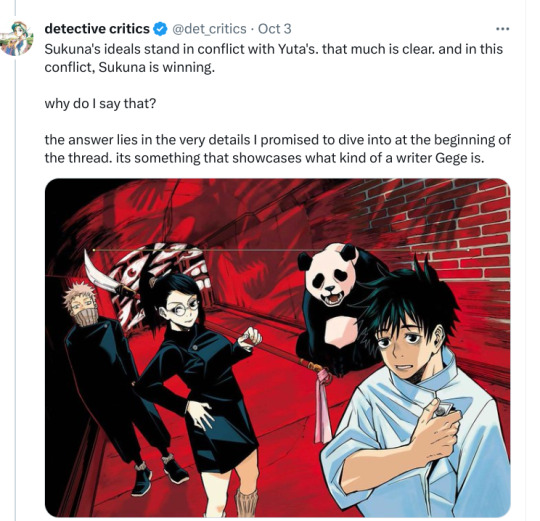
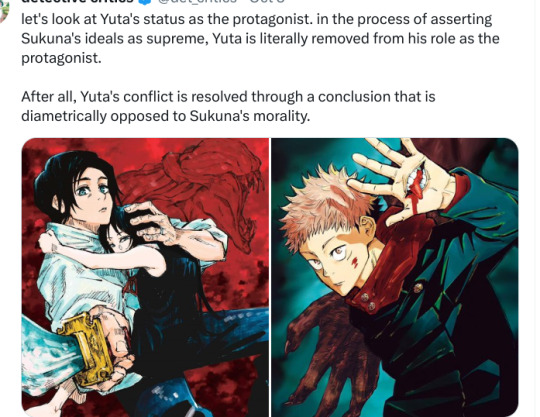
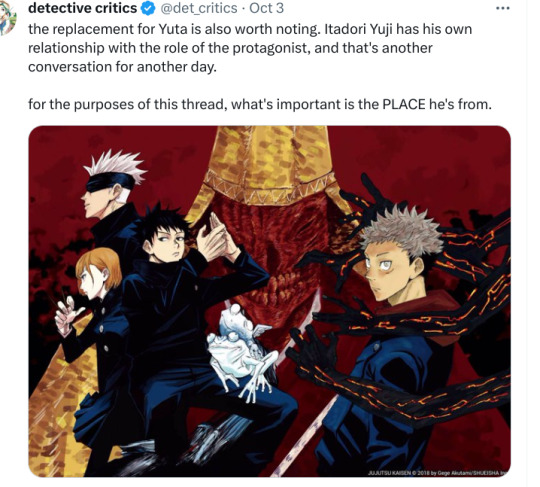
Sendai, the City of Trees. established in the year 1600 by the daimyō Date Masamune. Date Masamune was a descendant of the Fujiwara. any JJK reader knows the significance of the Fujiwara clan in the series
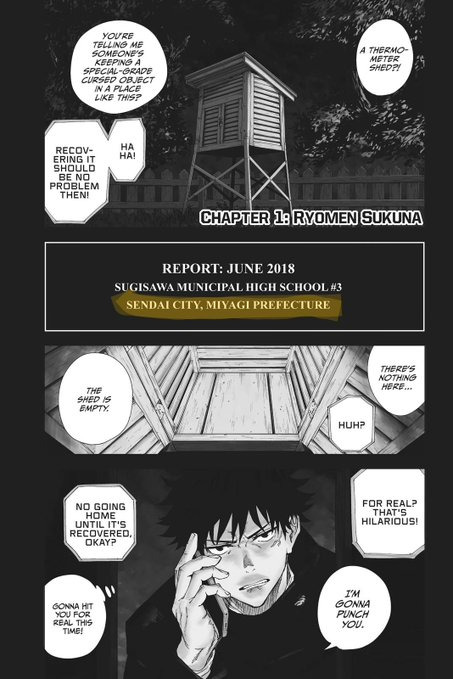
the emphasis JJK gives to the Fujiwara cannot be understated. lemme run through some key examples rq. the turning point of the series, the Shibuya incident, happens in the vicinity of the Meiji Jinguu, a shrine dedicated to Empress Shōken, a deified member of the Fujiwara clan.
the revival of the Heian era, which saw the supremacy of the Fujiwara clan in the political scene, also plays a part in this. Onmyōdō, or sorcery, was at its peak in the Heian era. Ashiya Dōman, one of the most prominent sorcerers in history, was a hiree of the Fujiwara.
and this specific fact is called back to in the New Shadow Style: Simple Domain, developed by Ashiya Sadatsuna, being utilised widely in the series. the relevance of all this to the topic at hand is that Yuta is a descendant of the Sugawara clan.

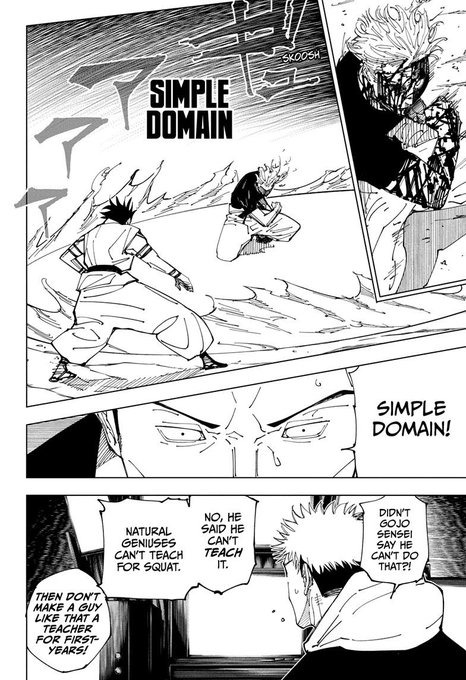
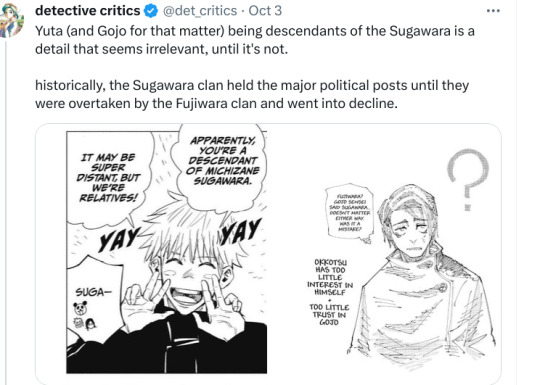
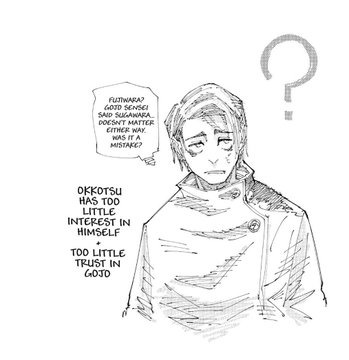
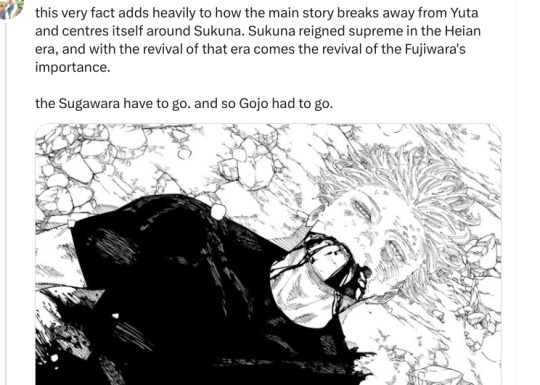
symbolically, literally and meta-textually, Yuta is removed from a position of importance, and a guy from a Fujiwara-established city replaces him.
all of this is why some wouldn't feel confident about Yuta continuing to be in good health for the rest of the series 💀🚩
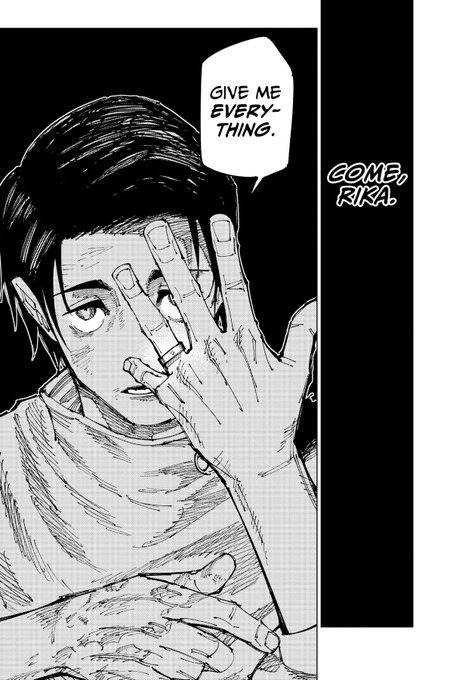
all the special grades in the series have been murked, except Yuta. you can clearly see why people would think he's next. BUT NOT ME! and here's why: in the Sendai colony, i.e. in the same city established by the Fujiwara, he beats Uro Takako, a hiree of the Fujiwara.
he cyclicality that JJK is obsessed with plays out on various levels, but Yuta is the only exception. and I mean the ONLY exception. not even Gojo was exempt. Yuta, a Sugawara, beats someone that was associated with the Fujiwara. it plays out the opposite of how it's meant to.
in conclusion, i think we should put our stocks in Yuta. someone that won't be the next Gojo Satoru sounds about desirable rn. Vol-0 is a treasure trove of hints when we reread with new context. i hope i gave you new insight, or at least a fun read.
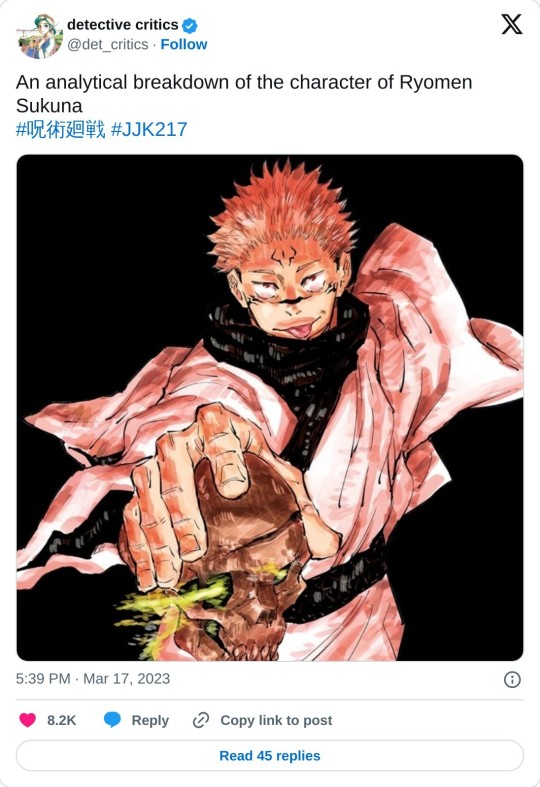
"
I can’t wait for Yuta vs Sukuna, the themes of strength, loneliness, love and modernity vs history finna clash like crazy
The Queen of Curses vs The King of Curses 😤😤😤
Furthermore Yuta as the previous MC whose succeeded despite contradictory themes with Sukuna…
"
63 notes
·
View notes